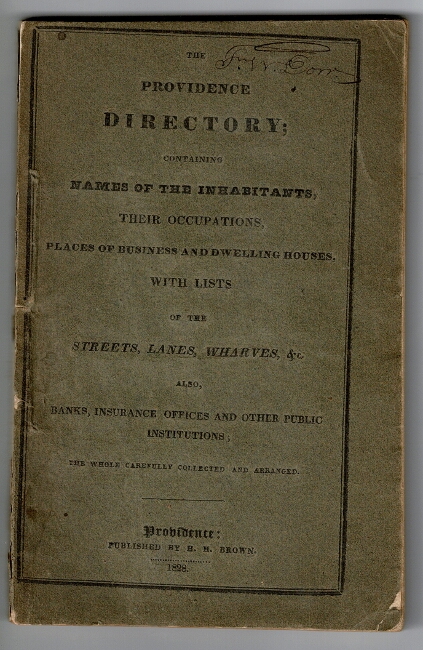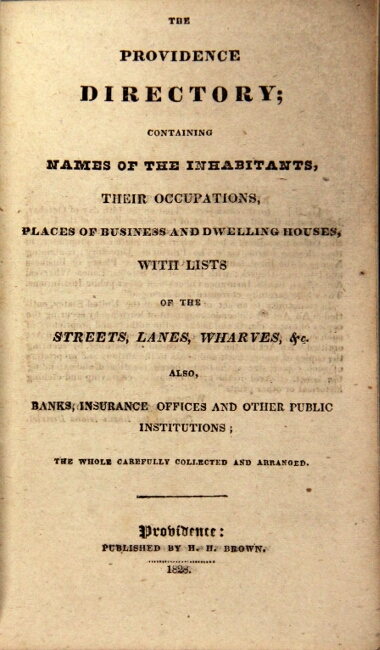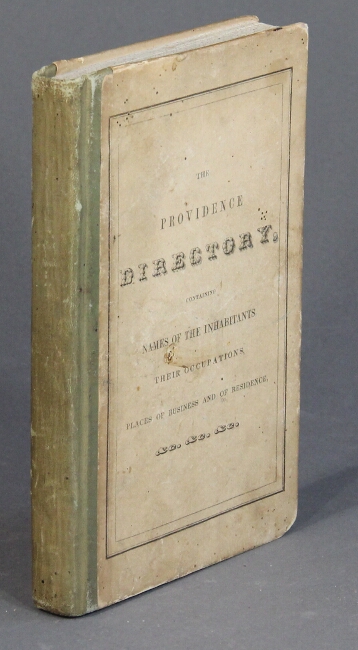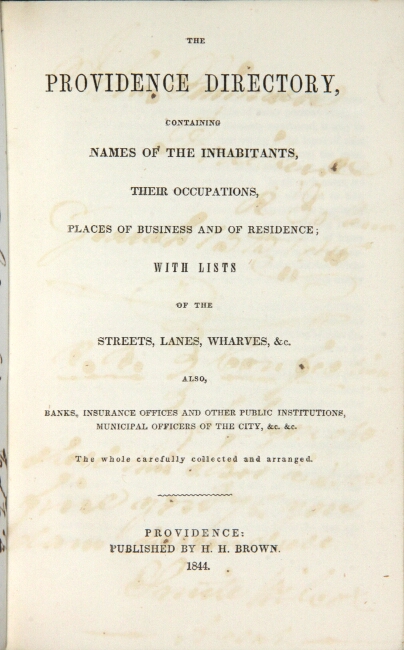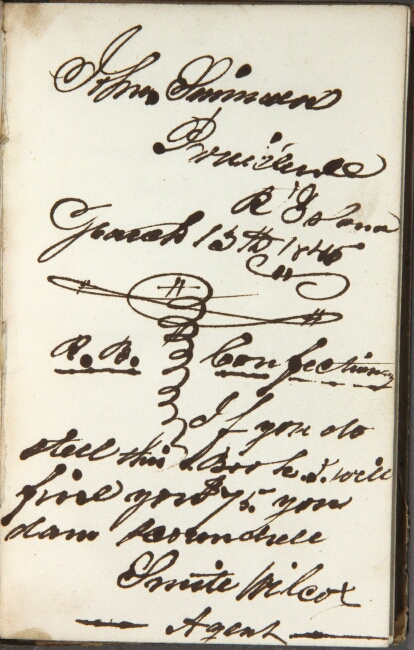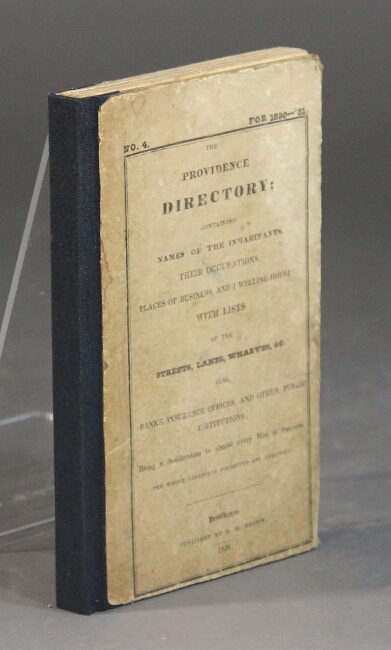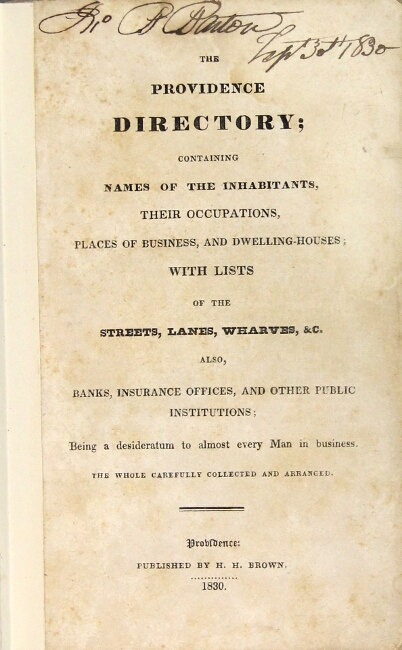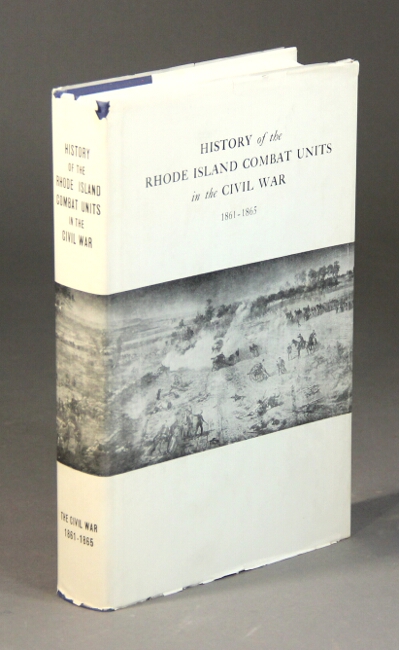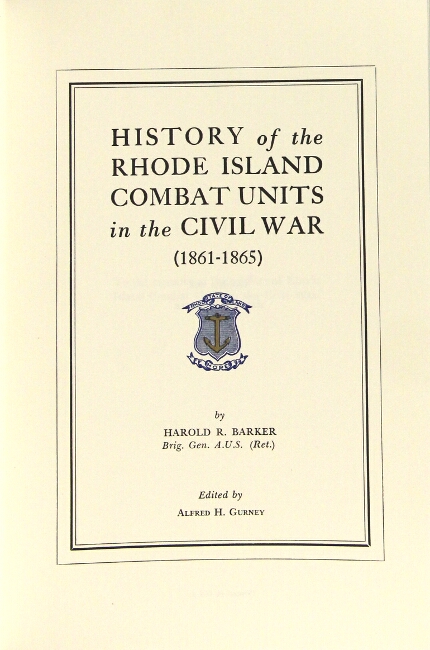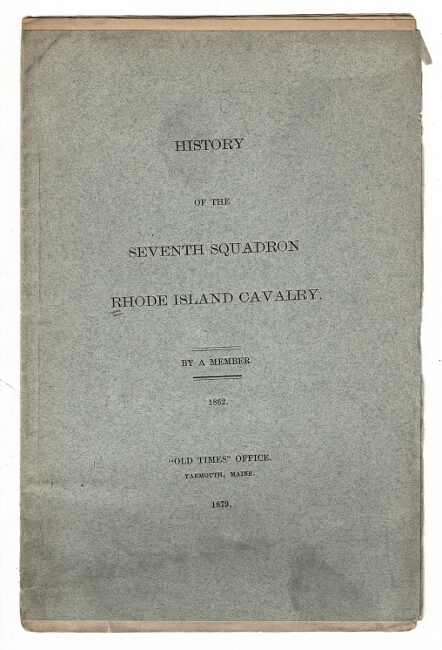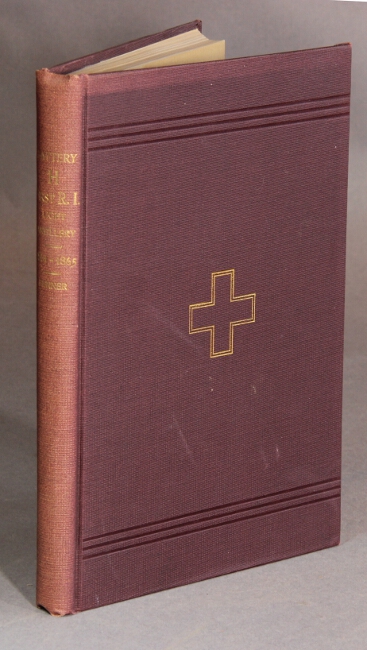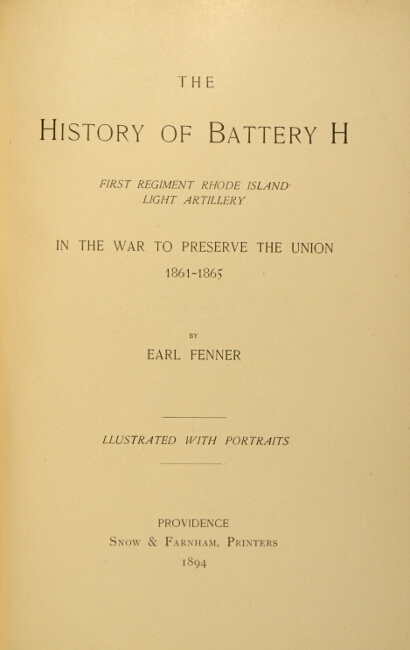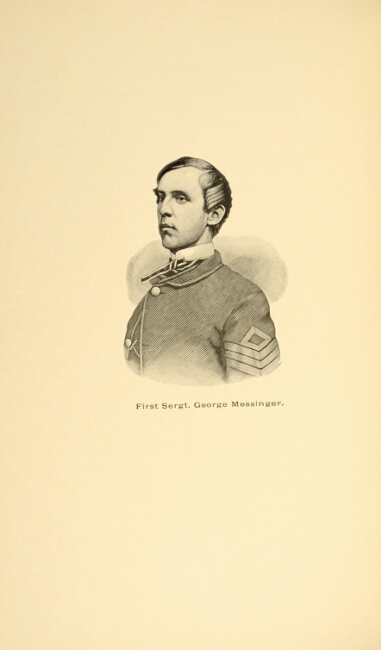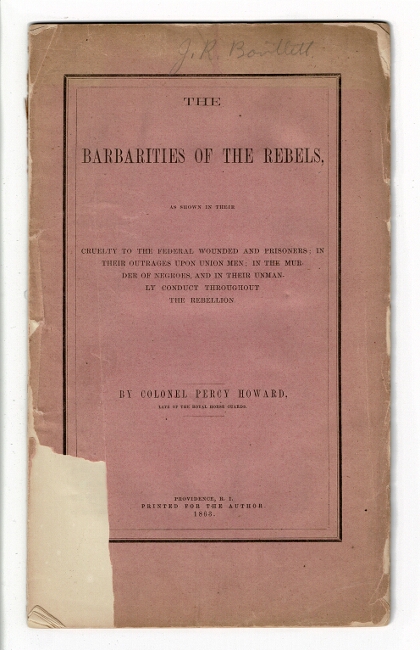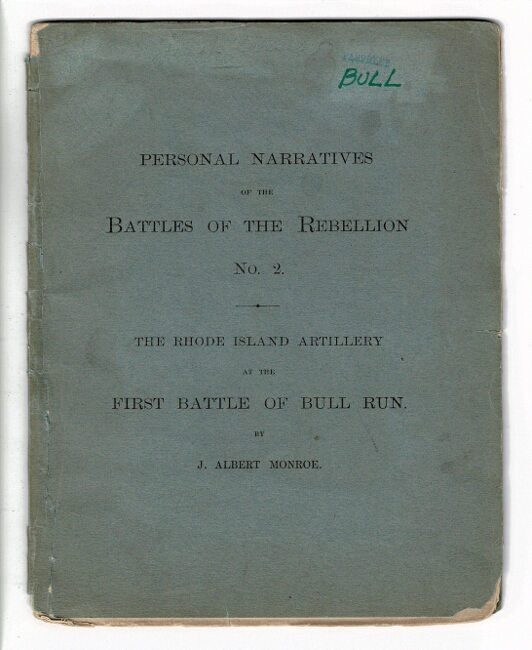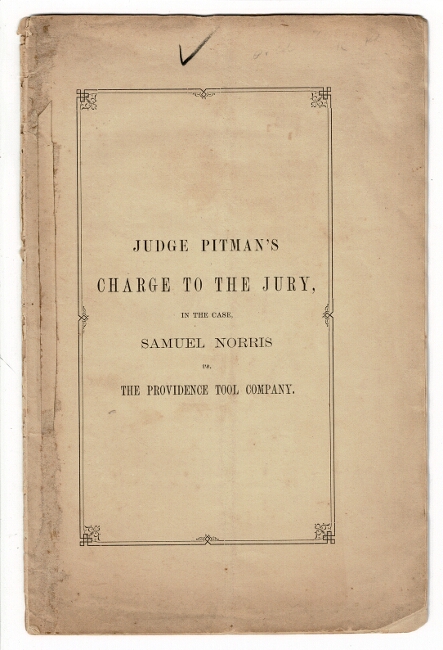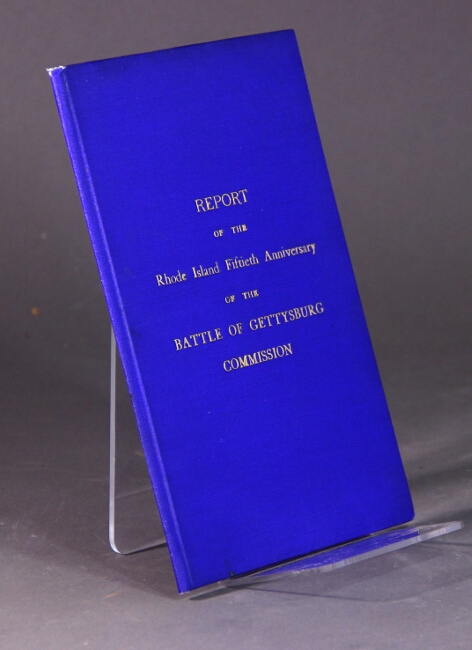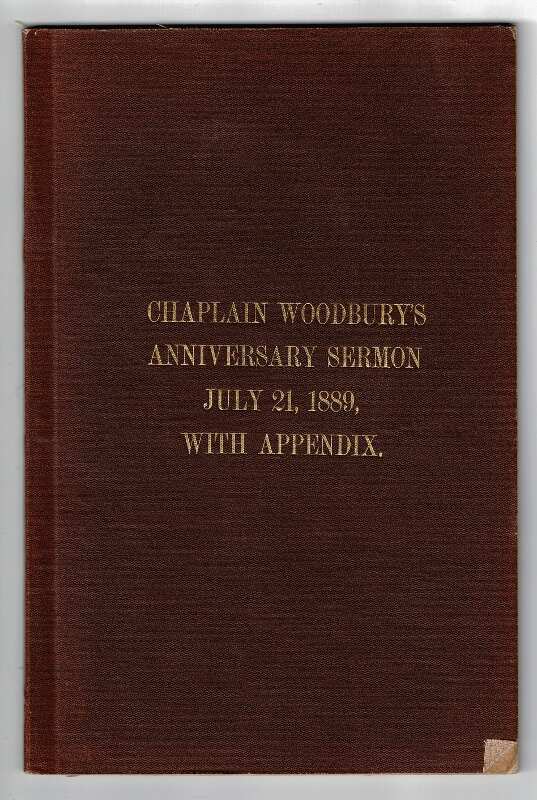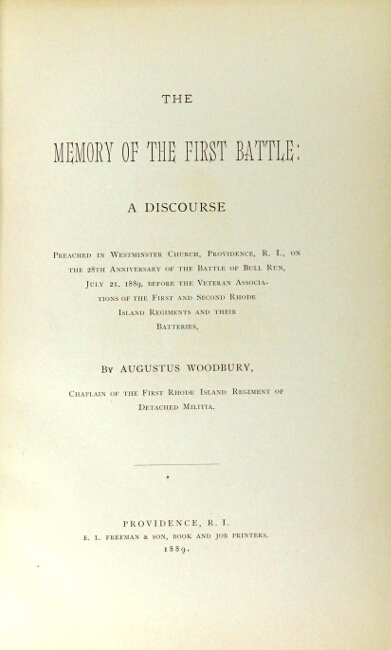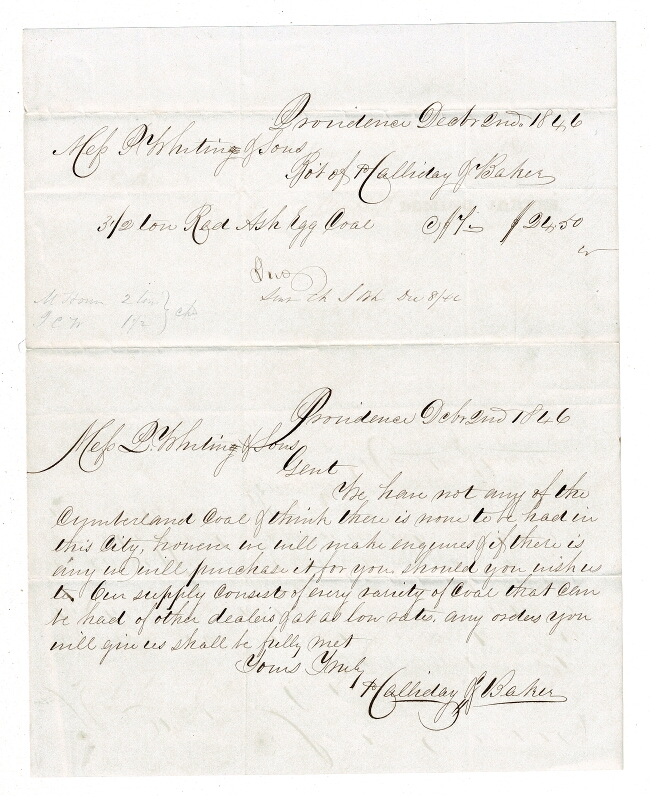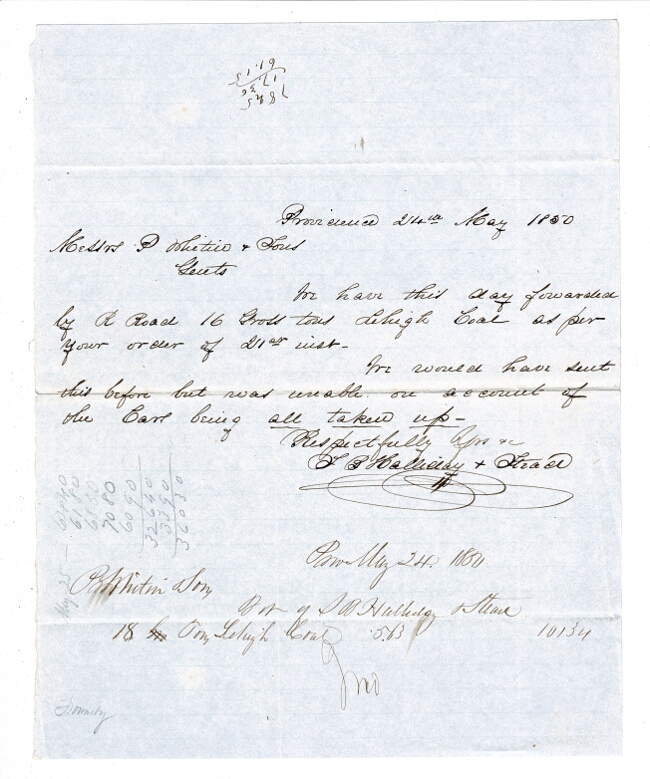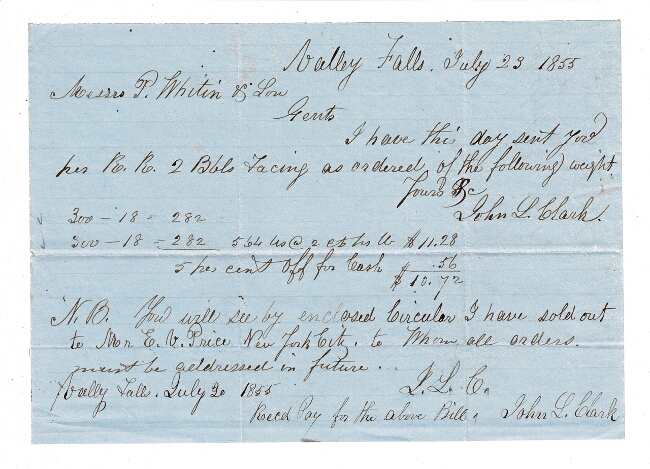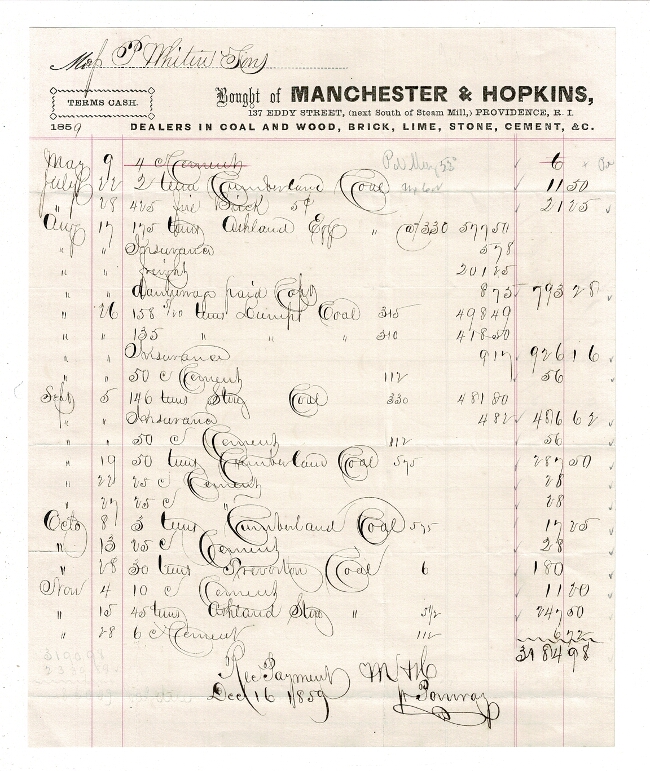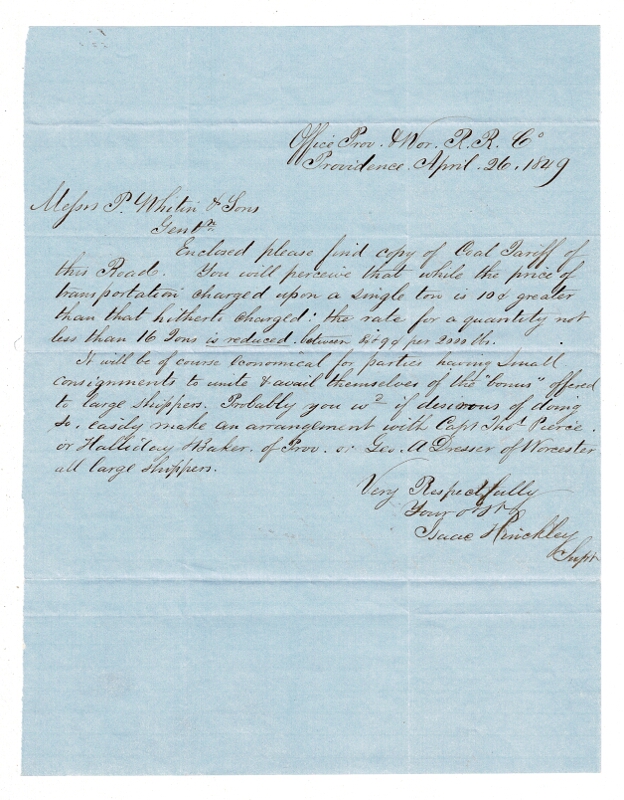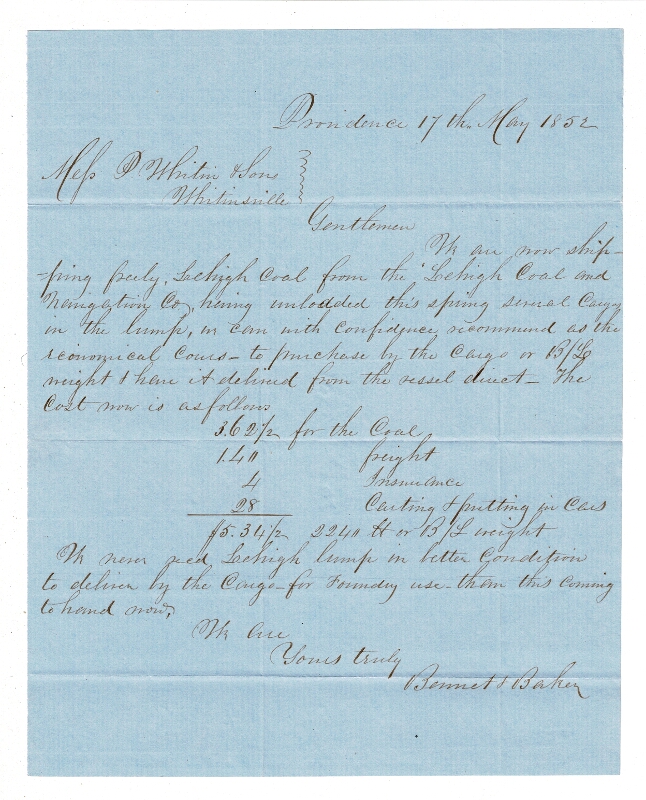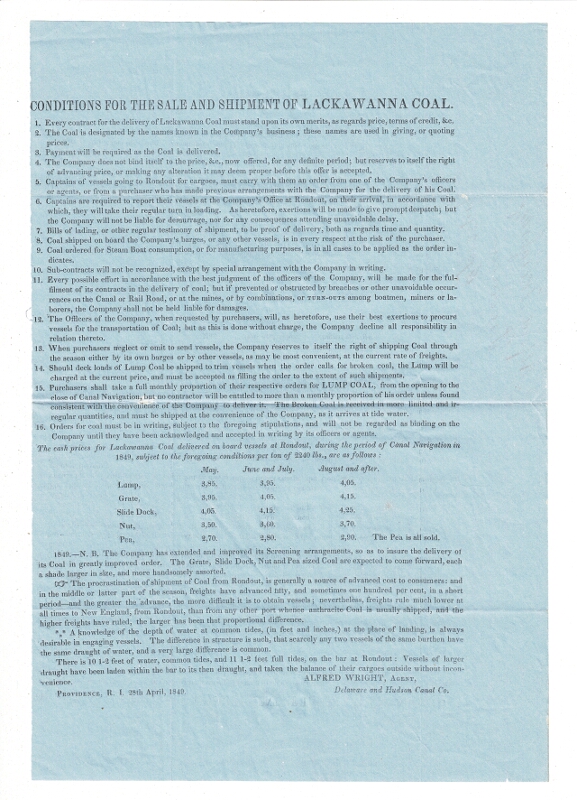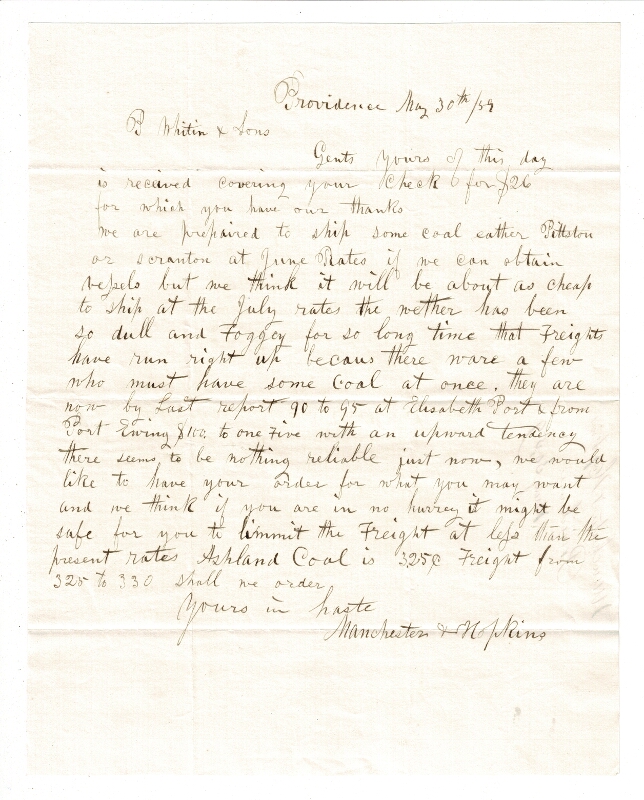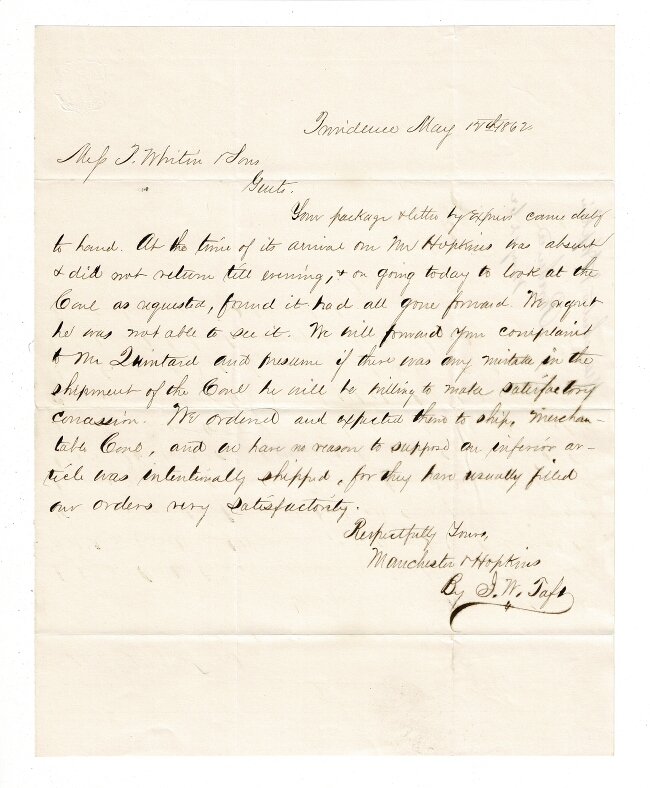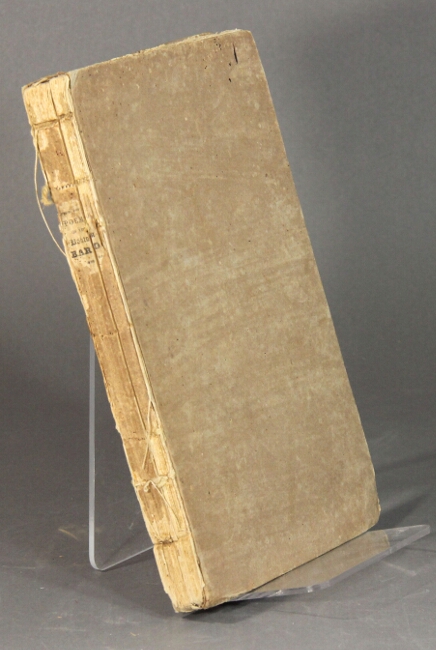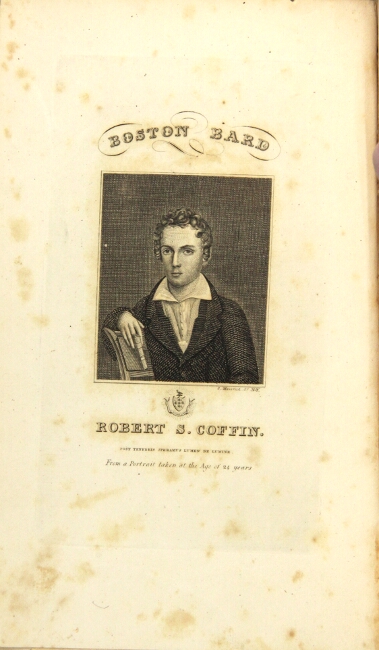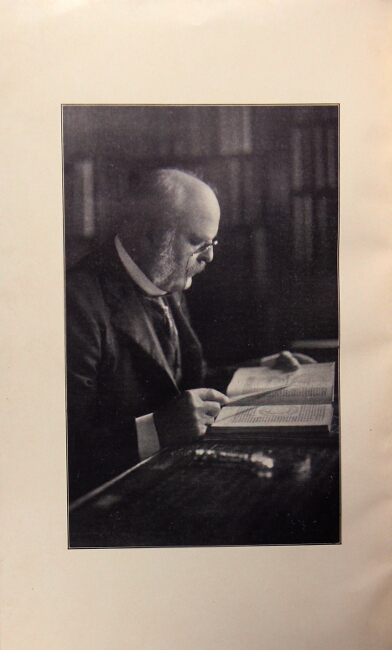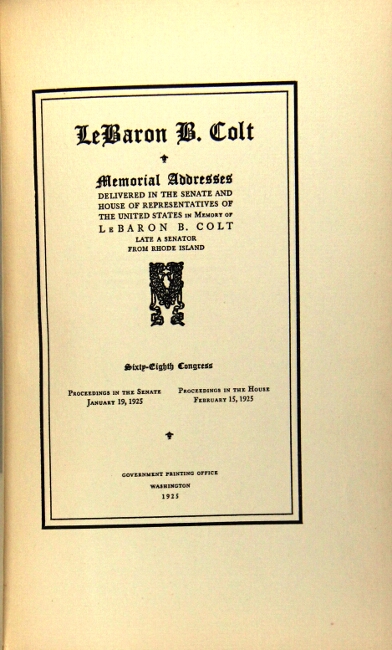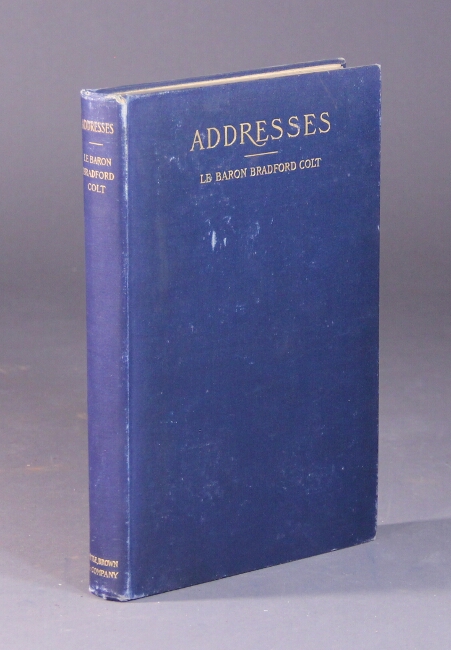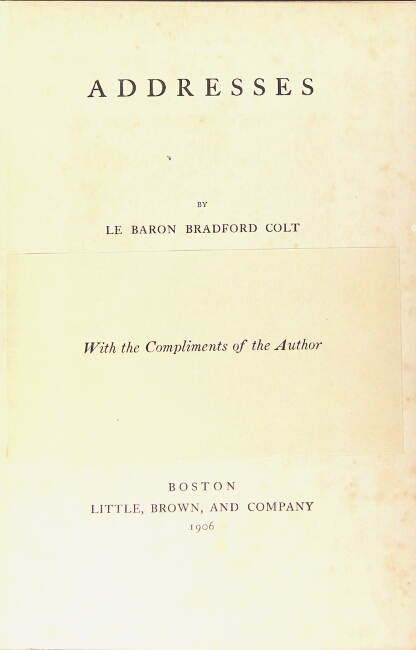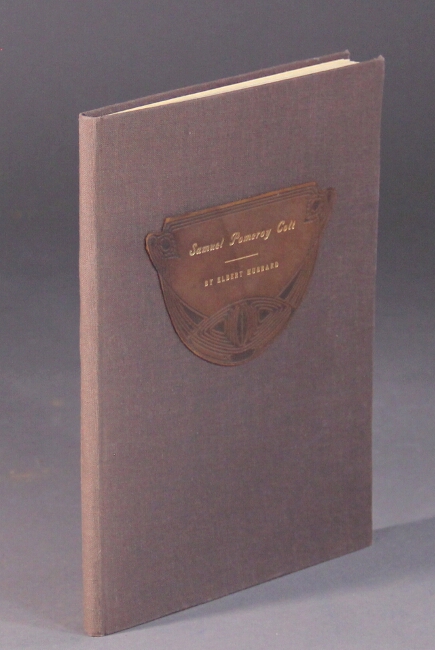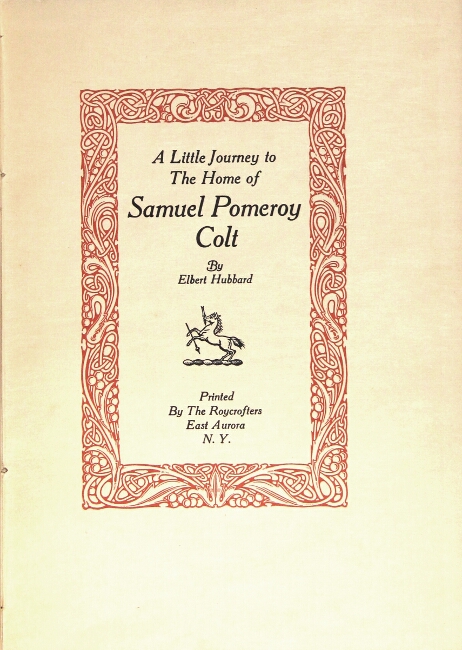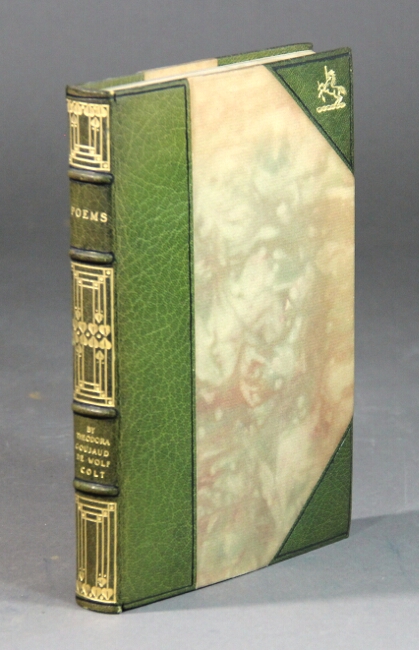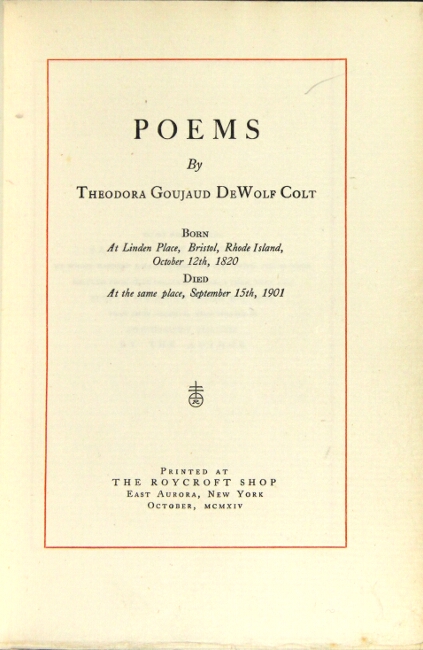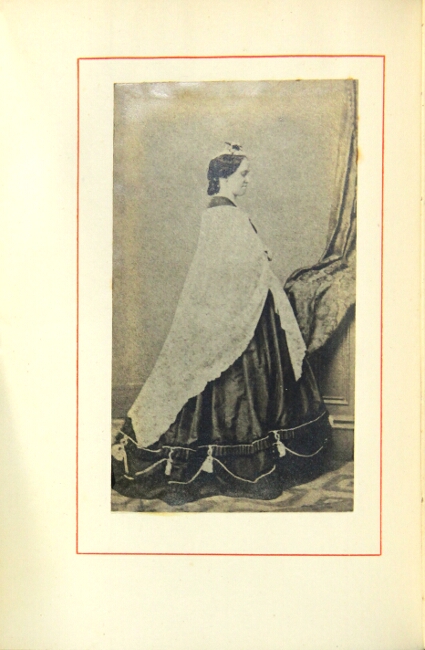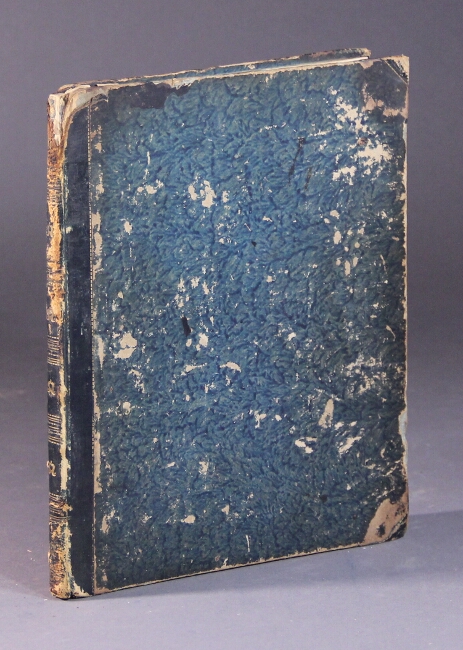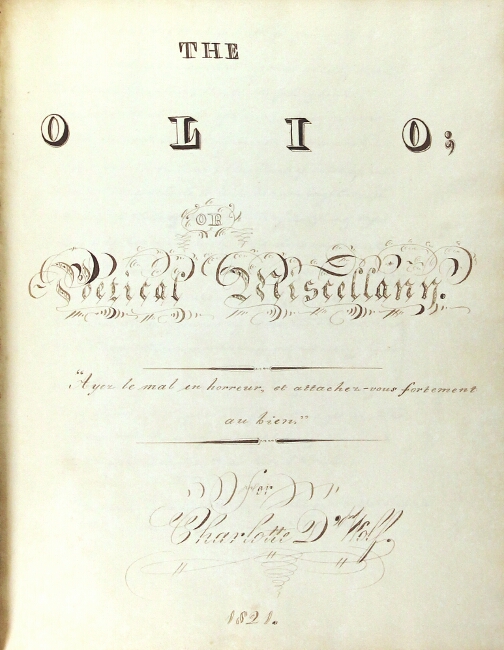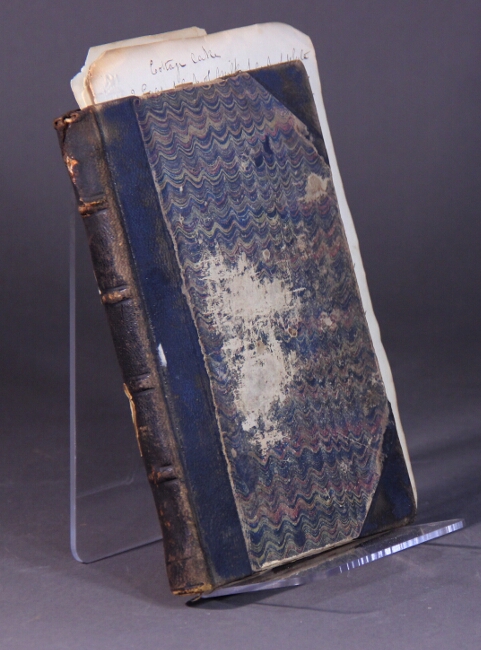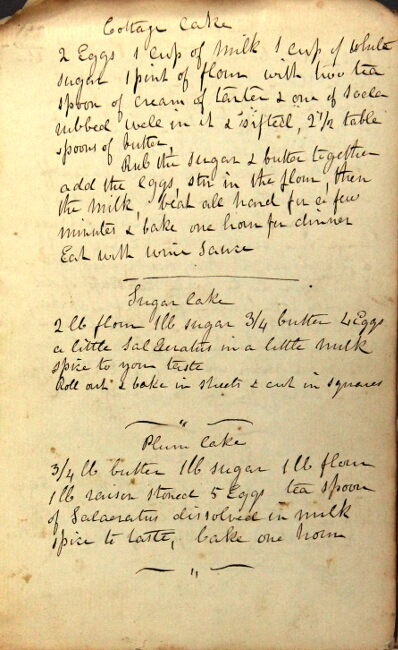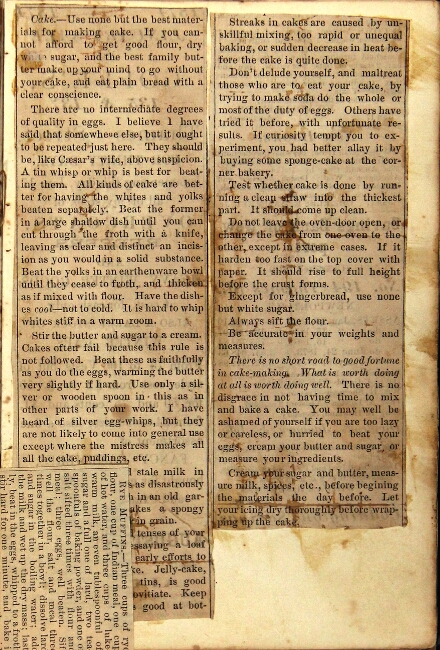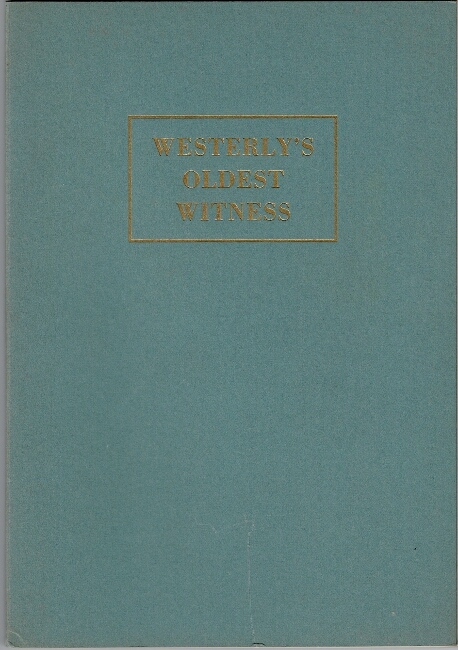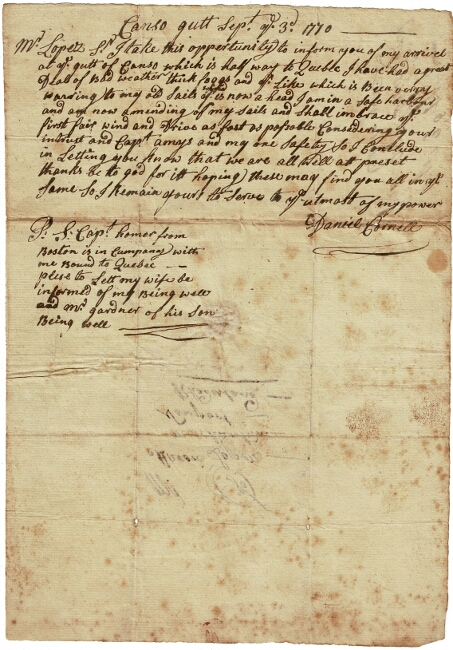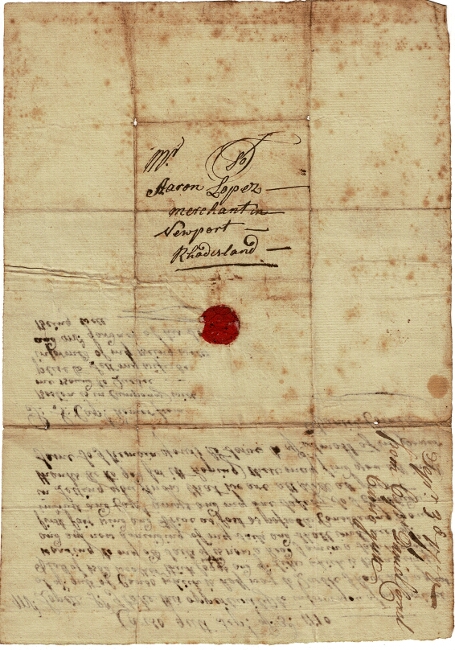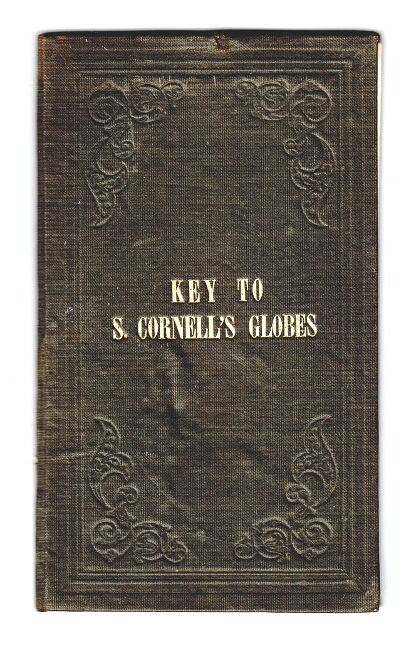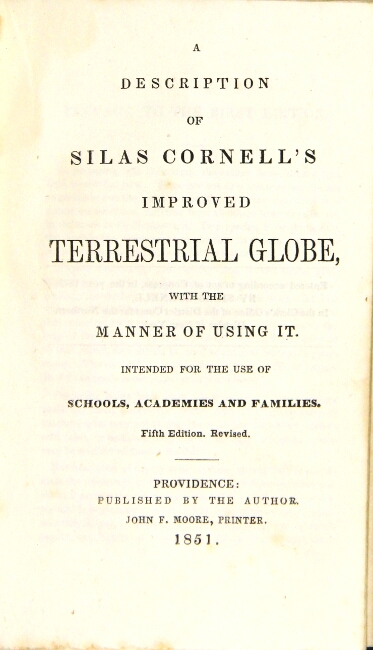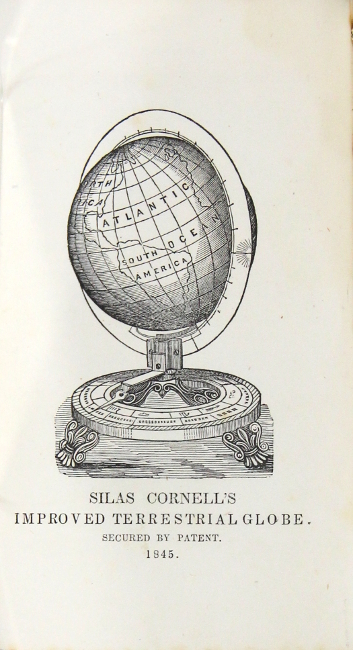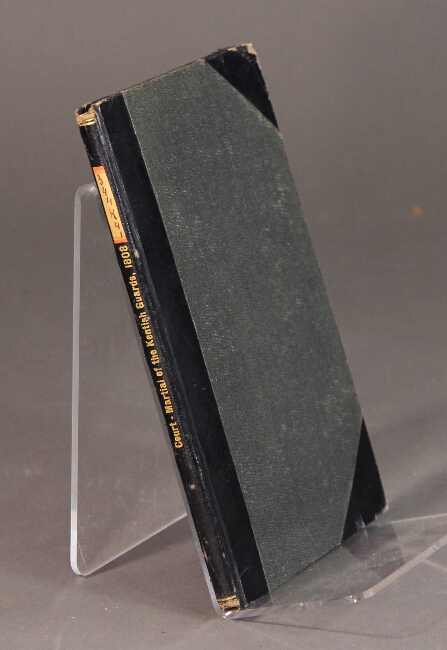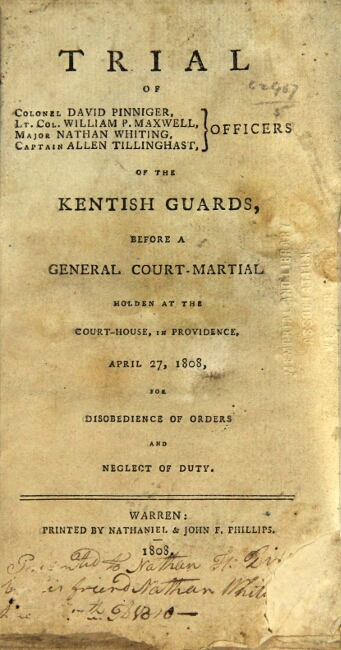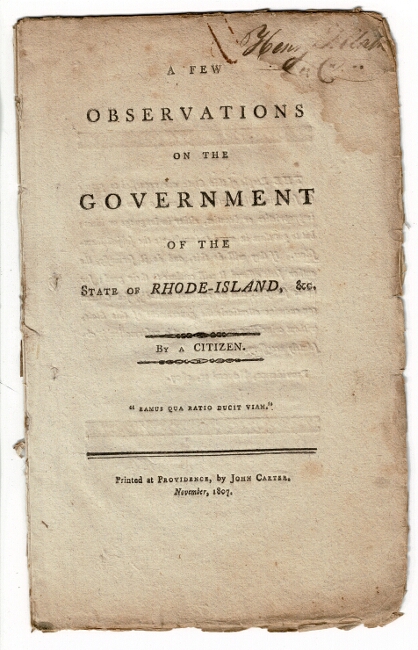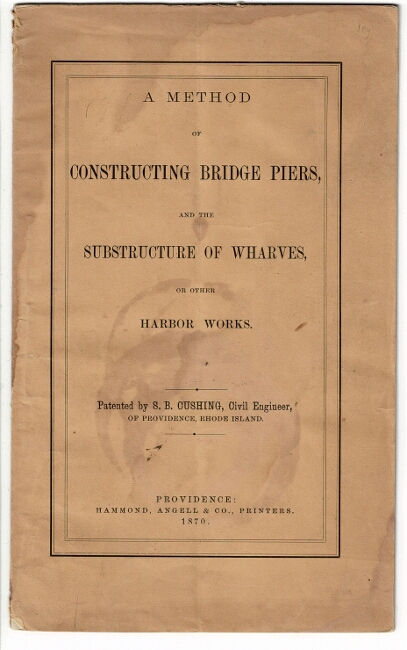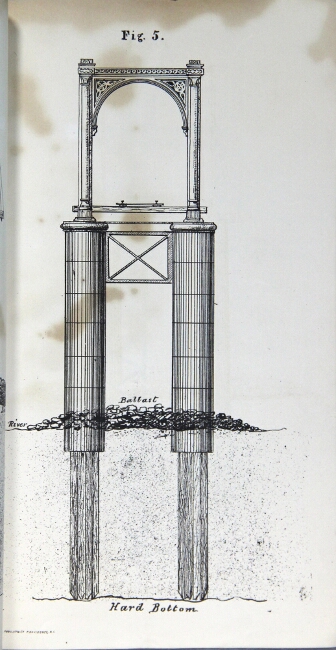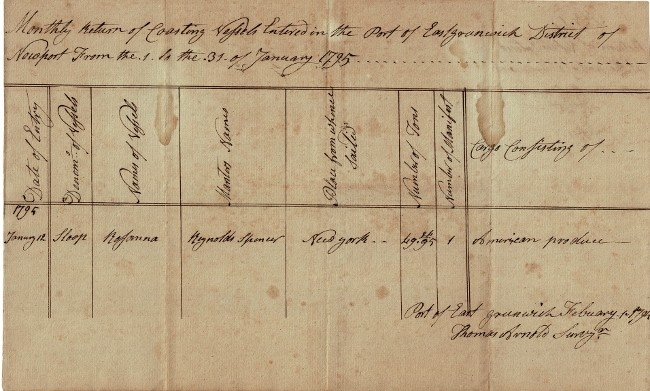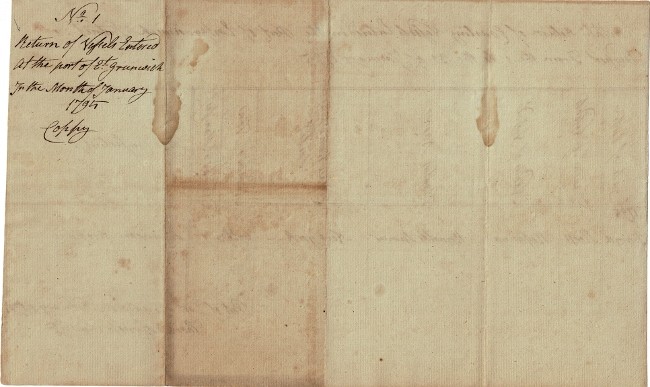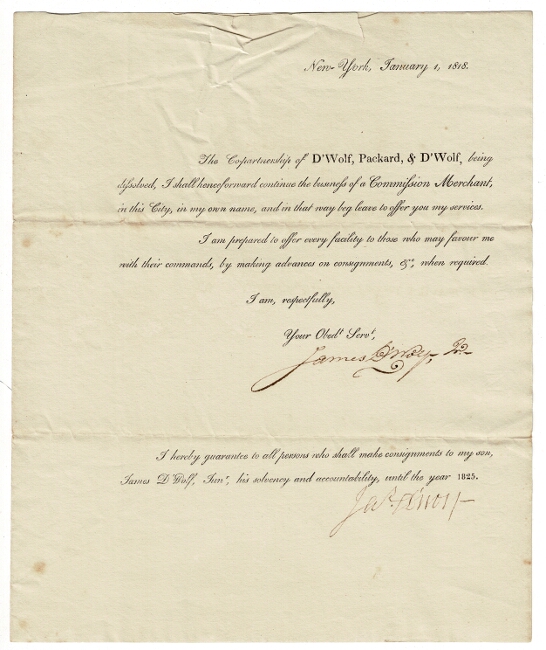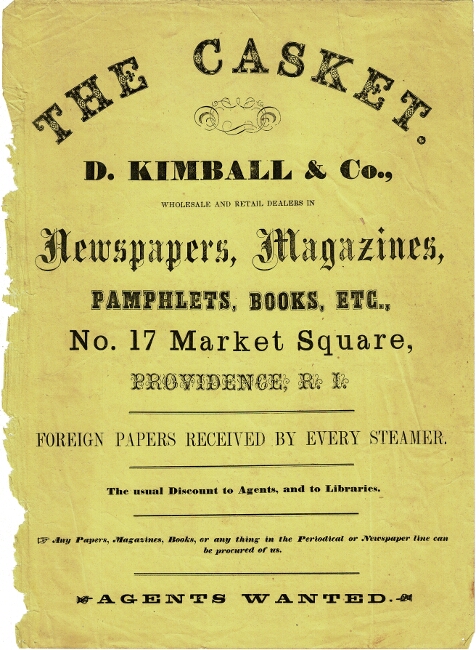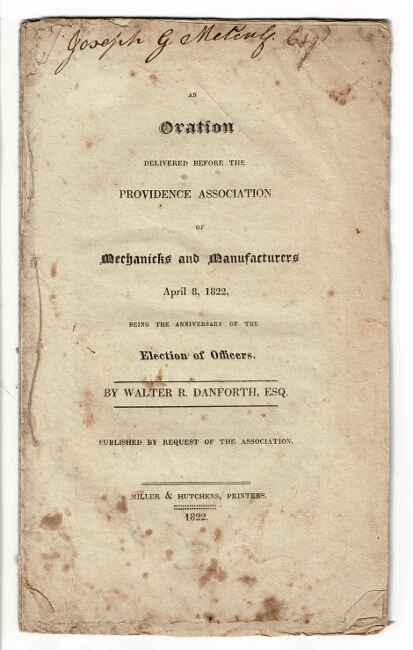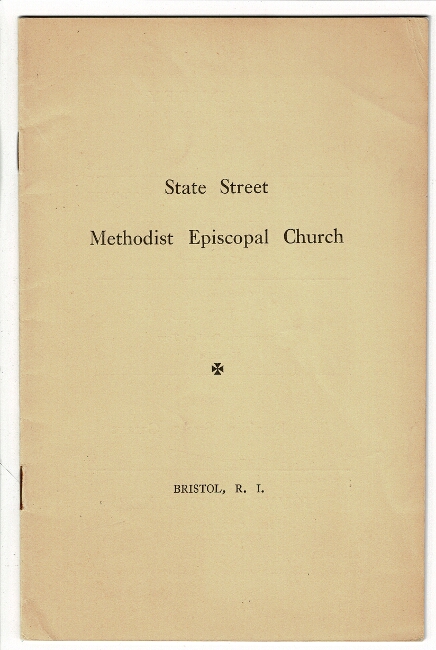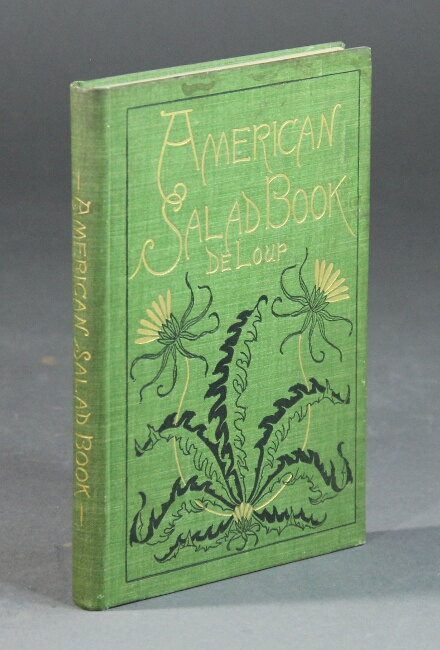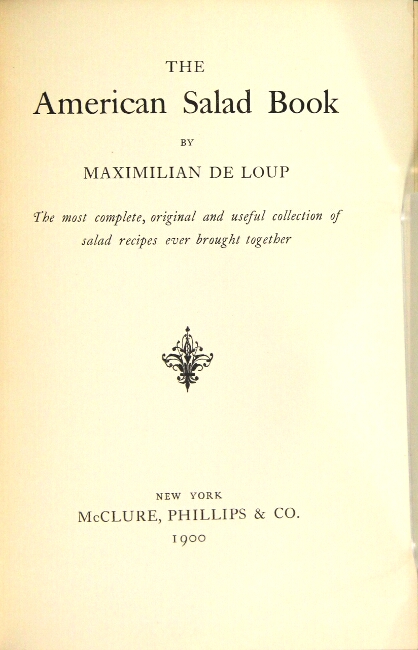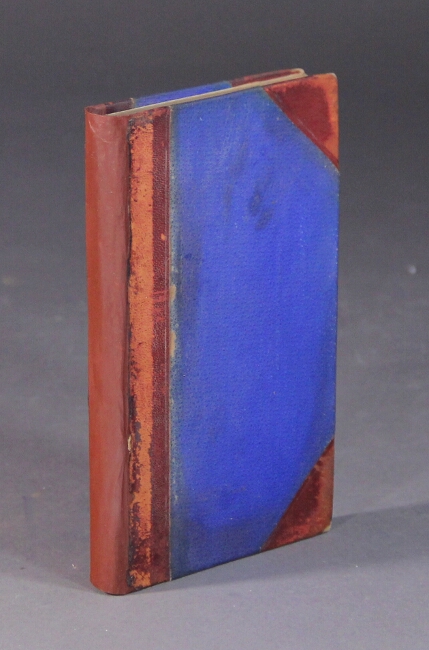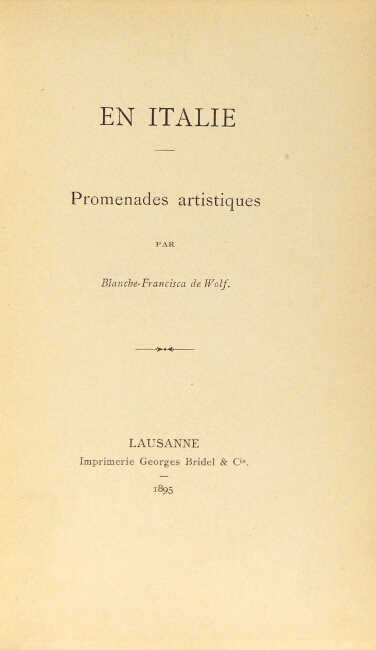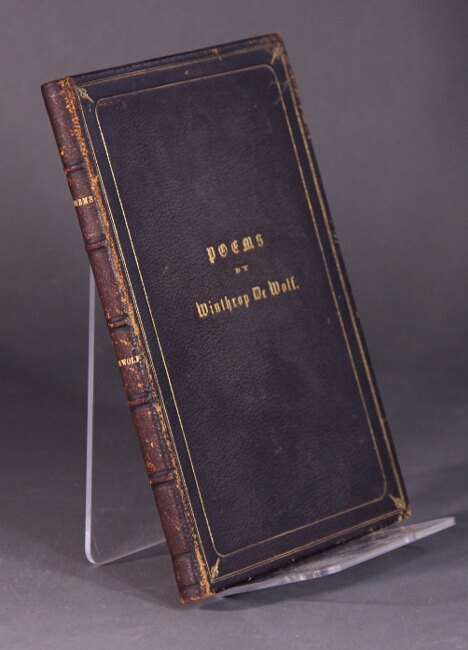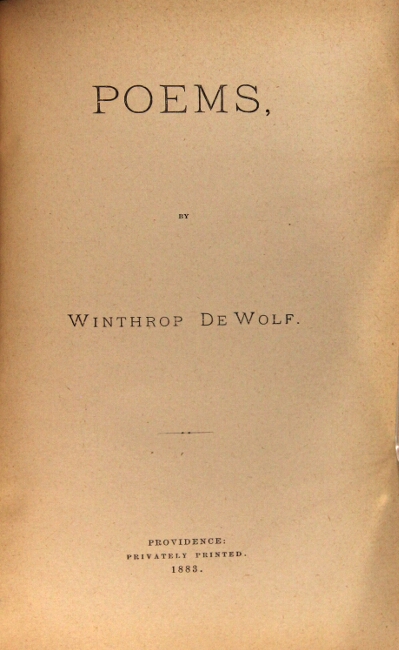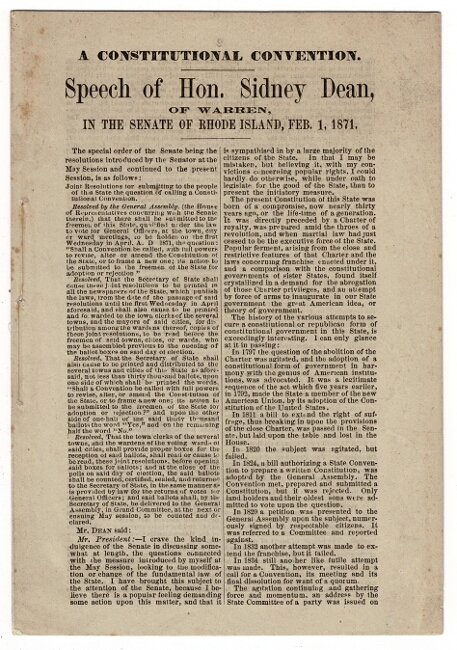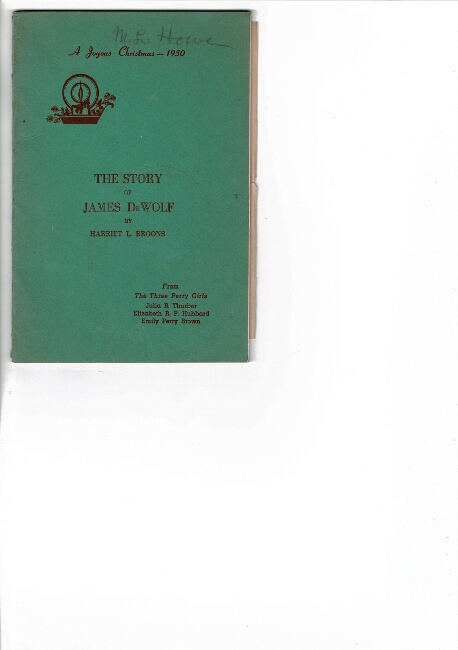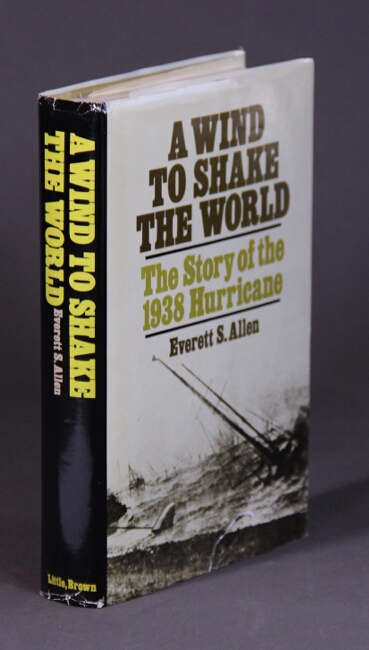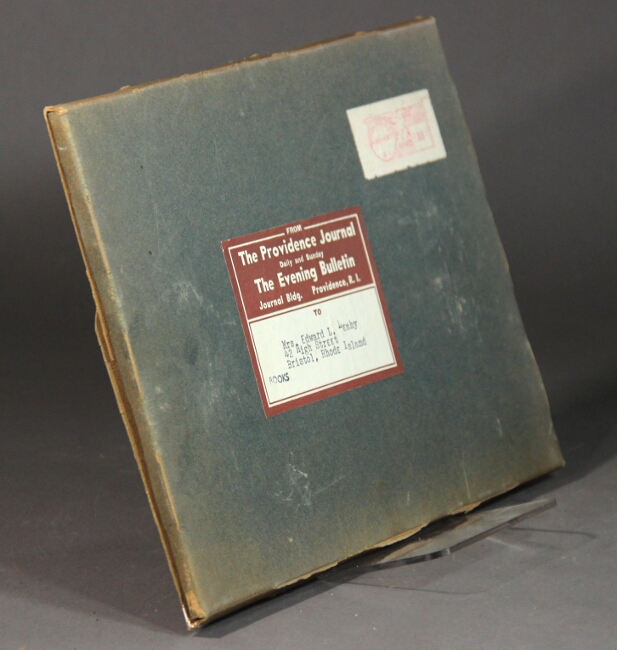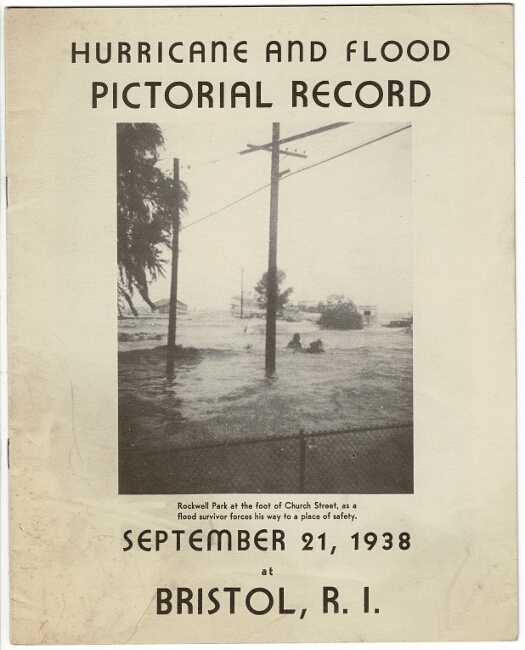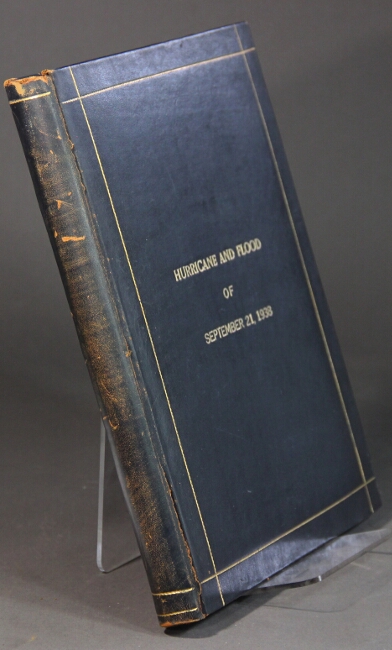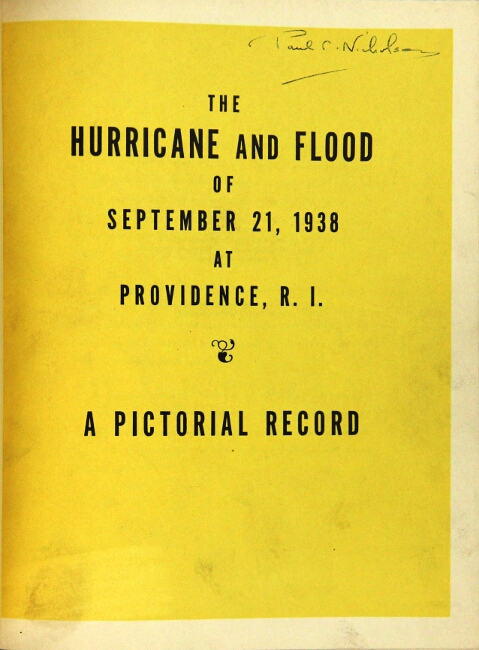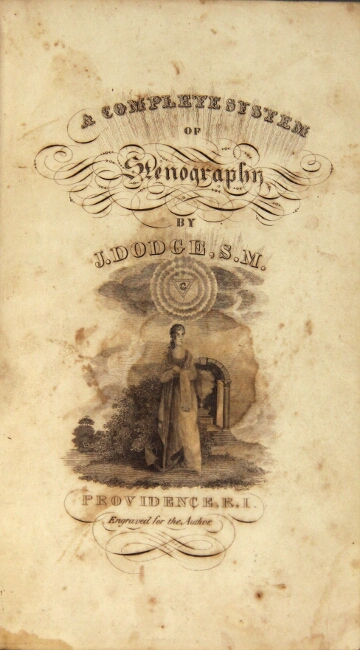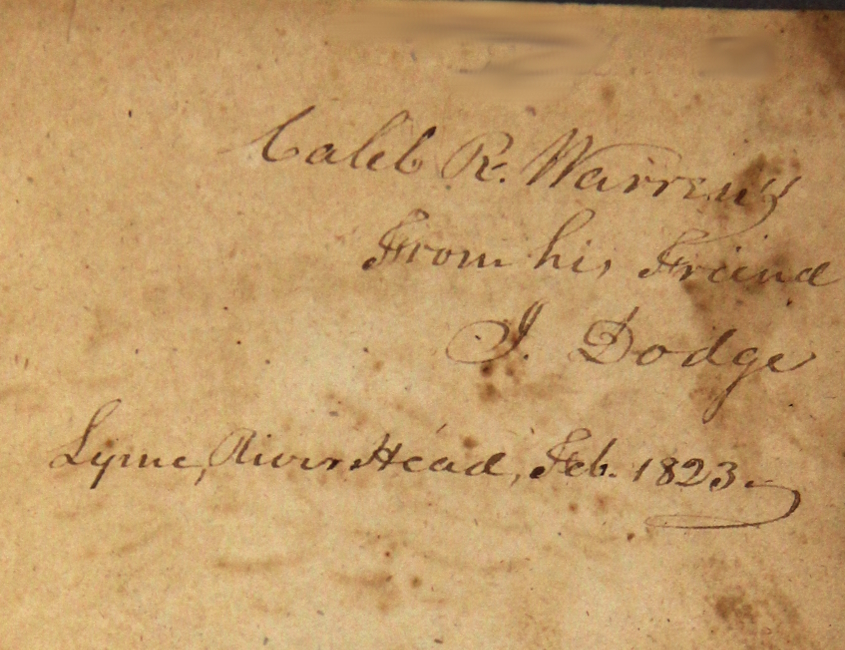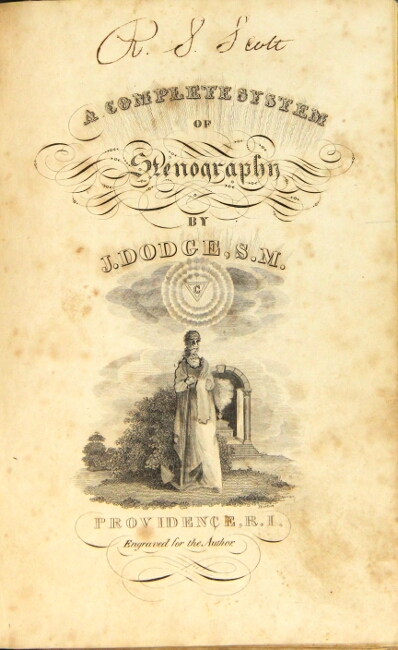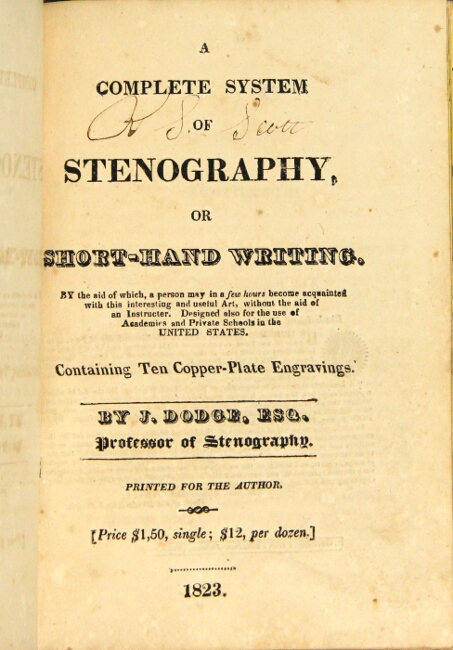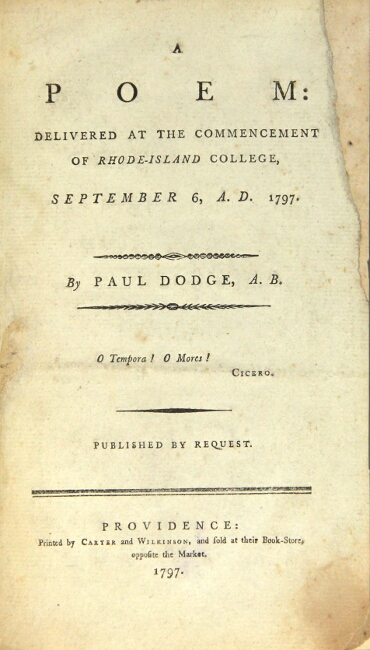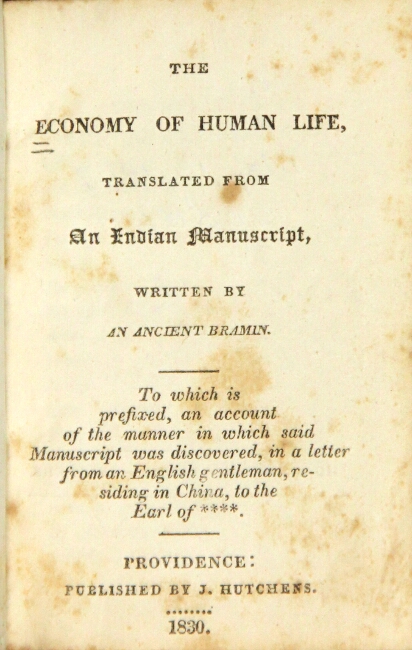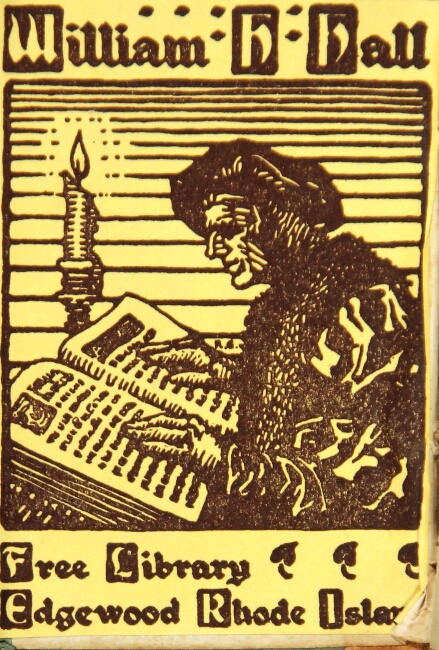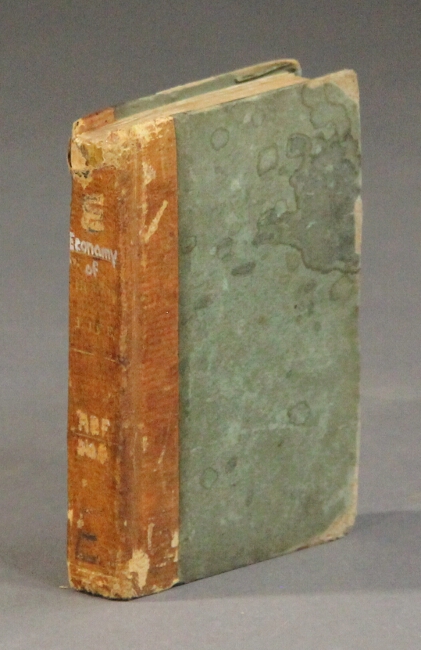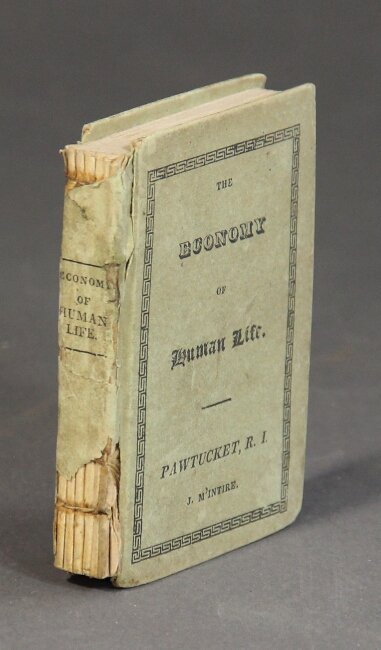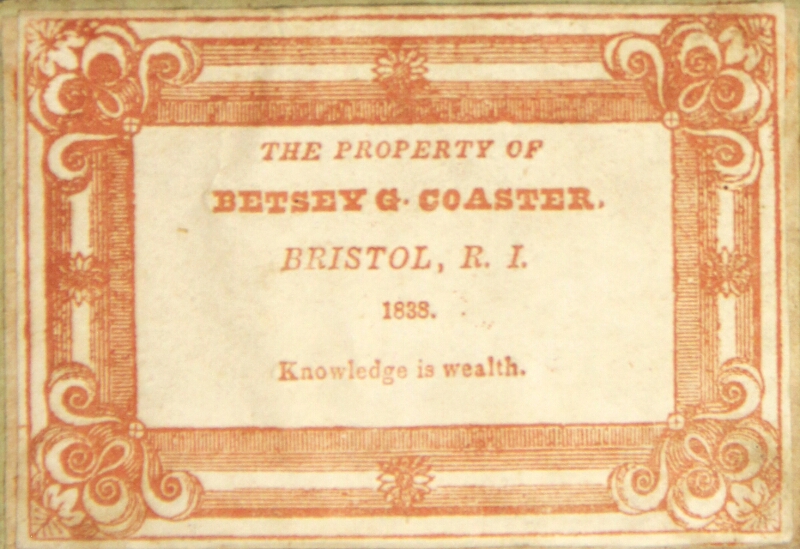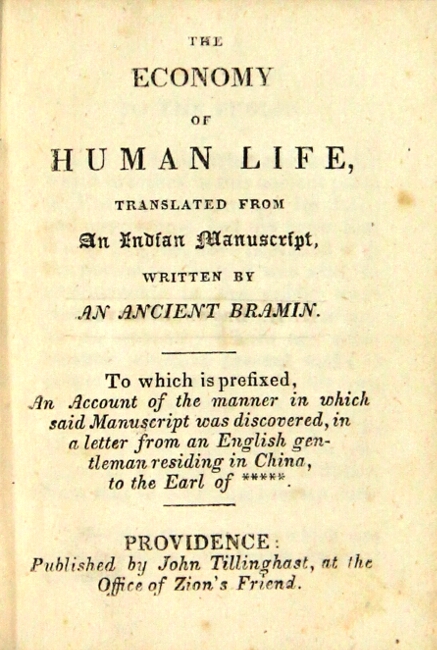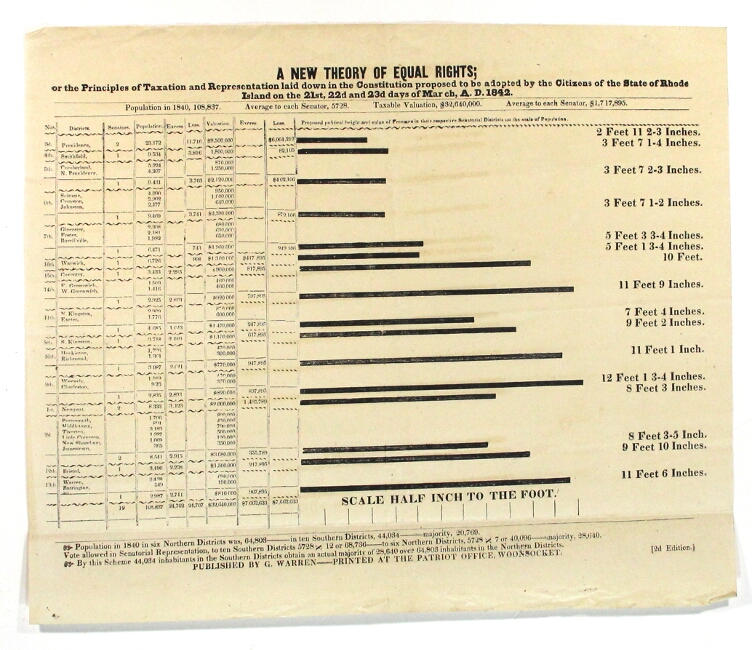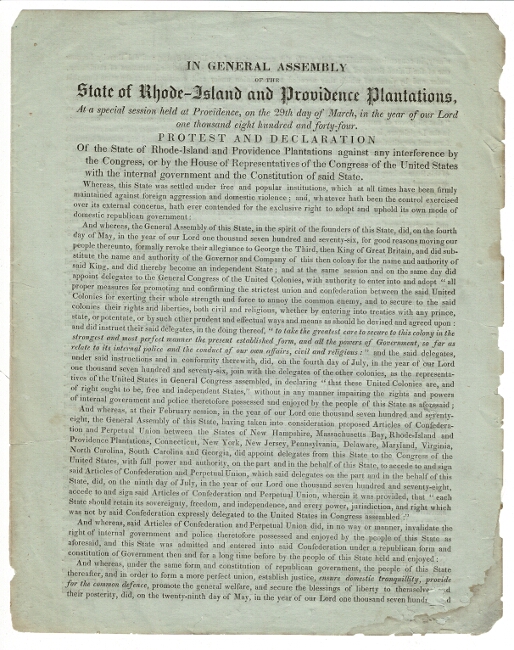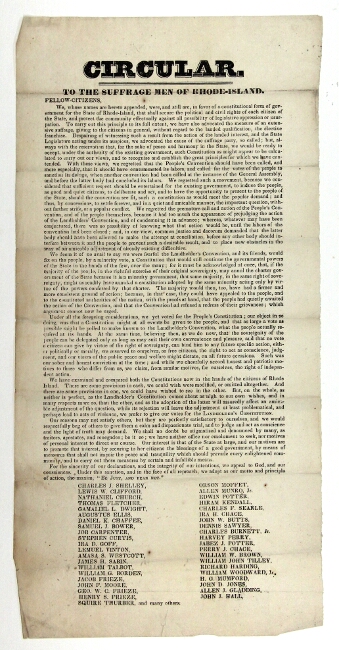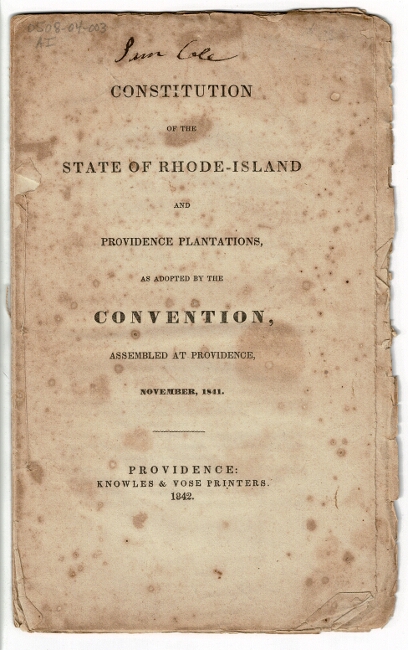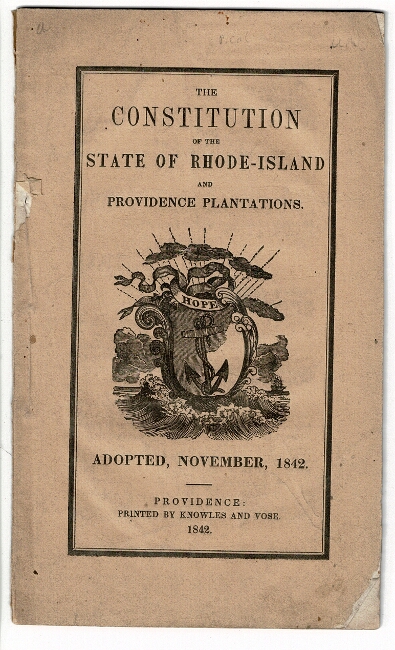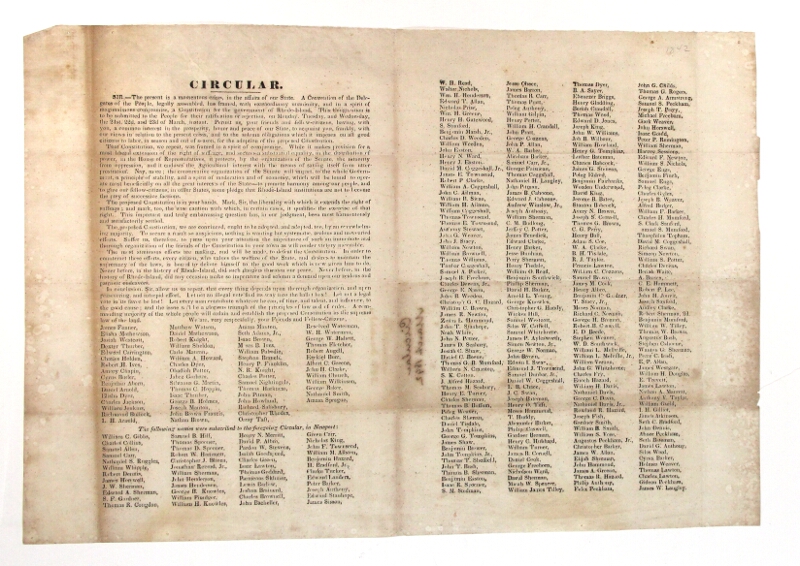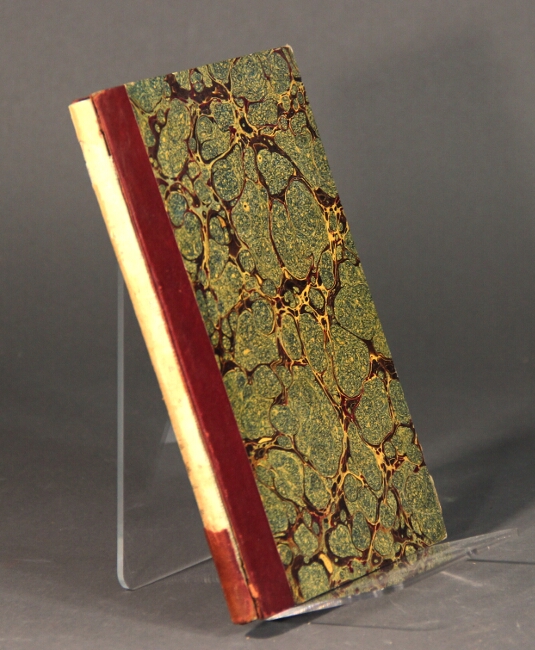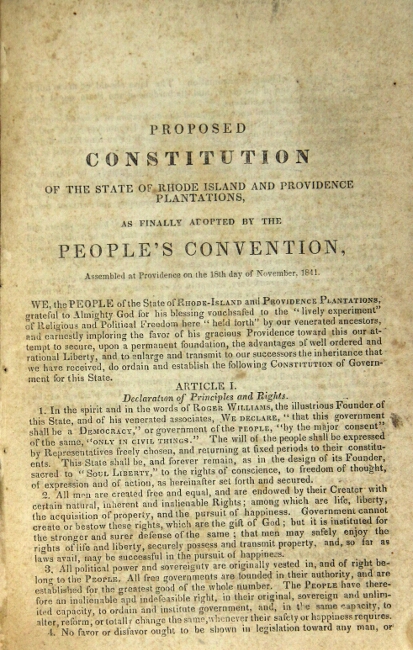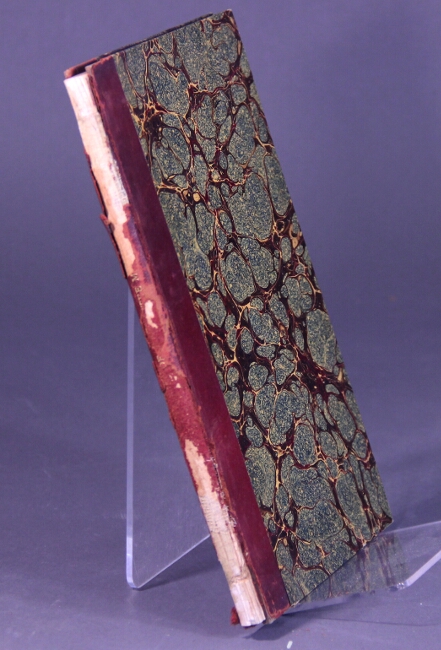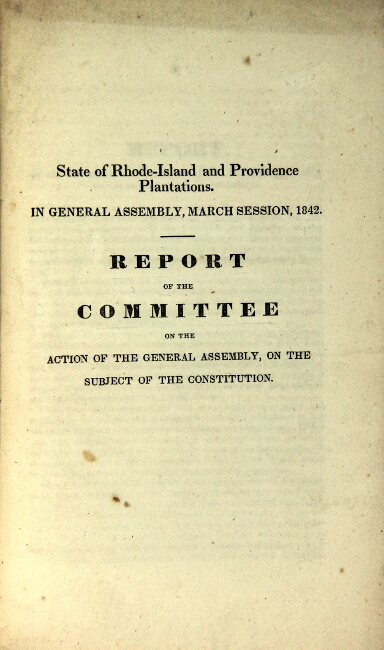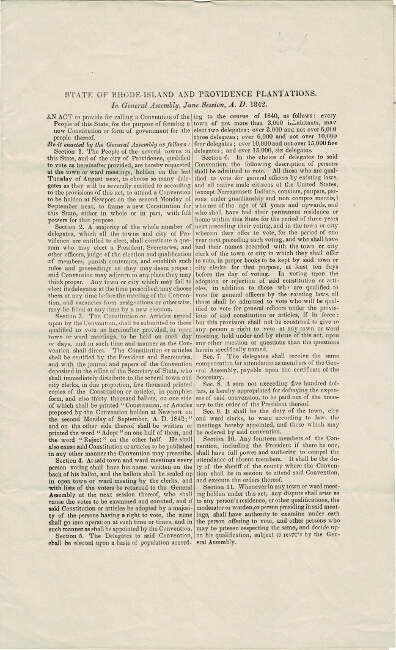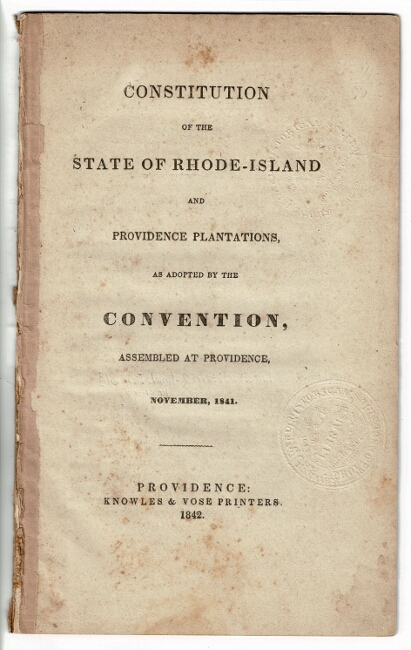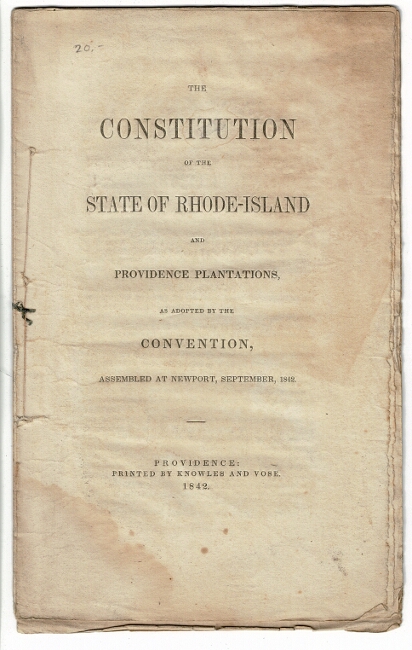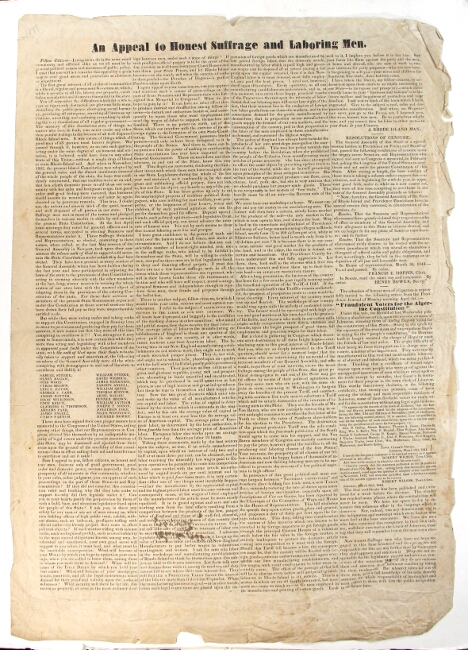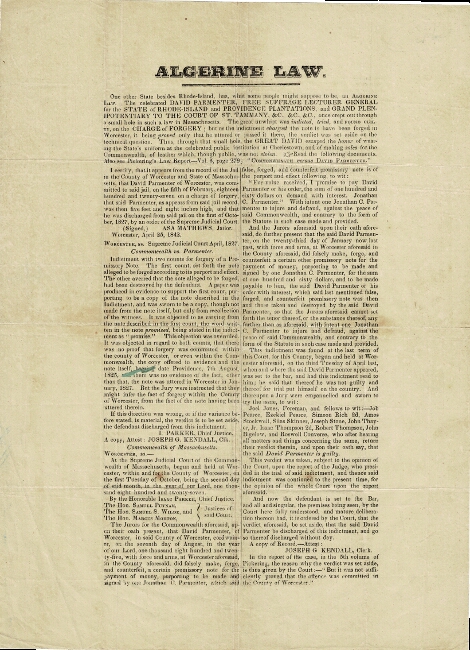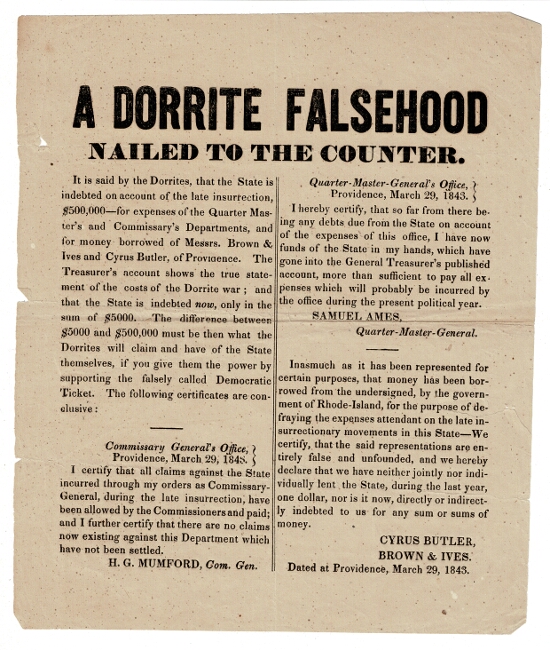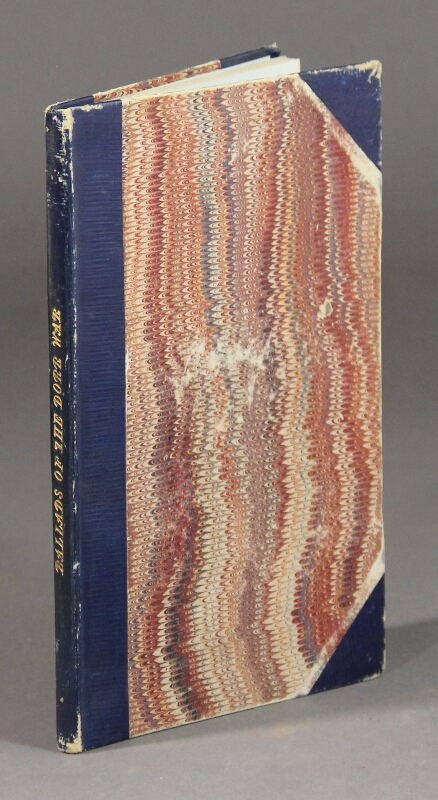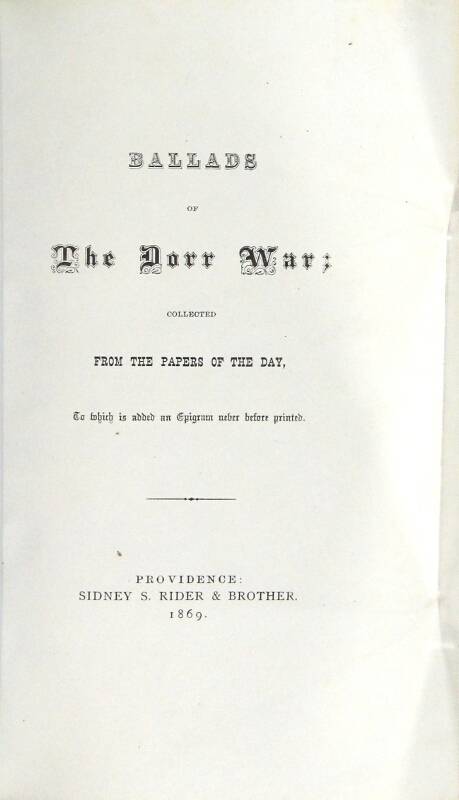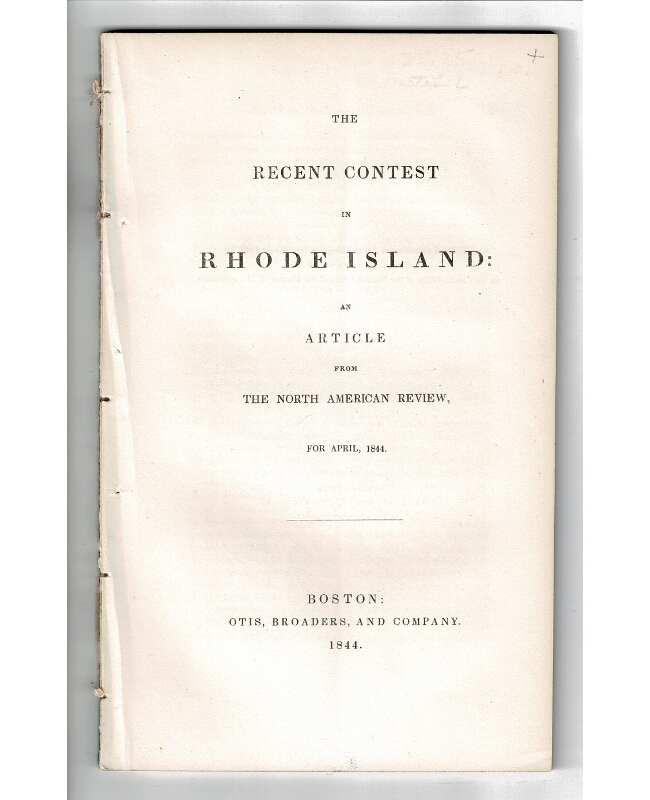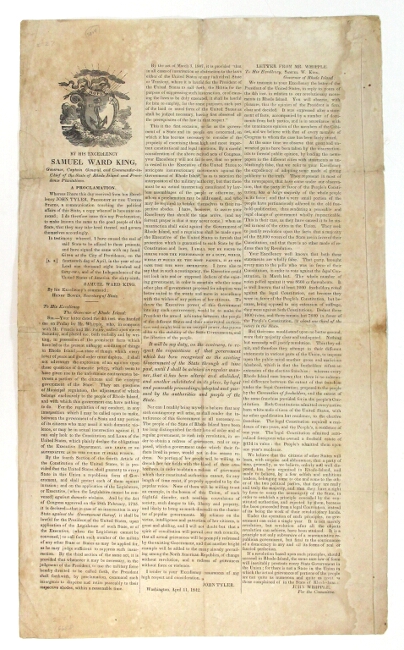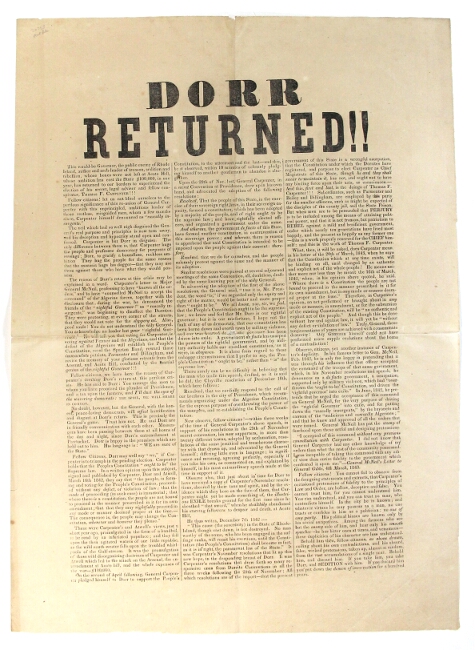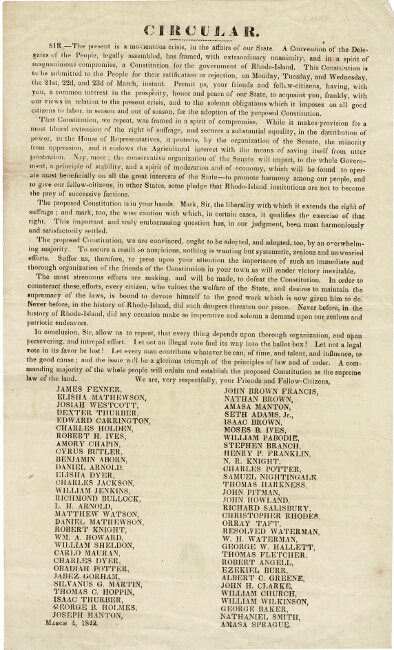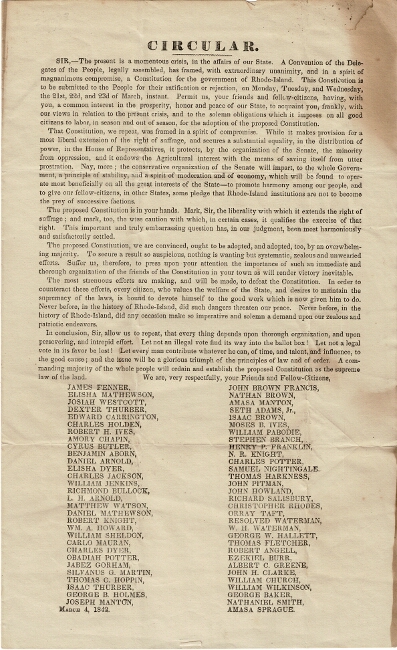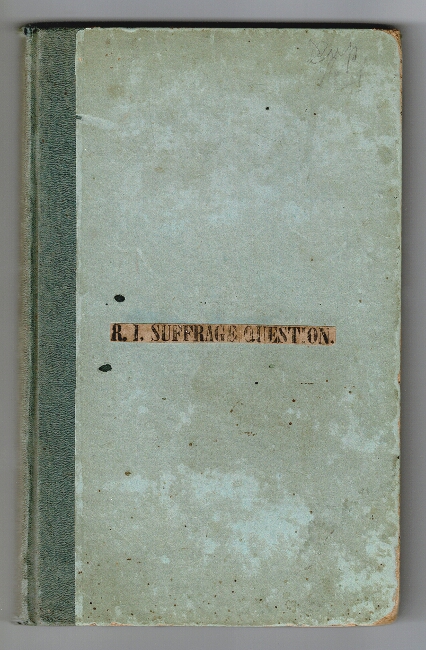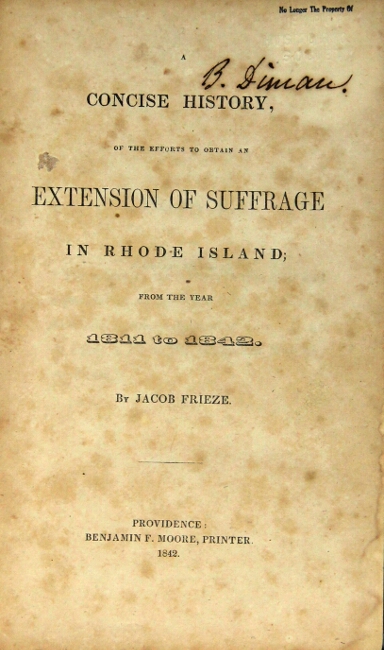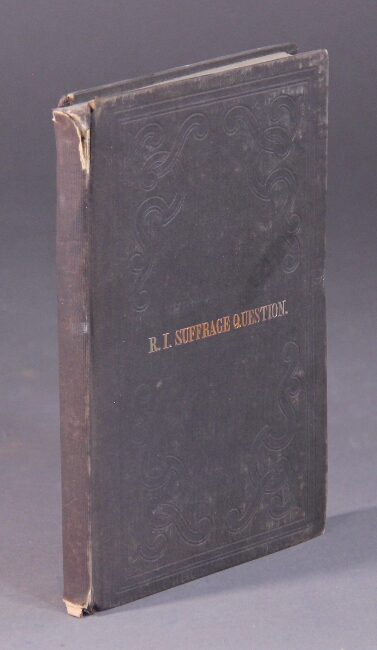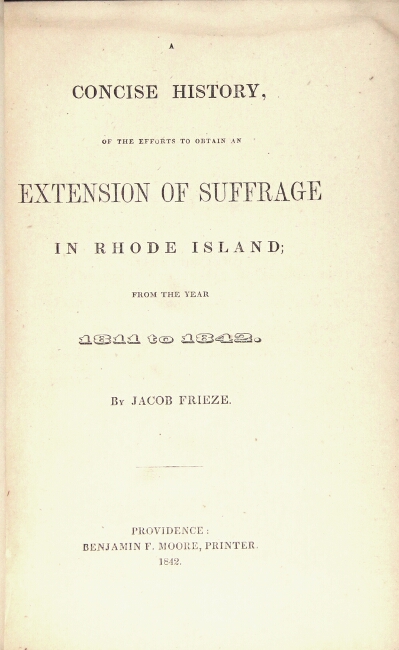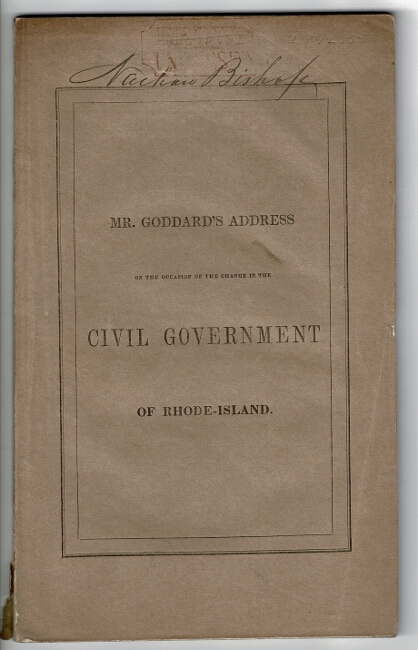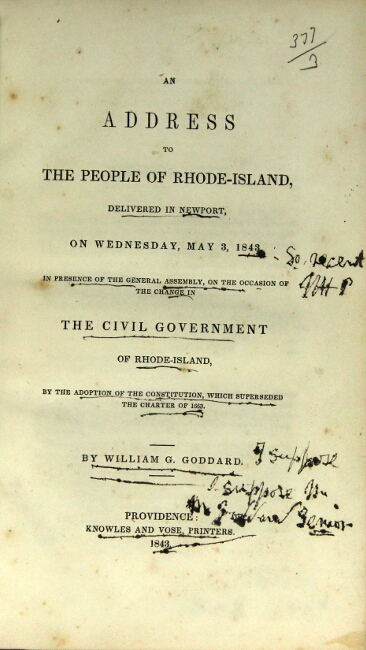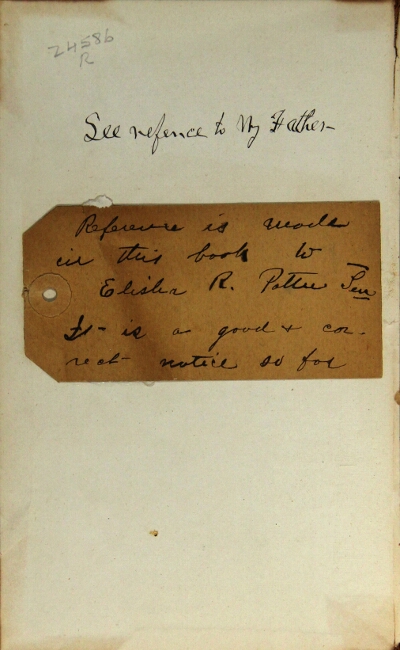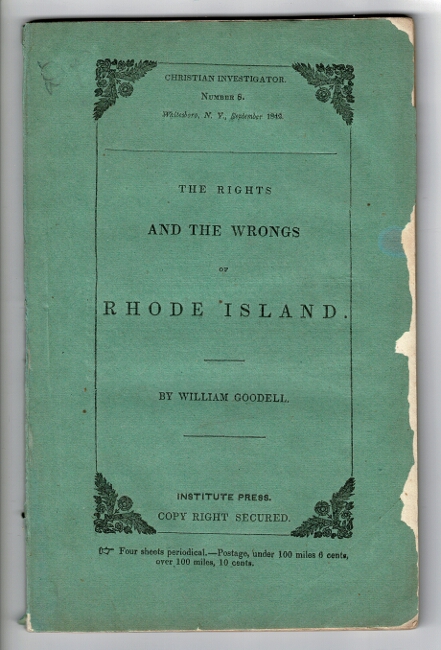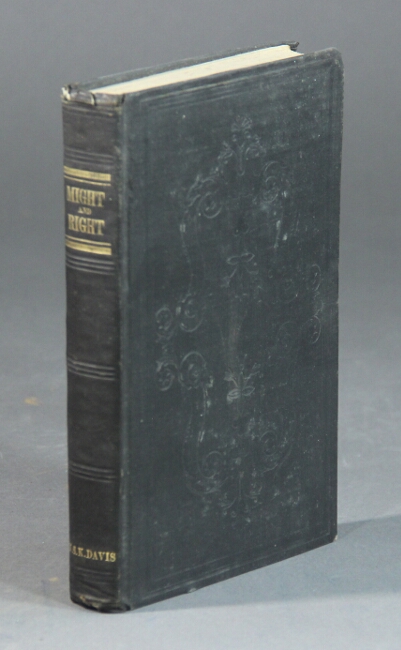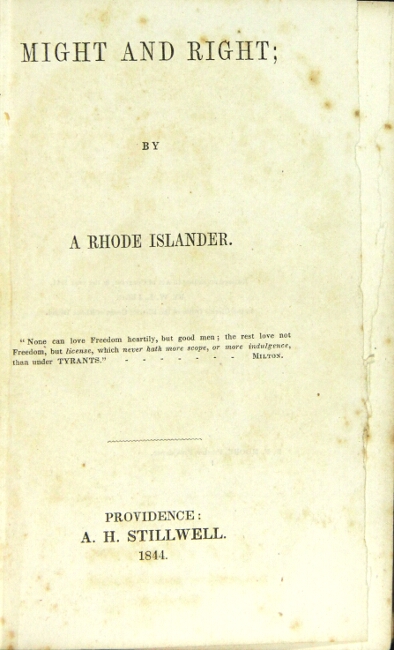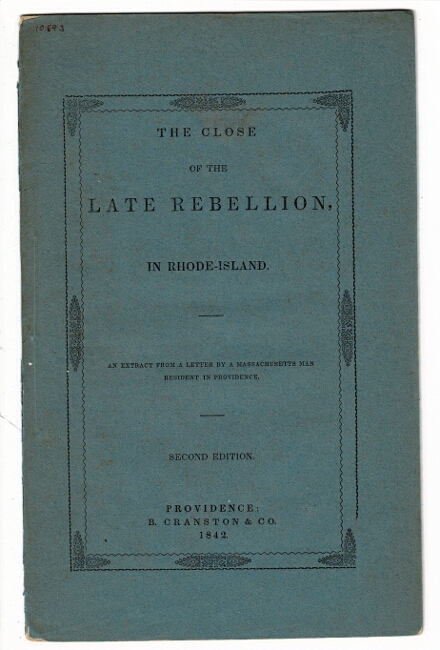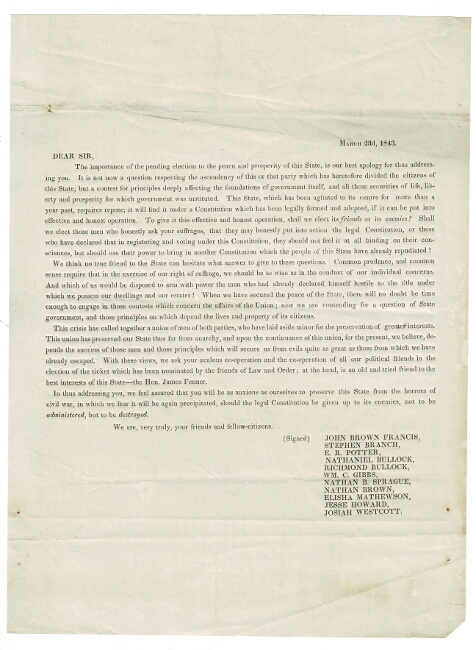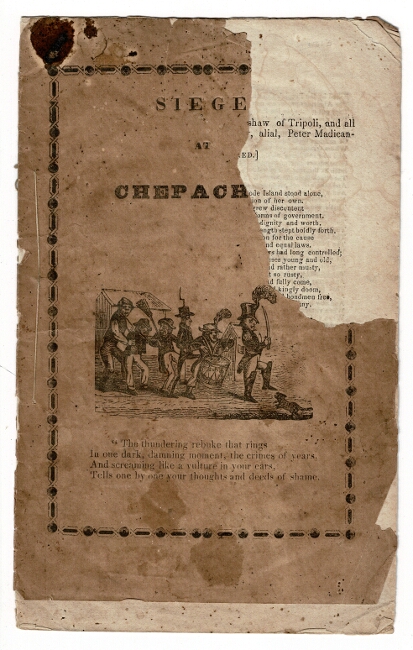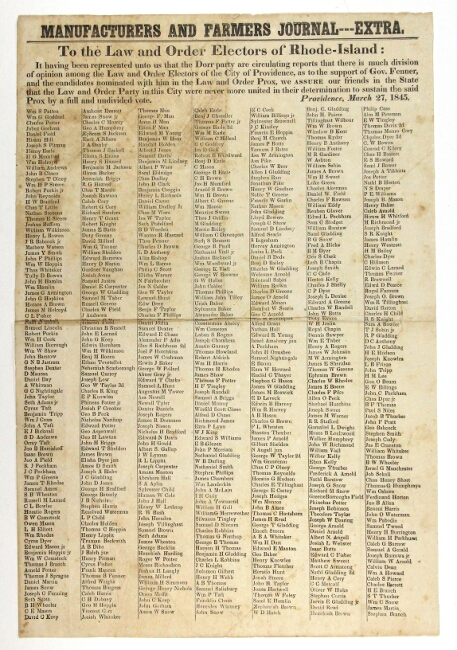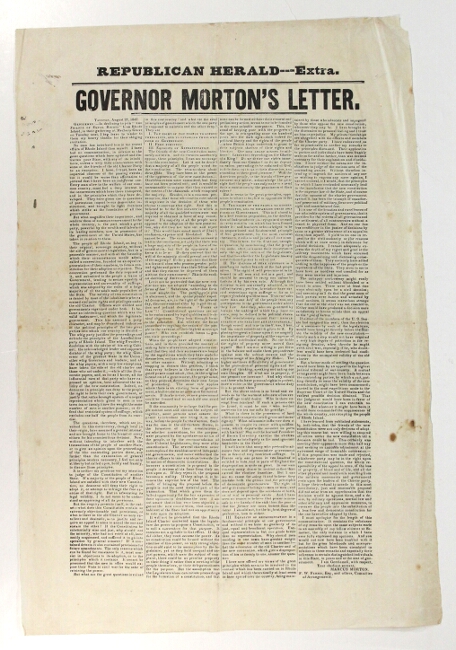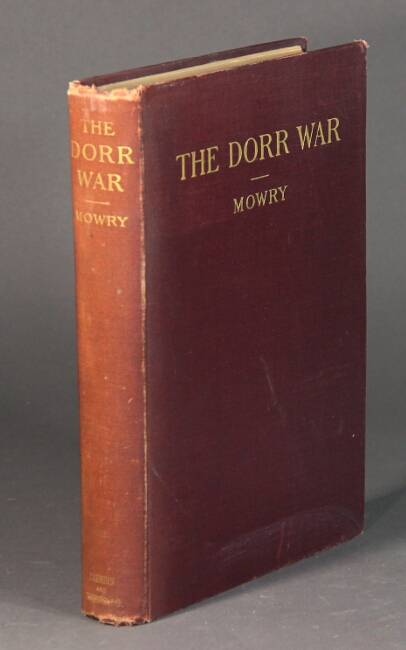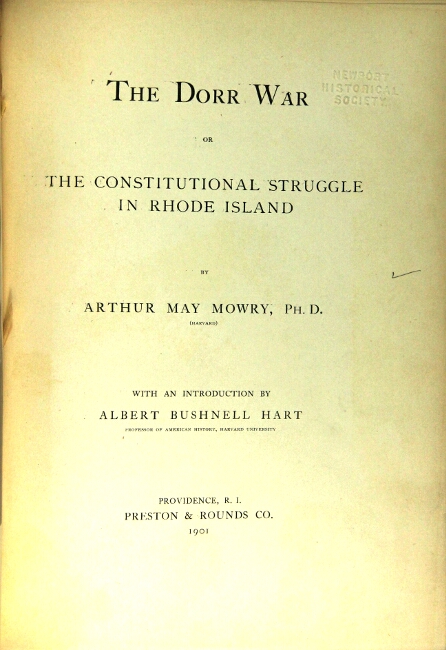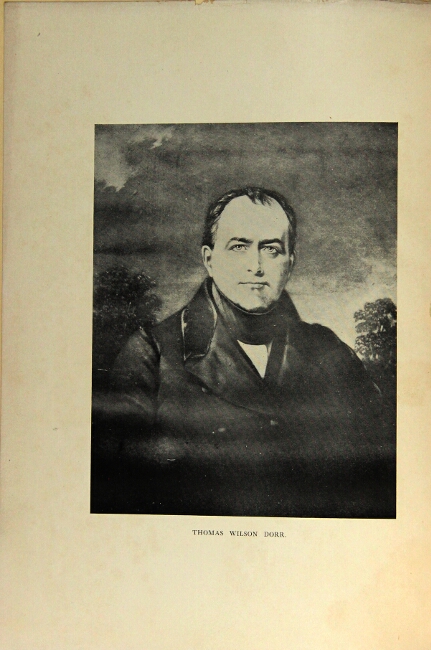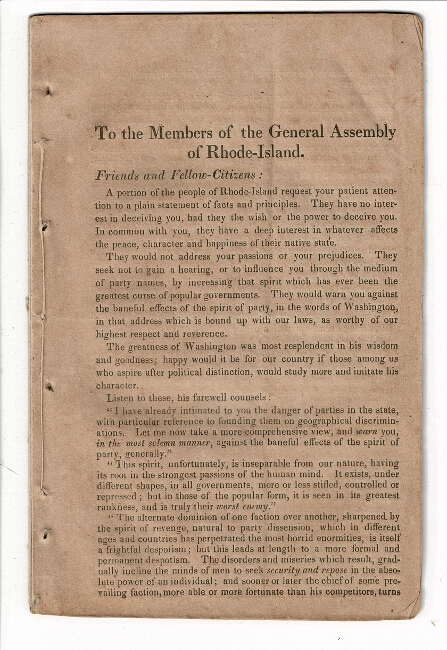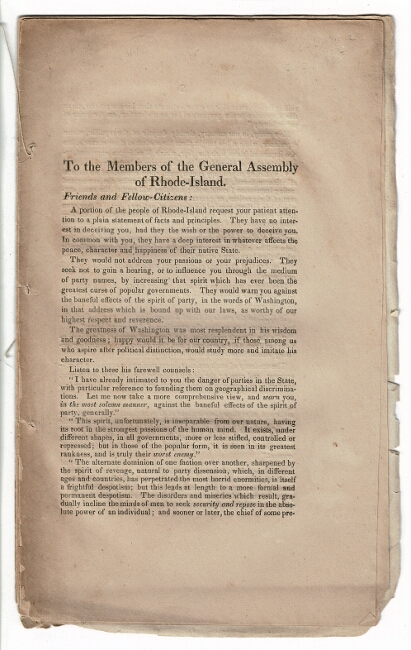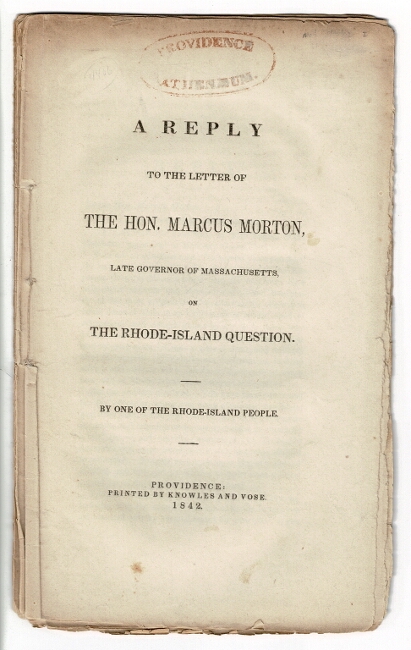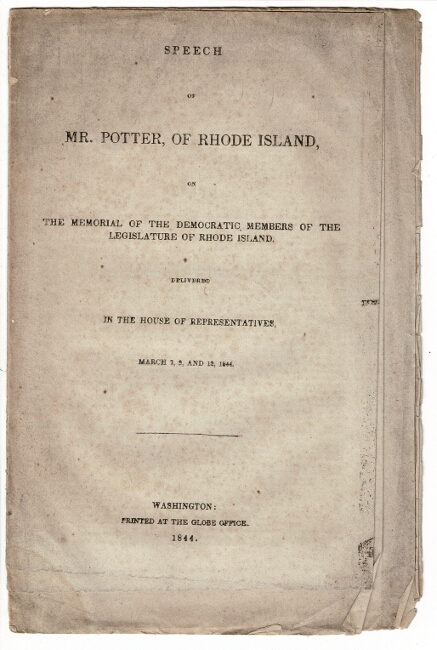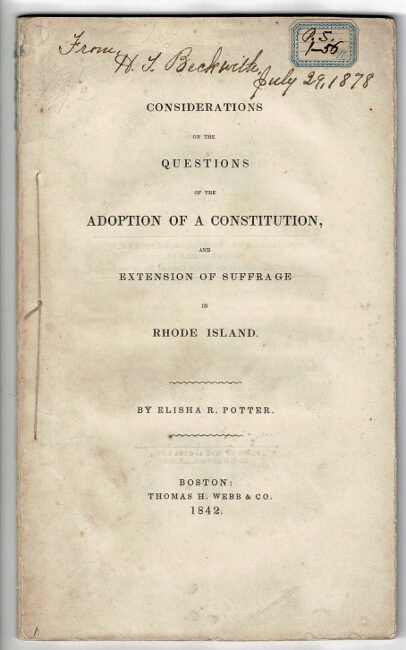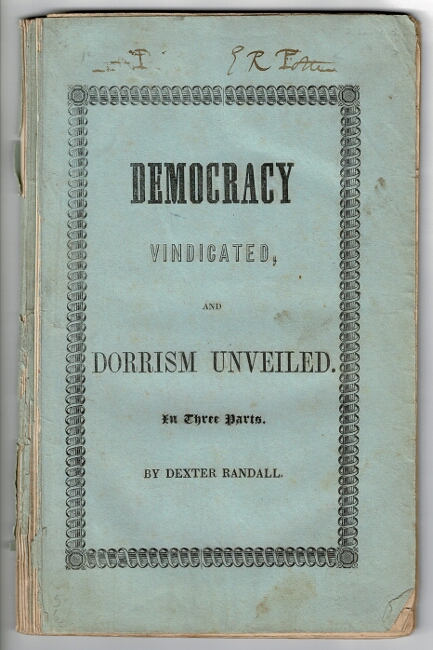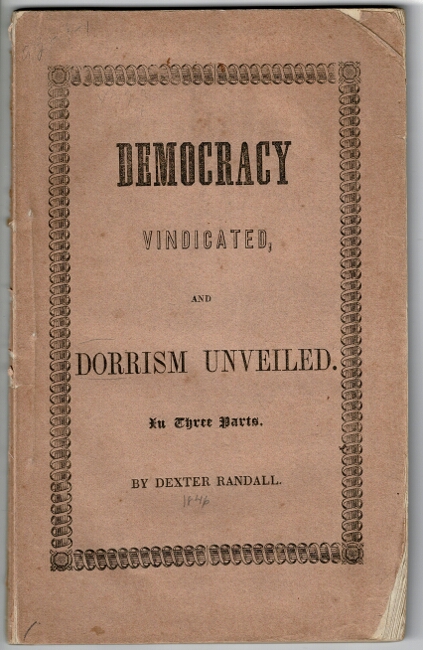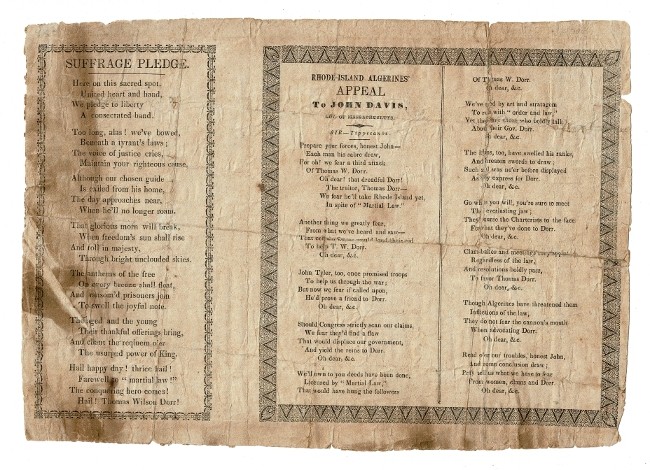201. [City Directory.] The Providence directory, containing names of the inhabitants, their occupations, places of business and dwelling houses; with lists of the streets, lanes, wharves, &c. Also, banks, insurance offices and other public institutions; the whole carefully collected and arranged. Providence: published by H. H. Brown, 1828.
SOLD
12mo, pp. 116, [4] ads; original printed gray wrappers; spine partially perished, otherwise very good.
Includes an historical sketch of Providence and a list of 33 aged inhabitants. First published in 1824, and, according to Bartlett, every two years up to 1850, after which it was issued annually.
This copy with the ownership signature at the top of the front wrapper of T. W. Dorr (i.e. Thomas Wilson Dorr [1805-1854], the extralegal Rhode Island governor and leader of the Dorr Rebellion). As a resident of Providence, his name is listed in the directory as an attorney at 26 N. Main Street.
AAS and R.I. Historical only in OCLC. American Imprints 34931; Bartlett, p. 216; Spear, p. 306.
202. [City Directory.] The Providence directory, containing names of the inhabitants, their occupations, places of business and of residence; with lists of the streets, lanes, wharves, &c. Also, banks, insurance offices and other public institutions, municipal officers of the city, &c., &c. The whole carefully collected and arranged. Providence: H. H. Brown, 1844.
$350
12mo, pp. 246, [18] index and ads; original calf-backed printed paper-covered boards; lengthy ownership inscription on flyleaf cautioning against stealing this book, else very good and sound.
First published in 1824 and according to Bartlett, every two years up to 1850, after which it was issued annually.
This edition not common: only 3 in OCLC (Iowa, Newberry, and the American Textile History Museum); none in Rhode Island. See Spear, pp. 305-06 for other editions; this edition not in Spear.
203. [City Directory.] The Providence directory; containing names of the inhabitants, their occupations, places of business and dwelling houses; with lists of the streets, lanes, wharves, &c. Also, banks, insurance offices and other public institutions; being a desideratum to almost every man in business. The whole carefully collected and arranged. Providence: H. H. Brown, 1830.
$450
12mo, pp. 150, [5] ads, [1]; printed paper-covered boards neatly rebacked in black cloth; very good and sound.
First published in 1824 and according to Bartlett, every two years up to 1850, after which it was issued annually.
This edition not common: only 2 in OCLC (Buffalo & Erie P.L. and AAS); none in Rhode Island. Spear, p. 306 noting that this includes an historical sketch of Providence.
204. [Civil War.] History of the Rhode Island combat units in the Civil War (1861-1865) ... Edited by Alfred H. Gurney. N.p.: publisher not identified, [1964].
$75
8vo, pp. xx, 338; numerous maps and illustrations throughout; fine copy in original blue cloth stamped in gilt on upper cover and spine, original pictorial dust jacket very slightly chipped.
Presentation copy from the author "To Elihu S. Wing Jr. M.D. with the kindest regards, H. R. Barker Brig.-Gen A.U.S. (ret.), January 3, 1965."
205. [Civil War.] History of the Seventh Squadron, Rhode Island Cavalry. By a member. 1862. Yarmouth, Maine: "Old Times" Office, 1879.
$125
8vo, pp. 11, [1]; portrait; original printed gray wrappers.
Reprinted from the Adjutant-General's Report, 1865.
Attributed in NUC to Augustus Whittemore Corliss. Also includes "Notes from the Diary of First-Sergeant Henry E. Alvord, Company 'B', Seventh Squadron, R.I. Cavalry," pages 8-11.
206. [Civil War.] The history of Battery H: First Regiment Rhode Island Light Artillery, in the war to preserve the Union 1861-1865. Providence: Snow & Farnham, printers, 1894.
$275
First edition, 8vo, pp. viii, [2], 216; 15 portraits and a map; near fine copy in original maroon cloth, gilt.
Battery H saw action at Chancellorsville, Battle of the Wilderness, and Appomattox, among others.
207. [Civil War.] The barbarities of the rebels, as shown in their cruelty to the Federal wounded and prisoners, in their outrages upon Union men, in the murder of Negroes, and in their unmanly conduct throughout the rebellion. Providence: printed for the author, 1863.
$75
First edition, 8vo, pp. 40; original printed salmon wrappers (chipped and with moderate losses on both front and back, and the top margins of the last 2 leaves also with loss; fragile, but good.
Details the atrocities of the Confederate Army.
Sabin 33275.
208. [Civil War.] Personal narratives of the battles of the rebellion, being papers read before the Rhode Island Soldiers and Sailors Historical Society. No. 2: The Rhode Island Artillery at the first Battle of Bull Run. Providence: Sidney S. Rider, 1878.
$50
8vo, pp. 31, [1]; original printed blue wrappers; large bookplate of a previous owner inside front wrapper, the word "Bull" in green flair in the top corner of the front wrapper, front wrapper neatly reattached; all else very good.
209. [Civil War.] Judge Pitman's charge to the jury, in the case, Samuel Norris vs. the Providence Tool Company [wrapper title]. N.p., n.d. [Providence?: publisher not identified, ca. 1862.].
SOLD
8vo, pp. 16; original printed tan wrappers; some dustiness and edgewear, a 1" x 2" chip out on the back wrapper; old vertical crease; good or better.
Addressed in manuscript on the back wrapper to "Hon. James F. Simmons / Providence."
The case involved a contract for muskets for the Union Army that Norris had secured for the Providence Tool Company. Rhode Island Senator James F. Simmons to whom this copy is addressed, intervened on the promise of Norris for compensation. Norris and the Tool Company subsequently disagreed on Norris's fee, and Simmons was a key witness in the case. It ultimately reached the U.S. Supreme Court which invalidated the entire contract as "suggest[ing] the use of sinister and corrupt means for the accomplishment of the ends desired." The principals and Secretary of War Cameron were sharply rebuked and the case sent down to be tried again. Simmons resigned from the Senate.
Not found in OCLC.
210. [Civil War.] Report of the Rhode Island Fiftieth Anniversary of the Battle of Gettysburg Commission. Providence: Rhode Island Printing Company, 1914.
$45
8vo, pp. 23, [1]; original blue cloth, gilt stamped on the upper cover; last leaf with a short tear entering from the fore-margin; all else fine.
211. [Civil War.] Three-page autograph letter from Priscilla B. Sturges to Capt. McGrath, concerning the death of her husband. Providence: June 21, 1863.
$250
8vo, on integral sheets, in ink; previous folds; very good and legible. On page [4] is a note from her sister R. Matthews, also to McGrath. Stamped postmarked envelope on yellow paper addressed to Capt. McGrath, Commanding Co. F, 50th Regt., N.Y. S. V. Engineers, Washington, D.C.
Priscilla B. Sturges was the wife of Union soldier Private John Foor Sturges, born in Delaware County, New York of George and Sarah Sturges. She writes his former commander Michael McGrath, Captain of Company F of the Army of the Potomac: "Your letter bringing the sad intelligence of my husband (sic) death was received on the 10th to (sic) late to have the body of my husband sent home ... would you be kind enough to see that my husband grave is marked ... oh if I would but have seen my husband once more, could only have been with him when he died, what a comfort to me ... he was good and kind and life looks dark indeed without him."
She then asks for information to get his bounty and back pay and the needed particulars of his enlistment. She also directs McGrath to sell a few of his possessions to settle his debt.
The 50th Regiment, New York Engineers, was organized at Washington, D. C., from 50th New York Infantry October 22, 1861. The regiment mustered out at Washington, D. C., June 13, 1865. Sturges enlisted in Company F of the 50th in 1862 at Rochester, New York, and died in battle the following year at Franklin's Crossing on June 5, 1863, near Fredericksburg, Virginia.
The one-page note within the letter is from "R. Matthews," Priscilla's sister who lives in Providence where she was apparently visiting. She asks Capt. McGrath introducing Mr. G.W. Smith of the Land Office as an advisor and intermediary to Mrs. Sturges. She adds: "Hopeing (sic) & praying that you may lead your men through this terrible war, & come out with yourself & Company & Union fully Preserved..."
212. [Civil War.] The memory of the first battle: a discourse preached in Westminster Church, Providence, R.I., on the 28th anniversary of the Battle of Bull Run, July 21, 1889, before the veteran associations of the First and Second Rhode Island Regiments and their batteries. Providence: E. L. Freeman & Son, book and job printers, 1889.
$125
First edition, slim 8vo, pp. 34; fine steel-engraved portrait; original maroon cloth stamped in gilt on the upper cover; fine.
The author was Chaplin of the First Rhode Island Regiment of Detached Militia.
213. [Clarke-Hazard Family Papers.] Large archive of material relating to the Clarke-Hazard-Brenton family of Kingstown, Rhode Island. V.p., v.d.: 1740-1950.
$5,500
Impressive archive from an important early Washington County family--the Clarkes--and their relatives, including approximately 270 pages of documents, correspondence, deeds, commissions, wills, etc., plus approx. 540 photographs (1880-1950), plus approx. 60 pages of printed matter and news clippings. Overall good to fine condition.
The site of the family farm in South Kingstown was the locale of the Great Swamp Fight of 1675, an Indian battle of King Philip's War which wiped out all but about one hundred Narragansetts. Deeds are included for portions of this land as well as many other parcels of the family holdings. This collection also includes the genealogy of the family including a nine-page typescript by an unidentified author, circa 1930. There are Clarke, Hazard, Hull, Brenton, and Lynch papers in this collection, representing intermarried families. Another highlight is Civil War letters written by a Rhode Island soldier who adopted an alias after deserting and joining a Missouri regiment! The collection also includes a dye log book from an early Rhode Island textile mill.
The Clarke family was in Newport by 1638, and the earliest papers are from Gideon Clarke (1738-1817) who lived in South Kingstown. His son, John Gideon Clarke (1777-1868), married Almira D. Hull. Their daughter, Almira Hull, married Frank C. Lynch and one of their children was Frances Lynch, born 1903. Thomas B. Lynch was a sea captain. John G. and Almira's son, John Gideon Clarke (1824-1891), married Harriet Maria Hazard and lived in South Kingstown. The several John G. Clarkes were very active in town affairs and held many offices. John G. Clarke is mentioned in A History of Kingston, Rhode Island as being a vice president of the Rhode Island Anti-Slavery Society.
The Clarkes are also connected (probably through Jeremy Clarke of Newport) to the Brenton family who were among the original settlers of Newport in 1637. The Brentons were prominent and their descendants are related to both Governor Samuel Cranston and to Roger Williams. The Brenton family was Loyalist during the American Revolution, and some family members fled to England and Nova Scotia.
Hazard relatives include Thomas Robinson Hazard (1797-1886), the second son of Rowland Hazard I (1763-1835), and Mary Peace Hazard. He was raised in South Kingstown as a Quaker, and spent three years in a Quaker school in Westtown, Pennsylvania, from 1808 to 1811. He began his adult life in the textile industry, first in his father's mill in South Kingstown, and then after 1821 on his own account. He also farmed and raised sheep, which earned him the nickname "Shepherd Tom." In 1838, he had amassed a sufficient fortune to enter a state of quasi-retirement at his estate in Portsmouth which he named "Vaucluse". In his later years, he was a frequently published author on topics as diverse as capital punishment, local history, African colonization, and sheep raising; he acted as a civic advocate for the poor and mentally ill. Among his books was a collection of political essays titled Facts for the Laboring Man by a Laboring Man (1840); A Family Medical Instructor: Civil and Religious Persecution in the State of New York (1876); and a collection of South Kingstown folklore entitled The Jonny-Cake Papers (1888, reprinted 1915). However, his primary interest was the Spiritualist movement. After the death of his wife, he wrote countless newspaper articles on spiritualism, and held frequent seances at Vaucluse. Hazard married Frances Minturn (1812-1854), daughter of Jonas Minturn of New York, in 1838.
A lengthy inventory of the archive is available on request.
214. [Coal Industry.] An archive of more than five-hundred business letters, invoices, and receipts, as below. Providence, Boston & Philadelphia, et al.: 1844-1862.
SOLD
Handwritten letters from pre- and Civil War era coal brokers and merchants in Rhode Island and Massachusetts - a wealth of information on prices, market conditions, transportation and more.
Includes 275 letters and receipts, primarily from Providence companies (Manchester & Hopkins; Plimpton & Taft; James H. Coggeshall; S.B. Halliday; S. W. Baker); 40 letters from Boston and Worcester (Green Street Coal Yard); Philadelphia (Van Dusen, Norton & Co., sole agents Lehigh Coal); 11 letters on printed letterhead from the Office of the Delaware Lackawanna and Western Railroad Co., Inc.; also 190 pieces including many signed receipts, handwritten bills and billheads from a few dozen coal brokers, merchants and dealers.
Most correspondence is one page, without envelopes. Size ranges from 2.5" x 7" for the illustrated receipts to 8" x 10". Some of the larger items contain third-party handwritten notes and annotations. Also included is a printed circular, Conditions For the Sale and Shipment of Lackawanna Coal, signed in type by Alfred Wright, Agt., Delaware Hudson Canal Co., April 28, 1849. 7.5" x 11.25", trimmed close on the left margin, text unaffected.
The correspondence was sent to the large textile machinery maker, Paul Whitin & Sons of Massachusetts. Col. Paul Whitin (1767-1831) founded a cotton manufactory in Northbridge, and established the industrial village of Whitinsville, part of what is today referred to as the Blackstone Valley Industrial Corridor. It grew over several generations (with sons Paul, Charles & James Whitin) into a major manufacturer of machinery whose plants were fueled by coal. Coal was brought into the port of Providence by ship and overland via railroad and sold to regional companies. By 1878, cargoes amounted to almost one million tons most of which was shipped to Massachusetts.
Two suppliers from Rhode Island, Manchester & Hopkins, and Plimpton & Taft represent at least 150 letters to P. Whitin & Co. William H. Hopkins founded a company in 1843 which took in Jacob Manchester (1806-1871) in 1849, becoming Manchester & Hopkins. Eventually, their company encompassed three downtown Providence acres and the Hopkins coal pier on Dyer Street in Providence stored thousands of tons. Their letters date from 1856 - May 1862. In 1862, there were strikes at the mines and vessels were scarce due to the war.
Manchester & Hopkins, Providence, May 9, 1862: "We have none of the genuine Cumberland, but are daily expecting b/l of some...We forward your order for 300 tons of Ashland Stove"; "Owing to the strikes at the mines we cannot say whether the order will be accepted or not as our time to accept their offer has expired."; May 15, 1862 – "Your order for 300 tons Ashland Stove Coal is accepted subject to an advance of Tolls, or the Government tax, if assessed. The same coal is now stiff at $3.10. We think it would be wise to withdraw the limits on the freight, as vessels are scarce..."
By 1862 they had James W. Taft as an employee who had started off as Plimpton & Taft (Silas W. Plimpton of Pawtucket). The series of letters from them date from 1853-1856 and one example concerning a weight dispute is dated 27 Sept 1855: "The first lot of Cumb(erland) Coal was loaded on three dumps ... making 3 tons 877 pounds to each dump; and they are all filled. We cannot account for the deficiency unless your teamer has driven off without weighing." Prices in 1856 for white ash and egg coal were quoted at $6.75 (per ton) in a letter from January 24th.
Halliday & Baker (Samuel B. Halliday & Seth W. Baker) supplied Whitin with several types of coal (approx. 30 letters, 1846-1853): Aug 16, 1848: "Mr. John Whitin enquired respecting melting coal. We will supply you with the same article that we are supplying several of our largest furnaces with, at $5 3/4 per ton. Our customers generally say it is the best article... by small quantities we get $6." Seth Baker went on to form his own firm - S.W. Baker Co.
There are 33 letters from S. W. Baker Co. dating 1852-1859. Seth W. Baker (and new partner Bennet) was supplying Lehigh Lump, Cumberland "Run of Mine' coal, Colraine, Beaver Meadow, most coming up from Philadelphia. One letter described a mining accident: S.W. Baker, Providence, Sept. 7, 1859: "An accident of a serious nature has happened to the mines producing Colaraine Coal. It is uncertain when it will get to work again. I ordered from another mine a cargo intending it for you. The mines failed & his works stopped in consequence."
James H. Coggeshall, another R.I. supplier, (17 letters 1851-1853) writes: "Aug 28, 1851. I have purchased of S. B. Halliday his interest in the firm of Halliday & Coggeshall & wishing to close up entirely the balance of oil which we have on hand, wld be glad to sell it to you. There is in the lot 294 gls Black Spring Whale Oil, 165 (ditto) Winter Whale Oil, about 190 (ditto) Unbleach Spring Sperm. The above is vey handsome & is from one of the best manufacturers in New Bedford... PS Should you be in want of coal - please allow me to send it to you".
Eleven letters from the office of the Delaware, Lackawanna, and Western Railroad, based at 51 Wall Street, New York, refer to schooners Josephine, Eldad, Enterprise, and the Eliza & Jane. The railroad was offloading to Providence for $3.30 a ton in 1858. The correspondence includes a miscellaneous group which includes a sales letter from Williams & Co., Boston, Aug. 1, 1862: "We should be pleased in receiving your order for a few tons of coal we have on consignment which we are selling at the very low price of four dollars per ton...Mr. Hayes, State Assayer, who has analised it reports that it contains none of the usual sulphur compounds or sulphurate of iron and is as pure as charcoal, producing a most intense heat [and] exerting a purefying action...which make it most desirable for metallurgic purposes."
Problems are often reported: George Augustus Crocker of Bussing, Crocker & Dodge, New York, July 14, 1856 – "I regret much to say that the Foundry Lump Vein (for the past three weeks) has not run ... I have delayed shipping your coal, hoping every day to get more favourable reports from the mines." There are also letters from N. Sturtevant & Co., New York, Aaron Guild of Boston, and Van Dusen, Norton & Co., shippers of Lehigh and Schhuylkill Coal in Philadelphia and New York. Other correspondents were B. M. Nevins, Remington Henry, Williams & Co. of Boston, W.H. Newman, Isaac Hinckley (Pres. of Providence & Worcester RR), William Chace & Co., W. Whipple Brown, W.G. Chapin. One letter from Thomas Haviland in Boston in 1858 mentions a fire which held up a coal shipment. Other letters are from Thomas Sutton of the Green Street Coal House in Worcester.
Overall, a premier collection in its genre which will add much specific knowledge of the energy suppliers who fueled and sustained the Industrial Revolution.
215. Oriental harp. Poems of the Boston bard. Providence: printed and published by Smith & Parmenter, agents for the sale of the Oriental Harp, 1826.
$150
First edition, 8vo, pp. [9], 14-254; engraved frontispiece portrait; original drab boards, printed paper label on spine; both covers nearly loose, spine partially perished, label lightly chipped, occasional light foxing; all else good or better.
"Robert Stevenson Coffin was born in Brunswick, Me, 1797(?). For some time he worked at his trade as a printer, in Newburyport, Mass. During the War of 1812 he was a sailor and was captured and held as a prisoner on board a British frigate. After the war he continued to work at his trade in Boston, New York, and Philadelphia. He died at Rowley, Mass., in 1857. He was self-styled 'The Boston Bard'" (Harris Collection).
American Imprints 24145; Harris Collection, p. 61; Sabin 14187.
216. LeBaron B. Colt. Memorial addresses delivered in the Senate and House of Representatives of the United States in memory of LeBaron B. Colt, late a senator from Rhode Island. Washington, D.C.: Government Printing Office, 1925.
$50
8vo, pp. [6], 43, [1]; gravure frontispiece portrait; original black cloth stamped in gilt on upper cover; very good.
Not only a Senator from Rhode Island but also a United States Circuit Judge of the U. S. Court of Appeals for the First Circuit, and of the U. S. Circuit Courts for the First Circuit. Colt was the son of Christopher Colt (the brother of arms maker Samuel Colt) and Theodora Goujand DeWolf Colt, and his younger brother was Samuel Pomeroy Colt.
217. Addresses. Boston: Little, Brown, and Company, 1906.
$125
8vo, pp. [8], 155, [1]; 2 portraits; presentation slip tipped in at the title page; original blue cloth stamped in gilt on upper cover and spine, t.e.g.; light wear at the extremities; very good.
With the ownership initials of "E. L. L. 7-27-23" - i.e. Edward Lawrence Leahy, United States Senator from Rhode Island and a United States District Judge of the United States District Court for the District of Rhode Island. Leahy notes on the endpaper pages 111-116, and he has made pencil markings in the margins of those pages, all relating to Colt's writings on freedom of religion.
Colt (1846-1924) was also a U.S. Senator from Rhode Island and a United States Circuit Judge of the United States Court of Appeals for the First Circuit and previously was a United States District Judge of the United States District Court for the District of Rhode Island.
218. [Colt, Samuel Pomeroy.] A little journey to the home of Samuel Pomeroy Colt. East Aurora: printed by the Roycrofters, [1915].
$125
Slim 8vo, pp. 42, [2]; gravure portrait frontispiece; original brown cloth, gilt-stamped leather label affixed to the upper cover; fine.
A New Jersey native, son of Christopher Colt and Theodora Goujaud DeWolf Colt of Bristol, Samuel Pomeroy adopted Bristol as his hometown. He represented Bristol in the R.I. Legislature and later was Rhode Island Attorney General. He was the founder of the Industrial Trust Company, later Industrial National Bank, and later still, Fleet Bank which was ultimately merged into Bank of America. In 1887 he took over a bankrupt National Rubber Company, reorganized it, merged it with other rubber companies he had bought, and formed the United States Rubber Company, later Uniroyal. Samuel Colt, the arms maker, was his uncle.
219. Poems by ... Born at Linden Place, Bristol, Rhode Island, October 12th, 1820. Died at the same place, September 15, 1901. [Edited by Samuel Pomeroy Colt.]. East Aurora, New York: The Roycroft Shop, October, 1914.
$1,500
First edition, 8vo, pp. 231, [1]; mounted photograph portrait frontispiece and 4 other mounted photographs; text ruled in red throughout; original three-quarter crushed green levant, gilt-decorated spine in 5 compartments, gilt-lettered direct in 2, t.e.g., gilt Colt monogram on the top front cornerpiece; fine copy.
Laid in is a calling card of Samuel Pomeroy Colt on which he has written "Compliments ... Linden Place, Bristol R.I." in ink. Also with a presentation from Colt on the flyleaf to "Mr. & Mrs. S. M. Nicholson from his friend Sam. P. Colt, Xmas, 1914."
Samuel Pomeroy Colt was the founder of the U.S. Rubber Co. (later Uniroyal). His 500-acre property in Bristol, R.I. is now Colt State Park.
In her day, Theodora Goujaud DeWolf Colt was the matriarch of Bristol. "Through her poetry and salons, Theodora, like other wealthy women of the time, helped fashion a new bourgeois culture, which, though centered in New York and Boston, radiated outward to the smaller cities of the U.S., such as Bristol. Although the gendered norms and practices of the time excluded her from participation in much of public life, Theodora represented a new model of autonomy for upper-class women, for she was unmarried, not dependent on a man, and an independent intellectual. Her work also demonstrated the gendered tensions inherent in the formation of this new culture, as she developed a distinctive literary perspective that subtly criticized the paternalism and bourgeois values of that era" (see the essay by Kenneth H. Tucker, Jr. and Barbara M. Tucker, “'She Conquers Who Endures': Theodora DeWolf Colt and the Birth of a New Cultural Elite," in American Nineteenth Century History, 2017, volume 18, no. 1, pp. 63-85).
220. Proposals for insuring houses, buildings, stores, ships in harbour, goods, wares, and merchandise, from loss or damage by fire. [Providence]: Miller & Hutchens, printers, n.d. [ca. 1818].
$425
Bifolium (approx. 15" x 10"), printed text and table on page [1], the integral leaf consisting of a pro-forma document accomplished in manuscript: "No. [16]. Columbian Fire Company of Providence. This Policy of Insurance Witnesseth, That...in consideration of [Thirty Dollars] to them paid, by the Insured herein named, the Receipt thereof is hereby acknowledged, Do Insure [William P. Greene of Providence....] against Loss or Damage by Fire in the amount of [Three Thousand Dollars, on the stock in trade, consisting of Dry Goods and contained in the lower story of Store No. 7 Market Square directly opposite, in said Providence. Said store is built of Wood, and two stories high as per application filed No. 16-- $3,000]..."
Further printed text setting forth terms and conditions, with signatures of William Wilkinson, President of the company, and Ch[arle]s Norris Tibbitts, witness, and dated November 7th, 1818 at bottom. Manuscript docket on verso. There are old folds and the two leaves of the Proposals and accompanying policy are partially separated. There is some staining and browning to the margins and at the top of the Proposals extending into text. The prospectus is quite striking typographically. Not in OCLC or American Imprints.
William P. Green (1784-1855), the insured, was a Providence ship owner and merchant. Included with the Proposals and integral policy are twelve manuscript letters sent to Greene in 1818, being business correspondence from Savannah, Richmond, Boston, among other places. The letters are variously browned and stained, though legible.
221. [Commonplace Book.] The olio; or poetical miscellany. "Ayez le mal en horreur, et attachez-vous fortement au bien.". [Bristol?]: 1821-[27].
SOLD
4to, approx. 40 pages neatly filled in with verse from various sources (many blank pages at the back): Wordsworth, Montgomery, Perceval, Addison, Aikenside, and Pope; and others from local sources "C.H.A., Bristol, Jan. 12, 1822," "Eliza J. R., Bristol, Aug. 11, 1822," "G. Howe," "Anna E." etc. How much is original composition is unknown, but it seems like there are some, as occasionally they relate to local people or events. The last entry is dated 1827.
Charlotte Patten D'Wolf (1788-1857) was married to George D'Wolf of Bristol, the nephew of James D'Wolf the privateer and slave trader, and is buried at Juniper Hill Cemetery.
222. [Cookery.] Manuscript recipe book. [Bristol?: 1860-90.].
$150
8vo, approx. 43 pages, many loose, and many with recipes from newspapers pasted in; contemporary quarter black morocco, rubbed and worn, several leaves of a larger size laid in and with resulting chips and tears at the extremities.
Among the delectable possibilities are calf's head and feet, cottage cake, Mrs. Laurence's recipe for crullers, Mrs. Ruggle's calf's head, corn meal pudding, apple meringue, mince meat, gingerbread, puff omelet, ginger snaps, pumpkin pie, fish chowder, molasses cookies, Indian pudding, etc. Many of the recipes are dated, the earliest of which is 1860 and the last 1890 (in a different hand), and one is dated at Newport.
The volume comes from George Howe's library, and a typed note which is laid in notes "author unknown ... possibly in the hand of Emily Judson Locke."
223. Westerly's oldest witness. How Westerly and the Washington Trust Company have progressed together for 150 years . Westerly: The Washington Trust Company, 1950.
$25
First edition, 8vo, pp. 84; 24 illustrations, mostly from photographs, mostly full-page and including 2 double-page panoramas; fine in original green card wrappers stamped in gilt on the upper cover; fine.
224. One-page autograph letter signed to Aaron Lopez. Canso Gutt: September 3, 1770.
SOLD
Small folio (approx. 10½" x 7½"), 18 lines, approx. 180 words, address panel on verso "Mr. Aaron Lopez Merchant in Newport Rhod island"; previous folds, some toning, else very good.
Daniel Cornell, as evidenced by this letter, was master of a ship owned by Aaron Lopez, the Jewish merchant from Newport, and he is reporting on the progress he is making on a voyage to Quebec.
"Mr. Lopez, I take this opportunity to inform you of my arrivel at the Gutt of Canso which is half way to Quebec. I have had a great deal of bad weather thick foggs and the like which is been verry hurting to my old sails of which is now a head. I am in a safe harbor and am now amending of my sails and shall embrace the first fair wind and drive as fast as possible consedering your interest and Capt. Almys ... We are all well at present thanks be to god for it hoping these may find you all in yet same so I remain yours to serve..."
Cornell adds a P.S.: "Capt. Homer from Boston is in company with me bound to Quebec - Please to lett my wife be informed of my being well and Mr. Gardner of his son being well."
Between 1761 and 1774 Lopez was involved in the slave trade, having underwritten 21 slave ships to Africa during that period. While slavery was not common in Canada, it did exist, and as there are no recorded voyages of Canadian ships to Africa, slaves came in from the American colonies instead. "Your interest and Capt. Almys" may possibly be a reference to slaves on board.
Canso Gut is the strait between Nova Scotia and Cape Breton Island.
225. A description of Silas Cornell's improved terrestrial globe, with the manner of using it. Intended for the use of schools, academies and families. Fifth edition. Revised. Providence: published by the author. John F. Moore, printer, 1851.
SOLD
16mo, pp. [4] testimonials, [5], x-xi, [2], 14-36; frontispiece of the globe; some dampstaining on the rear endpapers, rear hinge cracked, all else very good and bright in original brown cloth lettered in gilt on the upper cover.
Silas Cornell was a nationally known map and globe maker from Rochester, N.Y., as well as a surveyor and civil engineer. Two of the testimonials are by Rhode Islanders: E. R. Potter, Commissioner of Public Schools, and Charles Atherton of the Friends Boarding School in Providence [i.e. Moses Brown].
Stanford, Brown and Columbia in OCLC.
226. [Court Martials.] Trial of Colonel David Pinniger, Lt. Col. William P. Maxwell, Major Nathan Whiting, Capt. Allen Tillinghast, officers of the Kentish Guards, before a General Court-Martial holden at the court-house, in Providence, April 27, 1808, for disobedience of orders and neglect of duty. Warren, [R.I.]: printed by Nathaniel & John F. Phillips, 1808.
$500
First edition, 8vo, pp. 41, [5]; uncut; errata slip tipped in at p. [42]; later half black morocco, gilt-lettered spine; blank corner lacking from title leaf affecting a presentation from one of the defendants, Nathan Whiting; some browning, old library bookplate on front pastedown and a pressure stamp on the title page; all else very good.
Formed in 1774, the Kentish Guards of Rhode Island boasted General Nathanael Greene as one of the original officers. The Guards distinguished themselves at the Siege of Boston in 1775, and elsewhere.
In 1807 Colonel David Pinnegar refused an order to select six Guardsmen to be drafted for federal service, asserting that the Guards' Charter permitted the call-up of the entire unit but not individual members. Pinnegar's refusal precipitated his court martial and that of his fellow officers, reported here. Pinnegar and his fellows were removed from office without further penalty. The Guards elected replacement officers; no one ended up being drafted.
This pamphlet was published by the Guards themselves after the "unfavorable result" of the court martial, in order to protect their reputations from unwarranted aspersions cast by persons insufficiently familiar with the proceedings.
American Imprints 15359 (one copy at NH Historical Society); Bartlett, p. 261; Sabin 62977.
227. A few observations on the government of Rhode Island, &c. By a citizen. Providence: John Carter, November, 1807.
$1,500
First edition, 8vo, pp. 18; stitched, as issued; half-title and last leaf detached, but present; some fraying.
Cowell graduated from Brown in 1803, was a clerk of the Federal courts and for a time Chief Justice of the Court of Common Pleas. In 1850 he published The Spirit of '76 in Rhode Island. Here, he writes:
"The Charter granted by Charles II is generally considered [Rhode Island's] foundation ... Without therefore questioning the validity of this instrument, I will proceed to point out its defects, which are most palpable, and under which the people of this State will continue to suffer, until a remedy can be effected."
Cowell, anticipating what would become the Dorr Rebellion (Dorr was two years old at the time) criticizes the Charter for leading to disproportional representation, but asserts that the greatest evil is lack of balance between branches, noting that the executive and judiciary are mere cyphers, "ushered into existence by the legislative, and kept under their immediate control ... sovereignty resides in the Assembly."
Cowell seems little known as an antecedent to the Dorr Rebellion. He is not mentioned by Conoly in Democracy in Decline (1977), but is mentioned, as follows, in Dennison's The Dorr War: Republicanism on Trial (1976). Dennison misidentifies Cowell, referring to him as Colwell, and does not discuss this pamphlet specifically.
"Benjamin Colwell [sic] who had joined the suffragist movement after the ratification election in January [1842], urged the people of Rhode Island to act in support of their 'second Declaration of Independence.' He compared the suppression of the People's Government [the so-called Dorrites] to the restoration of the monarchy in English history. Americans everywhere should realize the importance of the issue. He concluded that 'the Rhode-Island question has now become a national one.' Every true Democrat and responsible citizen must be 'as much interested in the principles upon which rest the legality of the Suffrage movement, as Rhode Island is. If an oligarchy under semblance of Republicanism can govern Rhode Island, it may govern everywhere else.'
"Tyranny came in different guises according to circumstances, but its character was always the same. Although he repudiated violence, Colwell thought an abandonment of Dorr and his principles at this point might undermine the American republic beyond repair.
"Governor King immediately ordered the arrest of Colwell as a subversive. The pamphleteer fled the state rather than submit. Precisely what effect such exhortations as his had on public opinion is undetermined. Some people responded, either by announcing their allegiance to Dorr and the People's Constitution or by joining volunteer militia companies and marching about proclaiming their intention to protect the People's Legislature when it reconvened in early July.
The town of Chepachet became the scene of boisterous activity as armed men and curious onlookers swelled the population. White urged Dorr to call the legislature to meet in Chepachet rather than Providence. The little town was located near the Connecticut border, a safe refuge in the event of a government attack. In addition, the spirited hostility of the people in northwestern Rhode Island and the presence of the volunteer militia companies assured the Peoples legislators the peace and tranquility necessary to conduct public business. Dorr accepted White's advice and made an appropriate change in his plans. On 24 June he crossed the border into Rhode Island and established himself in Chepachet to prepare for the meeting of the Peoples Legislature.
"Other than another pamphlet I have by James Burrill from 1800 which mentioned similar issues I know of none earlier" (Russ DeSimone).
OCLC locates 3 copies: Brown, R.I. Historical, and Boston Athenaeum. American Imprints 12357; Bartlett, p. 10; not in Sabin.
228. Two-page divorce petition in Crandall's hand, signed. Hopkington, [R.I.]: Supreme Judicial Court, April Term, 1836.
$500
Folio bifolium (approx. 12½" x 7¾"), in ink; docketed on the verso of the second leaf; previous folds; very good.
Abigail Crandall is charging her husband, Nicholas Crandall, yeoman, with "disregarding the sanctity of the (marriage) contract, gross intoxication ... gross neglect & with vulgar improper abusive language, has neglected to provide for her family being of sufficient ability to do so: and has otherwise treated your Petitioner with such harshness that she has had fear for her life." She asks for a decree of divorce and an assignment of alimony. The docketing information on the verso indicates the petition was granted with alimony of her personal property in her possession & restoration of her lands" in the October 1836, term of the court. Nicholas Crandall (1801-1861) had married Abby M. Reynolds in Hopkinton in 1822.
Rhode Island had one of the highest frequencies of divorce in the American colonies throughout the eighteenth century. This was perhaps due to the lack of extreme Puritan influence present in the other colonies. Prior to 1747, adultery was the only reason officially recognized by the General Assembly or Court of Trials for seeking a separation or divorce. After 1747, divorce petitions were examined at the quarterly sessions of the Superior Court of Judicature. While marital separation existed in Rhode Island since the mid-seventeenth century, grounds for divorce remained limited until 1798. In that year the law code for divorce was expanded to include "impotency, extreme cruelty, and gross misbehavior and wickedness in either of the parties repugnant to and in violation of the marriage covenant." See: Herman R. Lantz, Marital Incompatibility and Social Change in Early America (1976), and Sheldon S. Cohen, "The Broken Bond: Divorce in Providence County, 1749-1809" in Rhode Island History 44 (August 1985), p. 68.
Women, in particular, began by the early nineteenth century to favor suitors likely to fulfill their ideal of a companionate marriage. As romantic ideals of marriage spread, especially among middle class women, disappointment invariably increased as well, and the divorce rate climbed steadily from 1840 on. Cf. The Oxford Companion to United States History, 2001.
229. The duty of the American scholar to politics and the times. An oration delivered on Tuesday, August 5, 1856, before the literary societies of Wesleyan University.... New York: Dix, Edwards & Co., 1856.
$325
8vo, pp. 46; original printed green wrappers; slight soiling, spine a little cracked; very good or better.
An important oration in the slavery debate by the Rhode Island writer and speaker George William Curtis. Curtis (1824-1892) was involved in the founding of the Republican party, and this speech was his first to explore the critical national question surrounding slavery. He spoke in favor of African American equality and civil rights, and it is arguably his most important address:
"Human Slavery annihilates the conditions of human progress. Its necessary result is the destruction of humanity; and this not only directly by its effects upon the slave, but indirectly by its effect upon the master … As American citizens, we are called upon to fight that battle by resisting the extension of the institution which I have described … Young scholars, young Americans, young men, we are all called upon to do a great duty. Nobody is released from it. It is a work to be done by hard strokes, and everywhere … the voice of our brothers who are bleeding, no less than of our fathers who bled, summons us to this battle."
Not in Afro-Americana; BAL 4271; Sabin 18049.
230. A method of constructing bridge piers, and the substance of wharves, or other harbor works. Patented by S. B. Cushing, Civil Engineer, of Providence, Rhode Island. Providence: Hammond, Angell & Co., printers, 1870.
$300
First edition, 8vo, pp. 9, [1]; 6 lithograph plates; original printed salmon wrappers; wrappers lightly stained, crude pencil diagram of a pier on the back wrapper; generally very good.
Six in OCLC: Huntington, Hagley Museum, Boston Public, Missouri, Lehigh, Brown.
231. [Customs House Entries & Clearances.] Monthly returns of coasting vessels, entered in the port of East Greenwich, District of Newport and the port of Pawtuxet, District of Providence. East Greenwich & Pawtuxet: 1795-99.
$1,750
Forty-three custom house entries and clearances for the ports of East Greenwich (17) and Pawtuxet (26), each on a folio sheet approx. 12½" x 8"; all docketed on the verso; previous folds; very good to near fine condition.
"Monthly Return of Coasting Vessels, Cleared from the Port of East Greenwich District of Newport," January to December 1795 (the October return is missing), signed by Thomas Arnold, Surveyor. And, "Monthly Return of Coasting Vessels Entered and Cleared at the Port of Pawtuxet in the District of Providence," February 1796 to November 1799, (missing May 1796, January and October to December 1797, all of 1798, May and July to September 1799), signed by Joseph Aborn, Surveyor.
Wonderful archive of early Rhode Island maritime history. Customs information on each vessel includes date of clearance, denomination of vessel, name of vessel, master, to what place bound, number of tons, number of manifest, and often a note of cargo. East Greenwich port vessels include the sloop Rosanna carrying rum, sloops Maryland and Lydia carrying molasses, sloop Greenwich, the Friendship, carrying American produce and dry goods, and others. Masters include Reynolds Spencer, Charles Briggs, Perry Winslow, David Arnold, Holden Rhodes, and others.
Pawtuxet vessels include sloops George, Betsey, Polly, Rising Sun, Henry, Endeavor, the schooner Cincinnati and others. Masters included John Jenkes, Anthony Rhodes, Elisha P. and Israel Smith, James Whitney and others. These were mostly coastwise traders between Alexandria, Hartford, Norfolk, Kennebec and other east coast ports.
The Act of 14 June 1790 (1 Stat. L, 127) created the Rhode Island custom districts of Providence and Newport. Both towns were constituted Ports of Entry and for each were appointed a collector, a naval officer, and a surveyor. There were seven Ports of delivery: Pawtuxet, in the Providence district, and North Kingstown, East Greenwich, Westerly, Bristol, Warren, and Barrington in the Newport district. In 1799 the boundaries of the Providence district were defined to include all of the waters and shores from the southern part of Warwick Neck to the southern end of Rumstick Point, and up to Providence.
Joseph Aborn was appointed surveyor and inspector of revenue for the port of Pawtuxet in September, 1795. Aborn was the descendant of a prominent family from Pawtuxet, a section of the cities of Warwick and Cranston, located where the Pawtuxet River flows into the Providence River and Narragansett Bay. The name means "Little Falls" in the Narragansett language. At the time, Pawtuxet was one of America's premier shipping ports. It was here in 1772, where Rhode Island patriots took the first organized military action towards independence by attacking and burning the hated British revenue schooner, HMS Gaspee. This was America's "First Blow for Freedom" that led directly to the establishment of permanent Committees of Correspondence, the unification of the individual colonies, and a triggering event leading to the American Revolution.
East Greenwich, a large ship building town, is also known as the birthplace of the American navy. The Rhode Island State Assembly passed a resolution on June 12, 1772, creating the first formal Navy and authorizing two naval vessels, the flagship Katy and the Washington. Captain Abraham Whipple was named commodore of the armed vessels.
232. One-page autograph letter signed to "My dear child...". New York: March 11, 1815.
$1,250
Single sheet (approx. 9¾" x 7½"), approx. 30 lines and 275 words, in ink; left margin erose, previous folds, break with an old tape repair at the bottom affecting several letters (sense remains clear); good.
Charles D'Wolf (1745-1820), sea captain and merchant (and brother of James D'Wolf, the privateer and slave-trader) writes to his daughter about the health of her sister, Eliza, and memorializes the passing of her other sister, Sophia.
"This is the memorable day seven years ago since we were call'd to view the bed of affliction on which your dear sister Sophia left this for, as I hope, one better world ... your dear sister Eliza is very low; altho' for this 3 or 4 days past she has been most comfortable, but whether after all the balmy blessings nature lends to succour frail humanity ... [I] request that you come on ... without delay, but by all means come in a packet, it is so much easier & better, tell Charles he must come with you and I will bear his expenses ... you will do well to go to Newport where there is almost every day packets. I said to you or Charles nothing about business as my feelings are at this moment but of no consequence ... Advise Rebecca to do the best she can as to our family affairs..."
233. Circular letter. New York: January 1, 1818.
$1,250
Bifolium (approx. 9½" x 8"), with printed text on the recto of the first leaf beginning:
"The Co-partnership of D'Wolf, Packard, & D'Wolf, being dissolved, I shall hence forward continue the business of a Commission Merchant, in this City, in my own name, and in that way beg leave to offer you my services..." Signed in ink, "James D'Wolf, Jr."
Under which more printed text: "I hereby guarantee to all persons who shall make consignments to my son, James D'Wolf, Junr., his solvency and accountability, until the year 1825." Signed in ink, "Jas. D'Wolf."
Docketed on the verso of the integral leaf: "James D'Wolf Jun. / Circular, Jan. 1, 1818.
Not in American Imprints or OCLC.
234. One-page autograph letter signed to his brother, John D'Wolf, Esq., Bristol, R.I.. New London: 11th June, 1816.
$2,250
4to, approx. 26 lines and 170 words, in ink; some spotting, previous folds and a couple of short breaks at the extremities; address on verso of integral leaf with a New London roundstamp dated June 13.
James D'Wolf (1764 to 1837) was a notable privateer during the War of 1812, a slave-trader, and for 25 years a R.I. state legislator. He was the wealthiest man in Rhode Island and it is said that he was the second richest man in America at the time of his death.
"Dear Brother - from all the information I can Collect there is more probability of a bill of 6 Pct. Stock then of all of it, as I believe there will be more purchises of Stock then of Gold & Silver. As the U.S. Bank is to convert of 3/4 Stock it makes an immediate Demand for a Great Quantity ... I do not wish to Sell any Stock until after the Dividend of 1 July is received ... I beg you to give all the attention you can to my Countingroom in my absence ... I desire you to have 20 hhds of my best molasus Sent up to Hoppin for sale ... I wish to have the Codfish calk'd & put in order to take fright.."
James D'Wolf (often De Wolf) letters are rare. I can't find any evidence of one on the market in at least 50 years.
235. Account book. mostly Bristol, R.I.: 1786-1790.
$3,500
Small 4to, 60 leaves, the first 5 leaves on slightly smaller paper and separately bound in; in ink; contemporary limp, dirty old canvas, on the upper cover in ink is written "I. D'Wolf / 17[?] -1790." The notations often faded and stained (this looks to have made many ocean passages), and with the occasional wormtrack, so legibility is often interrupted, but 90% perfectly viable. Also, with parts of a half-dozen leaves torn out. The D'Wolf in question is likely John D'Wolf (1760-1841), son of Mark Anthony D'Wolf.
Accounts herein include those with: Benjamin Bosworth, Shear[jashub] Bourn, Thomas Church, William Cox, Joseph Diman, Richard Drowne, Charles D'Wolf, James D'Wolf, Mark Anthony D'Wolf, William D'Wolf, William Hardin, William Hoar, Jeremiah Ingraham, Nathan Knox, Samuel Lee, Joseph Lindsey, F. Low, William T. Miller, Hezekiah Munro, William Parker, Jonathan Peck, Loring Peck, Thomas Reynolds, Israel Richmond, Paddock Richmond, Stephen Smith, Thomas Swan, Joshua and Moses Van Doorn, Nathaniel Waldron, Newton Waldron, Samuel Wardwell, and a Mrs. Woodbury, many of these accounts countersigned by both the debtor and creditor, and many of these names well known in the annals of Rhode Island and southeastern New England history.
Merchandise accounted for, with dates of transactions, and costs, run the gamut from rum, rum, and more rum (often identified as West India or W.I. rum), sugar, and molasses, as well as bread, chestnut, pine boards, coffee, chocolate, cotton wool, bricks, stone, salted fish, salted pork, corn, chamber pots, silk stockings, wharfage, pitch and tar, bar iron, cordage, nails, hand pumps, Spanish hoops, iron hoops, white led (i.e. lead), Spanish brown, Spanish white, these last, apparently pigments for paint.
Labor is sometimes included in the accounts, such as a "day's work on rigging ship," "2 days work discharging wood," "bringing vessel to the wharf," "for digging in my seller," "glazing my seller," "your carpenter worker for finishing my keeping room," "build[ing] my barn, finishing inside and out," etc. also with dates of service and charges rendered."
Much of the materials are brought in by D'Wolf's ships. Those mentioned include the sloop Industry, the brig Enterprize, the schooner Nancy, also referred to as the brig Nancy. There is reference to the purchase of one-third on the Sloop Industry, and the purchase by Levi D'Wolf for 1/16 of the brig Nancy.
At the back of the ledger is an "Act. of Peoples board at my house to work of brig Nancy," including Jeremiah Diman, John Diman, James Childs, and a Mr. Jones. each with number of days stayed, and rates charged. Also, "Expenses of my house," including shingles, wharfage lumber, plastering chambers, nails, iron work, salon timber, floor boards, hinges and thumb latches, digging seller, 8000 bricks, 10,000 shingles, 2000 clapboards, etc., all with date of purchase and costs affixed.
236. Manuscript log book. At sea: 1806.
$3,800
Small 4to, pp. [24]; unusual original printed pictorial wrappers showing on the upper cover copperplate images of 5 ships, with an imprint "Printed for Laurie & Whittle, 1796" at the bottom; lightly stained and toned, but on the whole, very good. Laurie & Whittle were London print- and mapmakers.
John D'Wolf (1760-1841) was the son of Mark Anthony DeWolf and Abigail Potter DeWolf. He married Susan Reynolds in 1784. He was active in the Revolutionary War and was captured and imprisoned on the notorious "Jersey Prison Ship" in New York Harbor. He was also a merchant and ship owner, and later "considered one of the best farmers in New England. He was a member of the Rhode Island State Legislature and was a Presidential Elector."
Among a number Biblical extracts (Psalms, passages from Isaiah) and prayers, this is a proper log giving longitude and latitude, wind direction and strength, sea conditions, sails hoisted, reefed, and struck, etc. on two separate voyages, the first on the Semiramis (owned by James DeWolf of Bristol) on a 14-day voyage to Havana; and the second a return voyage on the Andromache (owned at the time by John DeWolf and Hersey Bradford, and later by James DeWolf, all of Bristol). At least two leaves have been excised from the second voyage, but we do know that the voyage took 29 days, and the return was likely to Bristol, as the last entry states "Fresh breeze standing Westward for Block Island lighthouse. Looks like a gail. I feel very antious." Orthography is not D'Wolf's strongpoint. Also, at least 3 other leaves have also been excised, but these are between the two voyages.
Nonetheless, a very interesting log with extended occasional asides, such as "Remarks on bord ship Semiramis Feby. 8th 1806. First part calm, this day I took physic / very low spirited and home sick. Middle part & latter fresh breeze from S.S.W. Stood West 4 hours and all the rest of the 24 hours stood S.E. O my dear wife & children my effections towards you are two strong I fear you leve but a small part / O my savour."
Lonely perhaps, but not phased by privateers: "First part fresh breeze from E.N.E. found myself near 20 miles to the N.W. of the hole in the Wall location. By the book giving the declination wrong. Passed the hole in the Wall at 4 P.M. Was boarded by an English Privatear at 12 M.night. Abrest of Sturgess (?) Key at 2 A.M. stear S.W.. At 9 A.M. was boarded by another privatear. Pleasant weather and fine breeze on the bank in three fathom water..."
"Remarks on board ship Andromache March 5, 1806. Hard gail from SSW the sea runs very high that I could hear that Heavenly Voyse saying be of good cheer it is I be not afraid - O blessed savour if thou but speak the word the wind and the waves will obey thee and be husht to silence. This has been a gloomy night with us nearer the wind let loos with so much fury a tremendous gail from S.W. with rain thunder and lightning and a very high sea but our God has brought us to the light of another morning..."
"Plenty of rain wind ... At 6 P.M. shot out of the Gulph into collord water the water changed from blue water to Very Cold in about half an hour. Sea groes smother. My spirits are quite revived. Latter part fine breeze from S.W. but fogg..."
And at the end, "Imploy my time looking out for land with all the impatiance imaganable - got but little sleep - at one oclock P.M. saw land thought it was Block Island bearing N .N.W. but it proved to be Marthes Vinyard."
A note dated "Havannah July 21, 1806" reads: "Recvd. of Levi D'Wolf three hundred and fifty dollar which I will lay out in sugar and will make up enough to Purches twenty Boxes and bbl. mollases and it shall course home in the ship Semiramis," signed "John D'Wolf."
See Perry, Charles D'Wolf of Gaudeloupe, His Ancestors and Descendants, New York, 1902, pp. 125-26; and, Ship Registers and Enrollments ... of Bristol - Warren, Rhode Island, Providence, 1941, pp. 13 and 239.
237. Ship General Jackson & owners to J. Le Baron, Dr.. Bristol: January 20, 1842.
$1,250
Large bifoliate bill of sale (approx. 13½" x 10¾"), 3 pages plus a docket on the verso of the integral leaf, listing approx. 55 goods and commodities, each with prices affixed, purchased by James Le Baron from the owners of the prize vessel General Jackson which at the time of this extensive invoice was owned by William H. D'Wolf and Lemuel C. Richmond, both of Bristol (previously owned by James D'Wolf); previous folds, some neat, professional reinforcement along one fold on the recto of the integral leaf, some light chipping and short breaks at the margin, but in all, very good.
The total invoice comes to $2,475.23, under which the annotation and signatures: "Bristol, R.I. Received Payment by notes of 20th January 1842 William H. D'Wolf Esq. / James Le Baron."
James Le Baron (1780-1856) was a cousin of William D'Wolf. The bill of sale covers purchases from September 20 to November 25, 1841 and lists assorted textiles (blue satin, calico, silk, stockings, wool gloves, Nantucket caps, Cambric shirts, Guernsey frocks, linen jackets), plus buttons, teapots, tureens, wine glasses, sugar bowls, cups & saucers, chest locks, razor strops, account books, etc., often purchased in large quantities.
238. These pages are dedicated to a beloved mother by her daughter Maria D'Wolfe Lady of the Lily ... Received the Lily's Badge of the Order of Neatness. New Port: February 5, 1812.
$1,250
Small 4to, pp. [20]; 9 leaves of exquisite penmanship, each leaf adorned with an attractive watercolor or two of floral and botanical motifs; very nice.
Maria was the fourth child of William and Charlotte De Wolfe. In 1814 she married Robert Rogers, a wealthy and prominent banker in Bristol, after whose death Maria endowed the Rogers Free Library in Bristol, still standing and still in operation.
239. The Casket. D. Kimball & Co., wholesale and retail dealers in newspapers, magazines, pamphlets, books, etc., no. 17 Market Square, Providence ... Foreign papers received by every steamer. The usual discount to agents, and to libraries ... Agents wanted. [Providence?: ca. 1840s - 50s.].
$450
Broadside (approx. 12" x 8½") printed on yellow paper; the left margin slightly erose, all else very good.
The notice of The Casket dates this to the late 1840s to mid-1850s. In a mid-1850s Kimball imprint they describe themselves as "wholesale dealers in cheap publications, books, maps, magazines, etc., at publishers' prices."
Not found in OCLC.
240. An oration delivered before the Providence Association of Mechanicks and Manufacturers April 8, 1822, being the anniversary of the election of officers. [Providence]: Miller & Hutchins, printers, 1822.
$125
First edition, 8vo, stitched, as issued; curling of the edges, moderate spotting of the title page; good or better.
Early ownership signature of Joseph G. Metcalf, Esq. at the top of the title page. With a 2-page ode by Albert G. Greene at the back.
American Imprints 8499; Bartlett, p. 109; Rink 481; Sabin 18483. Brown, AAS and N.Y. Historical only in OCLC.
241. Souvenir booklet of the 140th anniversary of the State Street Methodist Episcopal Church Bristol, R.I. 1791-1931 and 75th anniversary of the building of the present church 1856-1931. [Bristol: 1931.].
$25
8vo, pp. 16; full-page illustration of the church; local ads inside wrappers; fine in original printed tan wrappers.
Contains list of past pastors, membership roll, church officiary, and the historical sketch of the church by George H. Pack.
242. The American salad book ... the most complete original and useful collection of salad recipes ever brought together . New York: McClure, Phillips & Co., 1900.
$175
First edition, small 8vo, pp. [8], 9-140; original pictorial green cloth stamped in black and gilt; very light spotting at the top of the front cover, else near fine.
America the land of salads, the mixing of salads, decorating and garnishing salads, salad accompaniments, serving salads, fish salad, shell fish salads, tame and wild fowl salads, various egg salads, meat salads, vegetable salads, fruit salads, etc.
The book reached a fourth edition by 1903. I can find no evidence to support the theory that Maximilian De Loup is a thinly veiled pseudonym for a member of the DeWolf family.
243. En Italie. Promenades artistiques. Lausanne: Georges Bridel, 1895.
$350
16mo, pp. 182; likely original half red morocco, t.e.g.; simply rebacked, the leather scuffed; text block is fine.
With a presentation from the author on the flyleaf: "With the thanks and compliments of the author Blanche de Wolf, Bristol July '96."
Born in 1876 to Francis Eugene DeWolf and Isabella Colt, she was the granddaughter of Theodora Goujaud DeWolf. These are her and her sister's personal reminiscences on a tour through Italy, Milan, Venice, Florence, Rome, and Naples, in 1893.
Three copies in OCLC, two of which are in Switzerland; only Wisconsin in the U.S.
244. Poems. Providence: privately printed, 1883.
$650
8vo, 21 leaves printed on rectos only, swelled by 16 blank binder's leaves to facilitate binding; likely original full brown morocco, the title and author stamped in gilt on the upper cover within a triple gilt rule; joints rubbed, some scuffing; all else very good.
A number of the poems have pencil notations, one would be tempted to say the author's own, but the book was posthumously published so the notes are likely those of a family member.
The edition size was likely quite small and done for family members only. The poems were written over a period of more than 25 years, from 1855 to 1882.
John Winthrop DeWolf (1830-1882) was born in Bristol, and educated at Brown.
Brown only in OCLC but apparently holding three copies.
245. A constitutional convention. Speech of Hon. Sidney Dean, of Warren, in the Senate of Rhode Island, Feb. 1, 1871 [drop title]. N.p., n.d. [neither place of publication nor publisher identified: 1871.].
$35
8vo, pp. 7, [1]; text in double column beneath the running head; very good.
Page 9 prints Dean's Closing Speech, February 9.
246. [DeWolf, James.] The story of James DeWolf ... From the three Perry girls Julia B. Thurber, Elizabeth R. P. Hubbard, Emily Perry Brown [cover title]. N.p., n.d. [Bristol?: 1950.].
SOLD
8vo, pp. 31, [1], iii, [1]; several illustrations; original green wrappers printed in red; some soiling; very good.
At the head of the front wrapper: "A Joyous Christmas - 1950." Ownership signature at the top of the front wrapper of "M. L. Howe."
Not in OCLC.
247. [DeWolf, William Henry.] Machinery for Henry H. DeWolf's oil factory. Prov[idence]: Aug. 26, 1835.
$375
Folio manuscript estimate from Shaw & Earle for machinery and equipment for a whale oil factory, sent to Henry H. DeWolf of Bristol, listing approximately 2 dozen line items, with prices, ranging from tubs and kettles, to candle molds and cooper's tools, to wicks, funnels and measurers: "Above is an account of the principal articles wanted for a small oil factory with the prices that we paid affixed. If we can assist you with any further information we should be happy to do so." Docketed and addressed on the verso to William H. DeWolf, Bristol, R.I. Several small tears entering from the margins (no loss); previous folds; very good.
William Henry DeWolf (1802-1853), was a member of the wealthy Bristol DeWolf family, merchants in the shipping trade, now mostly infamous for their slave trading activities. This document ("memorandum") was written by James Shaw and James M. Earle who ran a whale oil factory located at 40 South Water Street in Providence. Shaw & Earle were apparently acting as advisors in the business to William H. DeWolf who was investigating starting an oil factory of his own.
The above letter may represent an attempt by DeWolf to start again after bankruptcy. William Henry DeWolf was the son of James and Nancy Bradford DeWolf. The clan started the Mount-Hope Insurance Co., which insured their own slave ships. James DeWolf served as a senator while he profited from the trade; and brother William ran the Mount-Hope Insurance Company. When George DeWolf's sugar cane crop failed, he defaulted on a business bank loan, bringing three banks to near collapse. The reverberations hit the other DeWolfs and much of Bristol. The family went bankrupt. They couldn't pay the farmers or other suppliers so all went bankrupt. William Henry's wife Sarah Ann Rogers became known locally as "Poor Sarah," because of her having to take in borders to maintain Linden Place after her husband declared bankruptcy.
248. [Disasters.] A wind to shake the world. The story of the 1938 hurricane. Boston & Toronto: Little, Brown and Company, [1976].
$15
8vo, pp. xii, 370; 21 illustrations (3 double-page); fine copy in the dust jacket. Third printing.
249. [Disasters.] Hurricane Carol lashes Rhode Island August 31, 1954. Providence: Providence Journal Company, 1954.
$35
4to, pp. 80; illustrated throughout; original pictorial color wrappers; fine in the original Providence Journal mailer.
250. [Disasters.] Hurricane and flood pictorial record September 21, 1938 at Bristol, R.I.. N.p. [Bristol?]: 1938.
SOLD
4to, pp. [16]; self-wrappers, saddle-stitched; illustrated throughout; light soiling; very good.
251. [Disasters.] The hurricane and flood of September 21, 1938 at Providence, R.I. A pictorial record [wrapper title]. [Providence: Livermore & Knight Co., 1938.].
$175
4to, pp. [48]; illustrated throughout; original printed wrappers;
Bound with: The Great Hurricane and Tidal Wave [wrapper title], September 21, 1938. Providence Journal Co., 1938. 4to, pp. [128]; illustrated throughout; original printed wrappers;
Bound with: Flood and hurricane issue: Contact [wrapper title]. Boston: published by the New England Power Association, November, 1938. 4to, pp. 32; illustrated throughout; self-wrappers;
Bound with: The Hurricane Sept. 21, 1938. Westerly, Rhode Island and vicinity [wrapper title]. Westerly: The Utter Company, printers, 1938. Third printing, 4to, pp. [56]; illustrated throughout.
Together four souvenir publications detailing the destruction, disaster, mayhem and loss in the memorable storm of 1938, bound together in a dark blue leather binding lettered in gilt on the upper cover; spine a little scuffed, upper joint cracked at the top.
Laid in are two newspapers: The Providence Evening Bulletin of September 22 and the Providence Journal of September 23.
252. A complete system of stenography, or short-hand writing.... [New London]: printed for the author [by S. Green], 1823.
$475
12mo, pp. 12; inserted engraved title page with a Providence imprint, and 9 engraved plates; contemporary and likely original roan-backed marbled boards; scuffed and rubbed, but sound.
This copy with a presentation by the author to "Caleb R. Warren from his friend, J. Dodge, Lyme, River Head, Feb. 1823."
Mr. Dodge, of Providence, writes on p. 5: "Several systems of stenography have made their appearance within the last half century, the best of which that has been heretofore published is the European system by Taylor. This has been arranged and published on a chart entitled "Stenographic Synopsis" by Mr. Gold of Albany. The system, however, admits of much simplifying, and is in some measure the groundwork of the following pages."
American Imprints 12388.
253. A complete system of stenography, or short-hand writing. By the aid of which, a person may in a few hours become acquainted with this interesting and useful art, without the aid of an instructer [sic]. Designed also for the use of academies and private schools in the United States. Containing ten copper-plate engravings. [Providence: for the author ... S. Green, printer, New London], 1823.
$325
First edition, 12mo, pp. 12; engraved title page and 9 engraved plates primarily of characters and stenographic alphabets, including 14 verses from the first chapter of John; original calf-backed marbled boards; scuffed and rubbed, but sound.
One of the earliest works on the subject by an American. Mr. Dodge, of Providence, writes on p. 5: "Several systems of stenography have made their appearance within the last half century; the best of which that has heretofore been published is the European system by Taylor. This has been arranged and published on a chart entitled "Stenographic Synopsis" by Mr. Gold of Albany. The system, however, admits of much simplifying, and is in some measure the groundwork of the following pages."
American Imprints 12388.
254. A poem delivered at the commencement of Rhode-Island College, September 6, A.D. 1797. Providence: printed by Carter and Wilkinson, and sold at their Book-store, opposite the Market, 1797.
$250
First edition, 8vo, pp. 8; later half red morocco over red cloth, lettered in gilt on upper cover, gilt-decorated spine; lightly scuffed, top corner of title page with old infill, else near fine.
Alden 1530; Bartlett, p. 48; Evans; 32058; Wegelin 122.
255. The economy of human life, translated from an Indian manuscript, written by an ancient Bramin. To which is prefixed an account of the manner in which said manuscript was discovered, in a letter from an English gentleman, residing in China, to the Earl of ****. Providence: published by J. Hutchens, 1830.
$75
18mo (approx. 3⅜" x 2¼"), pp. xiv, [1], 16-200; sectional title page at p. [95]; original calf-backed blue paper-covered boards; ex-William H. Hall and Edgewood Library, R.I, with attractive bookplate and a perforated stamp in the flyleaf; top of spine with a small chip out; all else very good and sound.
With a gift inscription to A. Tompkins from his friend P. W. Healy."
Four in OCLC: R.I. Historical, Dickinson College, Cleveland Public, and the State Library of Victoria in Australia. American Imprints 1176.
256. The economy of human life, translated from an Indian manuscript, written by an ancient Bramin. To which is prefixed an account of the manner in which said manuscript was discovered, in a letter from an English gentleman, residing in China, to the Earl of ****. Providence: published by John Tillinghast, at the Office of Zion's Friend, [H. H. Brown, printer], n.d., [ca. 1835].
SOLD
32mo (approx. 3⅝" x 2⅝"), 2 parts in 1, pp. xiv, [1], 16-200; original printed gray paper-covered boards, spine partially perished although the lettering survives; front hinge tender; good or better.
The second part has a separate title page dated 1835. The imprint on the upper cover reads: "Pawtucket, R.I. J. M'Intire" with an ad on the lower cover for the same.
With an interesting Bristol woman's dated bookplate printed in red: "The property of Betsey G. Coaster. Bristol, R. I. 1838. Knowledge is Wealth," the text within an elaborate typographical border. A generic bookplate is on the rear pastedown, perhaps as issued.
American Imprints 31393.
257. [Dorr Family.] Dorr & Allen Auctioneers & Commission Merchants, corner of Milk & Congress Sts.. Boston: May 28, 1830.
$100
Receipt for goods, signed "Dorr & Allen," narrow 8vo (approx. 7¾" x 4¼"), printed letterhead, items listed in ink.
Dorr & Allen are Sullivan Dorr (1778-1858) and his uncle Crawford Allen, wealthy merchants, auctioneers, and entrepreneurs who lived in Providence, had an office in Boston, and owned the Bernon Mill Village in Woonsocket.
Sullivan Dorr was the father of Thomas Dorr of the Dorr Rebellion, and a defender of the Arsenal on the Charterite side. He was a descendant of Ebenezer Dorr, shipping merchant of Boston. The receipt is for purchases made by a "Mr. Alcutt" - possibly Mark Allcutt of Billerica in 1830. Bought were "2 Grecian Tables, 12 Ma[hogan]y Chairs, 4 Decanters, 1 Celleries (?), 1 doz Tumblers" for a total of $94.
258. [Dorr Rebellion - R.I. Constitution.] A new theory of equal rights; or the principles of taxation and representation laid down in the Constitution proposed to be adopted by the citizens of the state of Rhode Island on the 21st, 22nd and 23rd days of March, A.D. 1842 ... [2nd edition]. Woonsocket: published by G. Warren - printed at the Patriot Office, [1842].
$950
Folio broadside (approx. 12½" x 14¾"), table in 6 columns beneath the running head, showing statistics for population, expenses by city, valuations, and an interesting chart showing "proposed political height and value of freemen in their respective senatorial districts on the scale of populations." Previous folds else near fine.
Yale only in OCLC; not in American Imprints; not in Sabin. DeSimone & Schofield 5 (adding RI Historical and a copy in a private collection).
259. [Dorr Rebellion - R.I. Constitution.] In General Assembly of the state of Rhode-Island and Providence Plantations, at a special session held at Providence, on the 29th day of March, in the year of our Lord one thousand eight hundred and forty-four. Protest and declaration of the state of Rhode-Island and Providence Plantations against any inference by the Congress, or by the House of Representatives of the Congress of the United States with the internal government and the Constitution of said state. [Providence: publisher not identified, 1844.].
$450
Bifolium (approx. 9¾" x 7¾"), printed on thin blue paper; light chipping in the margins; else very good.
Protests the attempt of Democratic members of Rhode Island Legislature to have Congress investigate the Rhode Island government and enforce the People's (Dorrite) Constitution. Claims that 26 legislators are in violation of their oaths: Samuel Steere, Olney Ballou, Otis Wood, Cyrus Brown, Levi C. Eaton, George C. Carr, Anson Potter, Isaac Wilkinson, Eddy Keech, Gladding O. Thompson, Adams Park, James Angell, Cyrus Farnum, Williams Steere, David Wilbour, James Harkness, Pardon Angell, William Smith, Thomas Buffum, Ariel Ballou, Fenner Brown, William Latham, Joseph T. Sisson, Jonathan Cole, Niles Westcott, and Richard Mowry. Signed in type on p. [3]: Henry Bowen, sec'ry.
Brown and AAS in OCLC. Not in American Imprints or Sabin.
260. [Dorr Rebellion - R.I. Constitution.] Circular. To the suffrage men of Rhode Island. Fellow citizens.... [Providence: publisher not identified, n.d., 1842.].
$375
Folio broadside (approx. 16" x 8"), text in a single column under which a list of 41 names in double column; near fine.
"We whose names are hereto appended, were and still are, in favor of a constitutional form of government for the state of Rhode Island..." "Relates to two constitutions (People's and Landholders') 'now in the hands of the citizens'; supports Landholders' Constitution even though 'we yet voted from the People's Constitution; our object in so doing, was that a Constitution might at all events be given to the people'" (DeSimone and Schofield).
OCLC locates Brown and NY Historical. DeSimone & Schofield 40 (adding R.I. and Newport Historical); not in American Imprints, Bartlett, or Sabin.
261. [Dorr Rebellion - R.I. Constitution.] Constitution of the State of Rhode-Island and Providence Plantations as adopted by the Convention assembled at Providence, November, 1841. Providence: Knowles & Vose, printers, 1842.
$500
8vo, pp. 27, [1]; self-wrappers; moderate foxing, edges worn with minor breaks; good. Signature of Sam Cole at the top of the title page.
Known as the Landholders' Constitution, from the fact that only owners of real estate, and their eldest sons were allowed to vote for delegates to the Convention, adopted by the charter government in Providence.
"Once again reformist agitation prompted the General Assembly to authorize a constitutional convention, this one scheduled for November 1841. The agitators correctly assumed that the Assembly's act was insincere and opportunistic, merely designed to sap vitality from the [Rhode Island Suffrage] association's cause and no more intended to be the vehicle of change than those previous "do-nothing" conventions summoned to appease the disfranchised in 1824 and 1834.
As a result of this disbelief, members of the association decided upon an extralegal course to attain their ends. Drafting Dorr to lead them, they exhorted the adult male citizenry to disregard the landholding qualifications and go to the polls to elect delegates to a "People’s Convention," which would meet in October 1841. The elections were duly held late in August, and within six weeks the reformers' convention presented the fruit of its deliberations to the white male populous of Rhode Island for ratification" (Patrick T. Conley in his Introduction to The Broadsides of the Dorr Rebellion, compiled by Russell J. DeSimone and Daniel C. Schofield). Not that this mattered at the time to the charterist government who adopted this constitution to replace the Charter of 1663 from the time of King Charles II, but with little change in voting rights and requirements.
Not found in American Imprints; Bartlett, p. 90; Sabin 70571.
262. [Dorr Rebellion - R.I. Constitution.] The Constitution of the State of Rhode-Island and Providence Plantations. Adopted November, 1842 [wrapper title]. Providence: Knowles and Vose, 1842.
$500
12mo, pp. 24; original pictorial printed wrappers; light soiling to back wrap, two very small pieces from margins of front wrapper; very good.
The first legally adopted Rhode Island Constitution, adopted overwhelmingly via referendum in November of 1842 (although with a low voter turnout). It was created in response to the Dorrite "People's Constitution," following the failure of an earlier draft.
Not in American Imprints; not in Bartlett; Sabin 70573.
263. [Dorr Rebellion - R.I. Constitution.] Circular. Sir, - The present is a momentous crisis, in the affairs of our state... [Signed by James Fenner, and 380 others]. [Providence: publisher not identified, 1842.].
$250
Folio bifolium (approx. 12" x 8¾"), printed letter and 4 columns of names printed on pp. [2-3], pp [1] and [4] are blank; some toning; very good.
One of apparently several issues with the names running over to page [3]. The letter declares that the constitution to be voted on in Newport (March 21, 22, and 23), and made effective May, 1843, is "a good compromise and should be approved" (DeSimone & Schofield).
Huntington, Clements, NY Historical, and AAS in OCLC. DeSimone & Schofield 37 (adding multiple copies at RI Historical and Brown, plus 2 in private collections). Not in American Imprints or Sabin.
264. [Dorr Rebellion - R.I. Constitution.] Proposed constitution of the State of Rhode Island and Providence Plantations, as finally adopted by the People's Convention, assembled at Providence on the 18th day of November, 1841 [drop title]. Providence: Office of the New Age, [1841].
$1,500
8vo, pp. 16; later marbled boards, spine perished, title page a little soiled.
There is also another 8-page edition printed in 1841 printed in double column. Referred to as the "People's Constitution," and essentially the document which started the Dorr Rebellion.
Signed in the text by Joseph Joslin, president of the convention; and Wager Weeden and Samuel H. Wales, vice presidents. "Dorr would become the principal draftsman of the People's Constitution and the head of the extralegal government created pursuant to that liberal document (Conley)."
Conley, Democracy in Decline, pp. 305, 310, 314. American Imprints 4473; Sabin 70620; not found in Bartlett.
265. [Dorr Rebellion - R.I. Constitution.] Report of the committee on the action of the General Assembly on the subject of the constitution [drop title]. [Providence: publisher not identified, 1842.].
$125
First edition, 8vo, pp. 15, [1]; later red leather-backed marbled boards; spine perished; all else very good.
First leaf reads: State of Rhode Island and Providence Plantations. In General Assembly, March session, 1842. "An act in relation to offences against the sovereign power of the state" directed towards the Dorrites.
Not found in American Imprints; Bartlett, p. 98; Sabin 70663.
266. [Dorr Rebellion - R.I. Constitution.] State of Rhode Island and Providence Plantations. In General Assembly, June session, A.D. 1842. An act to call a convention for drafting a new constitution. [Providence?: publisher not identified, 1842.].
$450
Folio bifolium (approx. 14" x 8½"), printed on p. [1] only, pp. [2-4] are blank; text in double column under the running head; fine.
DeSimone & Schofield classify this as a broadside; the copy they cite measures only 11¼" x 8½"; OCLC locates only the Huntington copy which appears to be from a different setting of type which measures 8¾" x 6½"; DeSimone & Schofield 142 (locating 2 at RI Historical and 2 others in private collections); not in American Imprints or Sabin.
267. [Dorr Rebellion - R.I. Constitution.] The Constitution of the state of Rhode-Island and Providence Plantations, as adopted by the convention, assembled at Providence, November 1841. Providence: Knowles & Vose, printers, 1842.
$200
First edition, 8vo, pp. 27, [1]; removed from binding, wanting wrappers, Brown University pressure stamp and light foxing on title page; all else very good.
This is the so-called "legal" or "Landholders'" constitution issued in response to the "People's Constitution" adopted by the Dorrites at their September convention. Signed in type by Henry Y. Cranston, President of the Convention; Thomas A. Jenckes, Secretary; Henry Bowen, Secretary; and Walter W. Updike, Assistant Secretary.
Not in American Imprints; Bartlett, p. 90; Sabin 70571.
268. [Dorr Rebellion - Rhode Island Constitution.] The Constitution of the state of Rhode-Island and Providence Plantations, as adopted by the convention, assembled at Newport, September, 1842. Providence: Knowles & Vose, 1842.
$350
8vo, pp. 24; self-wrappers, stitched, as issued; some soiling, very good.
First legally binding Rhode Island constitution, adopted overwhelmingly via referendum in November of 1842 (although with a low voter turnout). It was created in response to the Dorrite "People's Constitution, following the failure of an earlier draft.
Not in American Imprints or Bartlett; Sabin 70572.
269. [Dorr Rebellion.] An appeal to honest suffrage and laboring men. Fellow citizens - Living as we do in the same small community.... [Providence?: publisher not identified], 1844.].
$950
Large folio broadside (approx. 24½" x 17½"), text in quadruple column under the running head; a few short tears and wrinkling in the margins, some show-through from an old ink notation on the verso, but overall very good.
A pro-Law and Order broadside containing a lengthy letter addressed to "Fellow Citizens," and signed "A Rhode-Island Man," attacking members of Rhode Island General Assembly who asked Congress to uphold the Dorrite's People's Constitution, and calling for a protective tariff. It also prints "Resolutions of Censure" upon them by the General Assembly and reprints a Providence Journal article entitled: "Fraudulent voters for the Algerine constitution."
Brown only in OCLC. DeSimone & Schofield 21 (adding R.I. Historical). Not in American Imprints, Bartlett, or Sabin.
270. [Dorr Rebellion.] Algerine law. [Providence?]: 1842.
$1,250
Broadside, 15" x 10¾", text in double column; previous folds, else fine.
The "Algerine Law," passed by the Rhode Island Legislature in early April,1842, "imposed severe penalties upon those attempting to exercise power or hold office under [Dorr's] People's Constitution" of 1841. This broadside consists of an attack on the Dorrite David Parmenter, an attorney in Providence, for having been acquitted on a technicality for a charge of forgery in Worcester, Mass., in 1827.
The Algerine Law rendered illegal the elections held by the Dorrites under their People's Constitution, and "made it a crime to run for office in their elections, and called it treason for anyone to do so, or to hold a statewide office under the People's Constitution. All trials arising under the Algerine Law were to come before the state's highest court, the Supreme Judicial Council, whose members had already declared themselves in favor of the old government ... On April 18, 1842, the supporters of the People's Constitution elected Dorr as governor. Two days later, the backers of the charter government reelected Governor Samuel King. In early May, both governors, as well as rival state legislatures and other officials, were sworn in. There were now two governments in Rhode Island, with the reformers in control of the northern part of the state" (see Encyclopedia.com for a nice summary).
Only Brown in OCLC; DeSimone and Schofield, The Broadsides of the Dorr Rebellion, 14 (adding R.I. Historical and Providence Public); not in American Imprints.
271. [Dorr Rebellion.] A Dorrite falsehood nailed to the counter. [Providence: publisher not identified, 1843.].
$350
Quarto broadside (approx. 9¼" x 7¾"), text in double column beneath the running head; previous folds, 3 short tears in the left margin; very good.
Alleges that Rhode Island owes $5,000 for costs of the "Dorrite war" instead of $500,000 as the Dorrites claim. The text consists of three statements, dated March 29, 1843, from the Commissary General's Office, signed by H.G. Mumford, from the Quarter-Master-General's Office, signed by Samuel Ames, and from Cyrus Butler and Brown & Ives, certifying that the state had paid its debts.
Four in OCLC: NY Historical, Clements, AAS, and Brown. DeSimone & Schofield 1 (adding 3 at RI Historical and 2 in private collections). Not in American Imprints.
272. [Dorr Rebellion.] Ballads of the Dorr War; collected from the papers of the day, to which is added an epigram never before printed. Providence: Sidney S. Rider & Brother (printed for private distribution), 1869.
$350
"Of this pamphlet only twenty-five copies are printed, all of this size; two of which are on blue paper" (this one of 23 on regular paper); slim 8vo, pp. 37, [3]; printed on rectos only; contemporary half blue straight-grain blue goat, gilt-lettered direct on spine; lightly rubbed, else near fine.
The final, unpublished epigram is slightly ribald. Eleven copies in OCLC.
273. [Dorr Rebellion.] The recent contest in Rhode Island: an article in the North American Review, for April, 1844. Boston: Otis, Broaders, and Company, 1844.
$125
First separate edition, 8vo, pp. [3]-69, [1]; removed from binding, wrappers and blank leaf [A1] wanting; very good.
In the view of the author, "It is a good time ... to take a calm, historical view of the matter." This, in the wake of, "a signal victory ... for the friends of law and order." The conservative Bowen, at this time the editor of the North American Review, later (1853) became Alvord Professor of natural religion, moral philosophy, and civil polity at Harvard.
American Imprints 920; Bartlett, p. 98; Sabin 68344.
274. [Dorr Rebellion.] By His Excellency Samuel Ward King, Governor, Captain General, and Commander-in-Chief of the State of Rhode Island and Providence Plantations. A Proclamation. Whereas I have this day received from His Excellency John Tyler ... a communication touching the political affairs of this State. [Providence: publisher not identified, 1842.].
$1,500
Folio broadside (approx.19¾" x 11¾"), text in triple column, wood engraving of the R.I. State seal at the top of the first column; some wear and spotting, previous folds; all else very good.
Contains President Tyler's letter to King detailing the position of the federal government relative to the situation in R.I. in 2 columns; the third column prints a letter from John Whipple to King.
President Tyler's letter of April 11, 1842, promised that American troops would support Rhode Island's regular government against insurgent Dorrites; and John Whipple's Letter warned that, if the Dorrites succeed, "the same sure law of force will inevitably prostrate every State Government in the Union." Whipple led the anti-Dorr Party.
"The Dorr Rebellion focused national attention on the question whether or not a majority of the people may rightfully frame a new government regardless of the provisions of the constituted government. Leaders of the disfranchised populace in Rhode Island had met and framed a 'People's Constitution' and proceeded to elect a government independent of the incumbent regime" (Peterson, The Great Triumvirate, 338.) Acting under his constitutional duty to "guaranty to every State in this Union a republican form of government", Tyler asserted that the United States would continue to recognize "the existing Government of the State" as the lawful government of Rhode Island "until I shall be advised in regular manner, that it has been altered and abolished, and another substituted in its place, by legal and peaceable proceedings..."
American Imprints 4273; DeSimone & Schofield 27; OCLC locates the Clements copy only.
275. [Dorr Rebellion.] Dorr returned!!. [Providence(?): publisher not identified, 1843.].
$1,500
Folio broadside (approx. 22" x 16"), text in triple column under the running head; partially split at the central fold, else fine.
"This would-be Governor, the public enemy of Rhode Island, author and arch-leader of treason, sedition, and rebellion, whose bones were not left at Acote Hill, whose ambition has cost the state $100,000 in one year, has returned to our borders to superintend the election of his secret, legal advisor and fellow conspirator, Thomas F. Carpenter!!!" The anonymous author vehemently opposes the election of the Dorr Democrat Thomas Carpenter for Governor.
AAS, Brown and NY Historical in OCLC, to which we add RI Historical. Not in American Imprints; not in Bartlett; not in Sabin; DeSimone & Schofield 54.
276. [Dorr Rebellion.] Circular. Sir, - The present is a momentous crisis, in the affairs of our state... [Signed by James Fenner, and 60 others]. [Providence: publisher not identified, 1842.].
$275
Folio broadside (approx. 12½" x 7½"), printed letter on p. [1] and 2 columns of 61 names, headed by James Fenner, beneath; printed on thinner paper than the bifoliate version; near fine.
One of several issues (this, likely, the earliest with just 61 names). The letter declares that the constitution to be voted on in Newport (March 21, 22, and 23), and made effective May, 1843, is "a good compromise and should be approved" (DeSimone & Schofield).
Huntington, Clements, NY Historical, and AAS in OCLC. DeSimone & Schofield 37 (adding multiple copies at R.I. Historical and Brown, plus 2 in private collections). Not in American Imprints or Sabin.
277. [Dorr Rebellion.] Circular. Sir, - The present is a momentous crisis, in the affairs of our state... [Signed by James Fenner, and 60 others]. [Providence: publisher not identified, 1842.].
$250
Folio bifolium (approx. 13" x 8"), printed letter on p. [1] and 2 columns of 61 names, headed by James Fenner, beneath; some toning and wrinkling, previous folds, the verso of the integral leaf darkened by shadow; else very good.
One of apparently several issues (this, likely, the earliest with just 61 names. The letter declares that the constitution to be voted on in Newport (March 21, 22, and 23), and made effective May, 1843, is "a good compromise and should be approved" (DeSimone & Schofield).
Huntington, Clements, NY Historical, and AAS in OCLC. DeSimone & Schofield 37 (adding multiple copies at RI Historical and Brown, plus 2 in private collections). Not in American Imprints or Sabin.
278. [Dorr Rebellion.] A concise history, of the efforts to obtain an extension of suffrage in Rhode Island from the year 1811 to 1842. Providence: Benjamin F. Moore, printer, 1842.
$250
First edition, 12mo, pp. [9], 6-171, [1]; original green cloth-backed green paper-covered boards, printed paper label on upper cover; ex-Newport Historical Society (released) with its pressure stamp on title page and last page of text; occasional spotting and foxing; all else very good.
With the ownership signature on the title page of "B. Diman."
Jacob Frieze (1789-1880), a Universalist minister from New England, was an early missionary to North Carolina. After retiring from the ministry he became a Rhode Island political journalist, reporting on, and participating in, the events culminating in the Dorr War, 1842.
American Imprints 1920; Bartlett, p. 129; Parks 363 noting the second edition only.
279. [Dorr Rebellion.] A concise history, of the efforts to obtain an extension of suffrage in Rhode Island from the year 1811 to 1842. Providence: Benjamin F. Moore, printer, 1842.
$250
First edition, 12mo, pp. [9], 6-171, [1]; original brown cloth stamped in gilt on the upper cover; spine ends cracked and chipped, else very good and sound.
Jacob Frieze (1789-1880), a Universalist minister from New England, was an early missionary to North Carolina. After retiring from the ministry he became a Rhode Island political journalist, reporting on, and participating in, the events culminating in the Dorr War, 1842.
American Imprints 1920; Bartlett, p. 129; Parks 363 noting the second edition only.
280. [Dorr Rebellion.] An address to the people of Rhode-Island, delivered in Newport, on Wednesday, May 3, 1843, in presence of the General Assembly on the occasion of the change in the civil government of Rhode-Island, by the adoption of the Constitution, which superseded the charter of 1663. Providence: Knowles and Vose, 1843.
$250
First edition, 8vo, pp. 80; original brown printed wrappers; ownership signature at the top of the front wrapper of Nathan Bishop, and faint old library stamp; all else near fine.
Nathan Bishop (1808–1880) was an American educator and philanthropist who served as the first superintendent of schools in Providence. Nathan Bishop School is named for him.
"This is a pamphlet of great historical value, on account of the numerous notes appended to it" (Bartlett).
American Imprints 2120; Sabin 27647; Bartlett, p. 94.
281. [Dorr Rebellion.] An address to the people of Rhode-Island, delivered in Newport, on Wednesday, May 3, 1843, in presence of the General Assembly, on the occasion of the change in the Civil Government of Rhode Island, by the adoption of the Constitution, which superseded the Charter of 1663. Providence: Knowles and Vose, printers, 1843.
$325
First edition, 8vo, pp. 80; slightly later half sheep over marbled boards; sheep rubbed; good and sound, or better.
This copy belonging to William Henry Potter (1816-1908), brother of Elisha R. Potter, Jr., a representative from R.I. in Congress whose opposition to the Dorrites led to his appointment as one of three commissioners sent to consult with President Tyler. Numerous annotations throughout in a shaky hand by an elderly William H. Potter, one year before his death. Affixed to the front pastedown a label with the note: "Reference is made to Elisha R. Potter, Jun. It is a good and correct notice so far." About 20 pages are rather heavily underlined and annotated, annotations mostly reminiscent of old friends.
The book is accompanied by nine newspaper clippings about the Dorr War including; Reminiscences of the Dorr War # 4 [Job Durfee & John Whipple, January 22, 1885], and Providence Daily Journal, January 15, 1885. The envelope containing these is noted by Potter: "Newspapers...of Dorr War (so called) May/92, semi-centennial, only vague accts." Although the newspaper accounts themselves are otherwise available, it is notable that this group of clippings were saved by Potter himself and a few of them have corrections made to certain facts. William Henry Potter had been a member of the Providence Horse Guards, chartered by the General Assembly in October of 1842, which had eighty-seven charter members.
Professor of philosophy and rhetoric at Brown University, Goddard was a member of the state legislature and at one time a newspaper editor. He also was a member of the Providence Horse Guards. This company took part in the storming of Acote Hill in 1842, defending the state against Dorr's army. Later, in 1847, he succeeded to the command of the Horse Guards.
Both William and his brother Elisha had been active in the Anti-Dorr movement; William, besides his military involvement, had also been a delegate to the conservative anti-Dorr Landholder's Convention to frame a new constitution. William Henry Potter was the son of Elisha Reynolds Potter, Sr. (U.S. Congressman and president of the convention for a Rhode Island constitution) and his second wife, Mary (Mawney) Potter. He was born in 1816 in the village of Kingston, Rhode Island. Like his older brother Elisha Jr., William attended Kingston Academy and then Brown University, graduating in 1836. He studied law at Harvard for two years, then practiced in the law office of Albert C. Greene, who was Attorney General of Rhode Island from 1835 to 1843. In 1844, Potter was retained to assist Attorney General Joseph M. Blake in the prosecution of the Amasa Sprague murder, for which John Gordon was hanged in February, 1845.
Potter's law career essentially ended in June, 1867, when he suffered a nervous collapse while preparing for a case to be tried at Newport. He retired to Kingston Hill and spent the remainder of his life there, attending to property, business, and research matters. After the death of his brother Elisha Jr., in 1882, Potter found notes relating to his brother's book, The Early History of Narragansett, which had originally been published in 1835. Potter assembled the notes and added them, as an appendix, to a second edition of that work that was published in 1886.
American Imprints 2120; Bartlett, p. 132; Sabin 27647.
282. [Dorr Rebellion.] The rights and the wrongs of Rhode Island: comprising views of liberty and law, of religion and rights, as exhibited in the recent and existing difficulties in that state. Whitesboro, N.Y.: press of the Oneida Institute, 1842.
$400
First edition, 8vo, pp. 120; original printed green wrappers; very light chipping, minor foxing; very good. At the head of the title: "Christian Investigator. - No. 8. Whitesboro, N.Y., September 1842."
"Civil and political liberty have been violently subverted in that State, and a military despotism enthroned on the ruins (though in the abused name) of constitutional 'law and order'. The PEOPLE-- the only lawful sovereign, under God, of a free civil government, have been overawed, and deposed, by aristocratic usurpation. The many, with right on their side, have been crushed by the comparatively few, on whose side there was wealth, and their rival Constitution" (p. 3).
American Imprints 2041; Bartlett, p. 94; Sabin 27848.
283. [Dorr Rebellion.] Might and Right. By a Rhode Islander. Providence: A. H. Stillwell, 1844.
$150
12mo, pp. xii, [3], 16-345, [1]; engraved portrait frontispiece of Thomas Wilson Dorr, the dedicatee; original brown blindstamped cloth lettered in gilt on spine.
This is the second edition with the added "Appendix to the Second Edition," on pp. 325-345.
Excellent contemporary account of the Dorr Rebellion and its causes, the suffrage movement in Rhode Island, the Algerine Laws, etc. The work has also been attributed to also to Catherine R. Williams.
American Imprints 44-3929 and Sabin 48898 for the first edition of the same year; not in Bartlett.
284. [Dorr Rebellion.] A body of unpublished primary correspondence from the Dorr Rebellion. Providence, New York, & Stonington, Conn.: 1842-43.
$10,000
Quarto and small folio, totaling 40 pages (not including address panels), with the exception of the last, all very legible, most with typed transcriptions, and all in very good to fine condition.
In 1841 Rhode Island lacked a constitution and was still governed under the colonial charter of 1663, which restricted suffrage to men only who owned at least $134 in land. Urbanites, whose numbers had greatly increased with the growth of industry, and especially Irish Catholics, were disenfranchised. In fact, in 1840, nearly 60% of free adult males in Rhode Island were disenfranchised.
Thomas W. Dorr was an idealistic attorney who had studied under Chancellor James Kent in New York. Dorr practiced in Providence, which was much larger than the town of Newport, but Newport had far superior representation in the General Assembly. Dorr pleaded with the General Assembly to call a constitutional convention to address the accumulating grievances, but as the ruling conservatives were deaf to reform, in October 1841 Dorr's own party called a constitutional convention.
In response, the General Assembly called a rival convention which drafted a new constitution known as the Freemen's Constitution, making some concessions to democratic demands. Due to the opposition of the Dorrites, the Freemen's Constitution was defeated in a state-wide referendum. The Dorrite convention drafted the People's Constitution which was overwhelmingly approved in a second referendum. Both the conventions and referendums had been extralegal, but the Dorrites claimed that their Constitution had been approved by a majority of those entitled to vote under the old charter.
Early in 1842, both Dorr's followers and the charter government forces elected and organized separate governments, Dorr heading one and Samuel H. King the other. The federal government declined to intervene. In May, Dorr resorted to a show of arms. After an abortive assault on the Providence armory, his government collapsed and Dorr fled the state. King declared martial law, many Dorrites were arrested, and Dorr himself was indicted for high treason. Minor armed clashes and demonstrations caused much excitement. The conservatives, finally convinced of the strength of Dorr's cause, called another convention. A new constitution, greatly liberalizing voting requirements, was accepted by both parties.
On its approval by the people in 1843, Dorr returned to Rhode Island, was tried and found guilty, and was sentenced in 1844 to solitary confinement and hard labor for life. The harshness of the sentence was widely condemned and, in 1845 Dorr, broken in health and spirit, was released. His civil rights were restored in 1851, and in 1854, the year he died, the court judgment against him was set aside.
As the agitation swelled in 1841, Governor Samuel King informed President Tyler that Rhode Island was subjected to revolutionary activity, and asked the federal government for protection. Tyler advised King that the Constitution of the United States did not invest the president with the power to sanction military force in anticipation of domestic violence. Insurrection had to be actual before protection could be furnished.
But the federal government did take several precautionary measures. On April 26 the War Department ordered two artillery companies from Fort Monroe, Virginia, to Fort Columbus to replace the two companies he was sending to Fort Adams in Newport. The Dorrites felt, as one of them wrote, that Rhode Island had succumbed to "the will of John Tyler and the force of his standing army." Dorr sought proof that federal troops had taken part in the defeat of the suffragists, but the most he could show was that Fort Adams had become the strongest garrison on the east coast, but he persisted in the belief that only federal power protected the charter government from complete repudiation.
This archive offers a remarkable view of a pivotal moment in Rhode Island history as seen through the eyes of well-born Rhode Islanders who were not at all pleased with the turmoil fomented by Dorr. Welcome Arnold Greene's letters to his cousin, Richard Ray Ward are especially valuable, as they offer a narrative of the events of the spring and summer of 1842 as they unfold. Notable is the extent and duration of the fear that Dorr's adherents would rise up again. Ward's letters to General Winfield Scott, as well as W. A. Greene's appeal to fund a militia are the letters of participants who fear for their lives and property. From a scholarly perspective the tone of patrician disdain for the suffrage agitators reinforces Patrick Conley's argument for a strong nativist dimension in the conflict. At issue also is the role of the federal government in the Rhode Island political crisis.
At the center of this archive is Welcome Arnold Greene (1795-1870). At an early age he entered the employ of his cousin, Samuel Greene Arnold, a prominent merchant of Providence, and was soon entrusted by him with the responsible position of supercargo. In this capacity he made voyages to South America, Spain, Norway, Russia, and the East. Returning from his voyages, Greene accepted the position of cashier of the Mechanics' National Bank of Providence, which he filled from January 7, 1830, to July 11, 1836, when he resigned and withdrew from active business. He was a member of the Franklin Society for the Encouragement of Domestic Industry, and also of the Rhode Island Historical Society, where he filled several offices and was for years its valued Treasurer. He was also a member of the Society of Friends.
His cousin, Richard Ray Ward (1795-1873) was a New York City lawyer. His father was an international merchant who traveled to China and acted as the president of the New York Marine Insurance Company. Ward practiced law in New York City for many years and was also a noted antiquarian. He was an honorary member of the Rhode Island Historical Society from 1823 onwards.
Winfield Scott (1786-1866) is the well-known military commander who took part in the War of 1812, the Mexican-American War, and the early stages of the Civil War, and was the presidential nominee of the Whig Party in 1852.
1) Richard Ray Ward to Winfield Scott, 6 April, 1842. Lengthy 4-page A.L.s. on integral leaves. Ward describes a visit to family in Rhode Island and reports on his concern over the agitation for a new constitution extending voting rights. The nativist strain of Dorr's opponents is never more evident than here. Writing of the General Assembly where he has recently spent "several days ... in attendance," Ward reports "that they will in some way continue to escape all evil consequences ... But they have misled a large body of well-meaning ignorant men who will be very likely to make the attempt to carry the design of their leaders into effect and in doing so come into violent collision with the constitutional authorities."
He goes on to say that "the vast manufacturing interests of Rhode Island has swallowed up its commerce while it’s agriculture has made but slight advances. Many thousands of floating population now throng the state, some foreigners but principally the more ignorant class fit for factory population from Massachusetts and Connecticut." Complaining of the agitation for a new constitution Ward asserts "the strangers as I may called them compose the great body of men concerned in an attempt to impose an illegal constitution on the State. The leaders however I regret to say are principally Native." Ward concludes by appealing to Scott, "feeling a deep interest in the safety of my friends, as well as in their welfare and honor of that glorious state, I ... beg you to take their present circumstances under serious consideration ... might not ... a little additional force of US troops be spared for the forts at Newport and a vessel or two of war be stationed in Narragansett Bay?"
2) Welcome Arnold Greene to Richard Ray Ward, 4 May, 1842. 2-page A.L.s., on integral leaves with address panel. Greene reports on the actions of the General Assembly: "In the afternoon a Petition of Light Infantry for increase of numbers and to prevent forfeit of charter was passed. This was one of the Companys in favor of the suffrage interest or People's Constitution and by management when a majority in favor [of] law and order were present. Such a number of their friends were admitted in as to secure the election of the right kind of officers at their annual meeting ... Then came up the enclosed resolutions [not present], all of which passed unanimously ... except the second which was laid on the table for the present after an able speech from Atwood ... rais[ing] several objections ... the most forcible of which was its conflicting with the Constitution of the United States which prohibits individual states from keeping standing armies. He stated it was in the power of the Legislature to allay the present excitement either by passing an Act for the extension of suffrage as proposed by Jackson ... or by calling another convention for framing a constitution based on an equal representation of that portion of the community authorized to vote on the late rejected Constitution ... Looks like the extension of an olive branch that so far meets the view of the more moderate of the suffrage party as to break their ranks and prevent their organizing..."
3) Richard Ray Ward to General Winfield Scott, 5 May, 1842. 1-page A.L.s. Ward informs Scott of late news regarding the General Assembly and the Dorrites: "You will see that the insurgents at Providence have organized and have passed some pretended laws ... I learn from Newport that the General Assembly organized yesterday ... I also learn that Daniel Brown, a root beer manufacturer and member of the insurgent assembly was yesterday arrested ... for treason and held to bail in the sum of $10,000 ... My hope now is that this unpleasant difficulty may be settled by the ordinary legal means. God grant it may yet, knowing the stubborn character of the Rhode Island people I still fear."
4) Welcome Arnold Greene to Richard Ray Ward, 12 May, 1842. 3-page A.L.s. on integral leaves. Greene expresses his concern about a "mass meeting of the Suffrage Party in front of the courthouse called in consequence of the return of Daniel Brown and Burrington Anthony from Washington, in which sundry resolutions were read, passed, and ordered to be forwarded [to] the President, Senators, and Representatives in Congress ... The substance of some of them are, they will listen to no compromise which has not for its basis a Constitution emanating from the sovereign people including all male citizens over 21 years of age -- the Algerine Law as they call it..." Greene also addresses at length the question of which side President Tyler supports in this controversy.
5) Welcome Arnold Greene to Richard Ray Ward, 3 June, 1842. Lengthy 4-page A.L.s. Writing two weeks after Dorr's abortive raid on the Cranston Armory, and his subsequent flight, Green writes to Ward of Dorr's persistence, and the threat his movement poses: "I can see or think I can see ... an intended political monster that has among its prominent elements political ambition, ultra-abolitionism, and -- agrarianism. The cry as in revolutionary France will be Liberty and Equality and if successful we may witness a reenactment of some of the scenes of that Revolution..."
Greene describes the situation of Dorr sympathizers in Woonsocket, and suggests that the federal government will be more willing to interceded than previous, in the event of a new uprising. The final sentences of the letter offer a peculiar perspective on the role of racism and nativism in this affair. Greene reports that a Suffrage man has bragged that if their plans do not miscarry, "the time would not be very far distant when the great Nabobs of the south would be seen sitting down at table with their greasy slaves," and that this boast has "to say the least no bad effect upon our cause of 'law and order' at Washington," to which Greene adds, "do not understand from this that I am disposed to join in any effort for the continuance of the bondage of the slaves." Greene adds a postscript detailing his suspicion that the arms of the insurgents may have come from New York, and that his young son performs an antic rendition of Dorr's Retreat at the mention of Dorr's name.
6) Richard Ray Ward to General Winfield Scott, 4 June, 1842. 3-page A.L.s. on integral leaves. Ward forwards Greene's account of the situation of the Suffrage partisans to General Scott, and reiterates his suggestion of a naval presence in the bay. He also informs Scott of the number and disposition of the state militia units loyal to Governor King. He described Greene as "a member of the Society of Friends who is apparently 'putting fighting feelings on' in spite of his plain coat."
7) Welcome Arnold Greene to Richard Ray Ward, 14 June, 1842. Lengthy 3-page A.L.s. on integral leaves. Greene takes strong issue with Ward's forwarding of his letter to General Winfield Scott saying that he cannot imagine any good issuing from it, and that it might well be misconstrued. The bulk of the letter concerns news and developments in the Dorr affair since his last letter, especially speculation on the movements of ordnance into the hands of Dorr sympathizers. Greene refers several times to items reported in the Providence Journal, a rabidly anti-Dorr, anti-immigrant newspaper. In closing he mentions that he is tired from having been up much of the night patrolling the city.
8) Welcome Arnold Greene to Richard Ray Ward, 22 June, 1842. 2-page A.L.s. address panel on integral leaf. Greene expresses his concern that another outbreak of violence is imminent, with news of Dorr's return, "with about twenty men around him," and the theft of 48 kegs of powder "stolen from Duty Greene's powder house." One of Dorr's companions, the son of his Lieutenant Governor Eddy accompanied him towards Chepachet..."
9) William G. Ward (?) to Richard Ray Ward, New York, 27 June, 1842. 1-page A.L.s, address panel on verso of integral leaf. Acknowledgment of a receipt of a letter (not present) but evidently describing the tense situation in Rhode Island, and urges Richard R. Ward that if it should come to a fight, "you will not be careless with your life."
10) General John McNeil to Colonel John Abert, Stonington, 26 July, 1842. Lengthy 3-page A.L.s., address panel on verso of integral leaf. "Had it not been for Bankhead I should immediately on assuming command have had a column of 500 men against Chepachet." William Gibbs McNeil, Major-General and Army Engineer, was a native of Stonington, and builder of the railroad from there to Providence. McNeil's involvement in this affray seems to have been fairly spontaneous, for he says that he was asked to play a role while dining in Providence. Moreover, he expresses some ambivalence about the affair, for "Dorr had tendered me the command of his forces." The RIHS has a letter from Winfield Scott, commending McNeil's suppression of the rebellion without federal troops (see Conley, Democracy in Decline, p. 350). Colonel John Abert (17688-1863) was instrumental in founding the Corps of Topographical Engineers, and its first head.
11) William Arnold Greene to Richard Ray Ward, Providence 26 July, 1842. 1-page A.L.s. Primarily a social letter thanking Ward for forwarding New York papers, which included Dorr's letter from Chepachet, and forwarding a "General History of the Suffrage Question in Rhode Island" - apparently Jacob Frieze's A Concise History, of the Efforts to Obtain an Extension of Suffrage in Rhode Island from the Year 1811 to 1842. He also announces the birth of a daughter.
12) William Arnold Greene to Richard Ray Ward, Potowomut, 11 August, 1842. 3-page A.L.s. Greene seeks financial support of Ward and his brother in raising a militia, here referred to as the "Guards." "It requires at least $500 in addition to the seven granted by the General Assembly to fill up this company and this will enable them to equip and organize a body of 70 men ... It is difficult to raise money ... I shall contribute liberally myself, although already heavily taxed..." Greene's tone in this letter bespeaks an urgency that suggests he still feels the threat posed by Dorr's adherents.
13) Major Nathaniel Greene to Richard Ray Ward, Middletown, 1 November, 1842. 2-page A.L.s., address panel on verso of integral leaf. Greene apologizes for his slow response to Ward's letter of 18 July, but pleads the press of his responsibilities, and explains that he is "now endeavoring to get up a troop of horses for the support of law and order as those promising characters Dorr and Co. threaten further disturbances. He also mentions that Governor King had asked the family for the loan of three brass cannon presented to General Nathaniel Greene by Congress.
14) Richard Ray Ward to General Winfield Scott, New York, 4 May, 1843. Lengthy 8-page A.L.s. Ward apologizes for the importunities of the previous year, and congratulates the General on the restoration of peace in Rhode Island. He refers to General Greene's cannon, but the thrust of his interest is difficult to discern - unlike the rest of these letters, this is written on thin onion-skin, and the show-through makes it difficult to make out some passages.
285. [Dorr Rebellion.] The close of the late rebellion, in Rhode Island. An extract from a letter by a Massachusetts man resident in Providence. Second edition.. Providence: B. Cranston & Co., 1842.
$225
8vo, pp. 16; original printed blue wrappers; near fine.
Jewett was a bibliographer and historian at Brown University from where he graduated in 1835, and who subsequently became professor of modern languages and literature. In 1848 he became assistant librarian at the Smithsonian but was removed in 1853 over a disagreement on policy. He finished his career at Boston Public. This, his first of many publications, recounts his experiences in R.I. during the Dorr Rebellion.
American Imprints 2673; Bartlett, p. 89; Sabin 13776.
286. [Dorr Rebellion.] [Circular letter:] Dear Sir, The importance of the pending election to the peace and prosperity of this State, is our best apology for thus addressing you.... [Providence?: publisher not identified], March 23, 1843.
$450
Broadside (approx. 11" x 8¼"), signed in print by John Brown Francis and 10 others; old folds, a few creases; very good.
In support of James Fenner for Governor. "This crisis has called together a union of men of both parties ... This union has preserved our State thus far from anarchy ... We ask your zealous cooperation and the cooperation of all our political friends in the election of the ticket which has been nominated by the friends of Law & Order" [i.e. Whigs].
Not found in American Imprints or OCLC; DeSimone & Schofield 222 locating the Brown, R.I. Historical copies, and 3 in private collections.
287. [Dorr Rebellion.] Siege at Chepach(et). [Providence?: publisher not identified, 1842.].
$200
First edition, 8vo, pp. 8; original pictorial wrappers torn, with about one-quarter missing, affecting 2 letters in the title and the typographic border; front wrapper soiled, moderate foxing.
"This book is dedicated to the three tail bashaw of Tripoli, and all the Barbary powers, by Roger O. Dogerty, alias, Peter Madicanscutter."
A marvelous long and knowledgeable account of the Dorr Rebellion in verse, in support of the Dorrite reformers, pointing out rule by foreign edict. Rhode Island is still ruled by privileges accorded the Legislature by the Royal Charter of 1663, according to the majority of the Rhode Island Supreme Court, which declared the Rhode Island political system to be an "essential parliamentary form of government."
Not in American Imprints; Sabin 80868.
288. [Dorr Rebellion.] The four traitors,* who most infamously sold themselve to the Dorrites, for office and political power. Let us not reward Traitors, but with just indignation abandon them as "Scape-Goats," to their destiny--forever. [Providence?: publisher not identified, 1845.].
$1,100
Broadside (approx. 14" x 9¾"); woodcut caricature of the "four traitors" beneath the running head; old tape stain in the lower right margin (sense remains clear); all else very good.
An illustrated broadside reviling four Rhode Island Whigs who broke party ranks to support a popular movement to free the imprisoned radical Thomas Wilson Dorr.
The broadside concludes: "The conduct of these men; two of them in particular, toward Governor Fenner, who fearlessly and nobly, sustained the State, through all its recent difficulties, is so treacherous, base and execrable, and is so well understood by the intelligent part of the community, that it needs no comment."
"Diatribe reflecting the belief of some Law and Order supporters that Charles Jackson sold himself out in accepting the Liberation endorsement for governor in the 1845 election ... Includes caricatures of Charles Jackson, Samuel Man, James Simmons, and Lemuel Arnold ... Handwriten note on RPB copy attributes text to Thomas Man."
Botelho, Right and Might, The Dorr Rebellion and the Struggle for Equal Rights, pp. 67-68: "In Rhode Island politics, Dorr's harsh sentence united moderate Whigs with Dorr Democrats. A liberation coalition, headed by Charles Jackson, captured the 1845 state elections and set about accomplishing its limited aim - to release Dorr from prison ... Under an act of general amnesty, Dorr was finally freed on June 27, 1845, having served twenty months of his sentence."
See Conley, Democracy in Decline, pp. 366-68; DeSimone & Schofield, 155 (locating 5 copies - all at either Brown or RI Historical. OCLC adds AAS, Harvard, LC, and Dartmouth. Not in American Imprints.
289. [Dorr Rebellion.] Manufacturers and Farmers Journal - Extra. To the Law and Order electors of Rhode Island. Providence: March 27, 1845.
$750
Folio broadside (approx. 16" x 10½"), 7 columns containing 625 names under the running head; very good.
Asserts the unity of members of the Law and Order Party in support of Governor Fenner's candidacy: "It having been represented unto us that the Dorr party are circulating reports that there is much division of opinion among the Law and Order electors of the city of Providence, as to the support of Gov. Fenner, and the candidates nominated with him in the Law and Order Prox, we assure our friends in the state that the Law and Order Party in this city were never more united in their determination to sustain the said Prox by a full and undivided vote."
Brown only in OCLC. DeSimone & Schofield 91 (adding no others); not in American Imprints, Bartlett, or Sabin.
290. [Dorr Rebellion.] Republican Herald -- Extra. Governor Morton's Letter. [Taunton, Mass.]: 1842.
$1,250
Folio broadside (approx. 18" x 12"), text in quadruple column under a running head; right margin a little creased, else near fine.
This Extra issue of the Republican Herald, dated Taunton, August 27, 1842, prints a letter from the former governor of Massachusetts, Marcus Morton, in which he declares that the circumstances in Rhode Island (relating to the Dorr Rebellion) are of national concern. He states that the Whig Government almost unanimously supports government under the old Charter, and the Democratic newspapers support the new Constitution. Morton defends himself against charges of interfering in Rhode Island affairs. Although he asserts his neutrality, the letter clearly sides with Dorr and his supporters.
OCLC locates the Brown University copy only. Not in American Imprints, Bartlett, or Sabin. DeSimone & Schofield 119 (adding R.I. Historical).
291. [Dorr Rebellion.] The Dorr War or the constitutional struggle in Rhode Island ... With an introduction by Albert Bushnell Hart. Providence: Preston & Rounds, 1901.
$150
First edition, 4to, pp. xvi, 420; frontispiece and 8 plates, 28 illustrations in the text; original maroon cloth stamped in gilt on the upper cover and spine; pressure stamp and bookplate of the Newport Historical Society; some wear and cracks at the spine ends; very good and sound.
On the verso of the title page in type: "No." followed by the manuscript numeral "61," although no other evidence of limitation is noted. The first comprehensive history of the Dorr Rebellion and still a standard text.
Parks 695.
292. [Dorr Rebellion.] To members of the General Assembly of Rhode-Island. Friends and fellow-citizens... [drop title]. [Providence: publisher not identified, 1842.].
$125
First edition, 8vo, pp. 24; stitching renewed, some toning, else very good.
Apparently two issues were printed, this with one more line on the first page, but the text is identical.
An anti-Dorr tract which describes Dorrites as an unrepresentative faction. The constitutional and historical issues are well presented. Originally a supporter of the extension of suffrage, Pitman, a Federal district judge, changed his mind after the People's Convention of 1841. Pitman appeals to the founding fathers, and for some reason attacks Orestes Brownson.
Not in American Imprints or Bartlett; Sabin 63054.
293. [Dorr Rebellion.] To members of the General Assembly of Rhode-Island. Friends and fellow-citizens... [drop title]. [Providence: publisher not identified, 1842.].
$175
First edition, 8vo, pp. 24; stitching broken, some toning, else very good.
Apparently two issues were printed, this with one less line on the first page, but the text is identical.
An anti-Dorr tract which describes Dorrites as an unrepresentative faction. The constitutional and historical issues are well presented. Originally a supporter of the extension of suffrage, Pitman, a Federal district judge, changed his mind after the People's Convention of 1841. Pitman appeals to the founding fathers, and for some reason attacks Orestes Brownson.
Not in American Imprints or Bartlett; Sabin 63054.
294. [Dorr Rebellion.] A reply to the letter of the Hon. Marcus Morton, late governor of Massachusetts, on the Rhode-Island question. By one of the Rhode-Island people. Providence: printed by Knowles and Vose, 1842.
$150
First edition, 8vo, pp. 32; stitched, as issued; uncut; faint Providence Athenaeum stamp at the top of the title page; very good.
An anti-Dorr tract with a sophisticated discussion of the historical and constitutional issues.
Not in American Imprints; not in Bartlett; Sabin 63053.
295. [Dorr Rebellion.] Speech of Mr. Potter, of Rhode Island, on the memorial of the Democratic members of the Legislature of Rhode Island. Delivered in the House of Representatives, March 7, 9, and 12, 1844. Washington [D.C.]: printed at the Globe office, 1844.
$125
First edition, 8vo, pp. 13, [3]; self-wrappers; uncut and unopened; some dustiness, else fine.
Democratic members of the R.I. Legislature sought an investigation of President Tyler's role in matters taking place in R.I. as they pertained to the Dorr Rebellion. Potter objects and asks that the House not consider such requests.
American Imprints 5040; Bartlett, p. 207.
296. [Dorr Rebellion.] Considerations on the questions of the adoption of a constitution, and extension of suffrage in Rhode Island. Boston: Thomas H. Webb & Co., 1842.
$100
First edition, 8vo, pp. 64; stitched, as issued; wrappers wanting; very good.
Presented at the top of the title page "From H[enry] T. Beckwith, July 29, 1878." Potter's opposition to the Dorrites led to his appointment as one of three commissioners sent to consult with President Tyler.
American Imprints 4119; Bartlett, p. 97; Sabin 64632.
297. [Dorr Rebellion.] Democracy vindicated and Dorrism unveiled. Providence: H. H. Brown, 1846.
$375
First edition, 8vo, pp. 100; original printed green wrappers; binding strained and spine partially perished; all else very good.
On the front wrap is the ink signature of E[lisha] R. Potter, Congressman from R.I. who was one of the three commissioners sent to meet with President Tyler to sort out the problem of two governments in R.I. He opposed the use of military force. Randall was a rural suffrage Democrat who in 1843 supported Dorr, but by 1846 no longer did.
American Imprints 5941 (not noting the appendix and calling for only 98 pages). Bartlett, p. 223; Parks 811; Sabin 67776.
298. [Dorr Rebellion.] Democracy vindicated and Dorrism unveiled. Providence: H. H. Brown, 1846.
$250
First edition, 8vo, pp. 100; original printed tan wrappers; very good.
Randall was a rural suffrage Democrat who in 1843 supported Dorr, but by 1846 he no longer did.
American Imprints 5941 (not noting the appendix and calling for only 98 pages). Bartlett, p. 223; Parks 811; Sabin 67776.
299. [Dorr Rebellion.] Recommendations for Watchmen for the Mayor and Board of Aldermen. Providence: June, 1842.
$450
Five pages of manuscript containing the recommendary signatures of 28 persons, 8 x 10 inches, with cover 13 x 18 inches, folded in half; previous folds, some browning; very good and legible.
The Dorr Rebellion began in early 1842, and these recommendations for additional watchmen for the City of Providence date just after the Dorrites' unsuccessful attack against the arsenal at the Dexter Training Ground in May. Prior to the establishment of a regular police force, Providence relied on a system of watchmen for law enforcement. These handwritten letters of recommendation were all for men subsequently appointed. Of William Dunwell, for example, Daniel Holmes writes: "I am acquainted with Wm Dunwell and know him to be a very even and mild tempered man--such as a watchman ought to have he was one of the gard (sic) at the Arsenal when the attempt was made to take it. June 18, 1842. Daniel Holmes."
Another note states that Dunwell was employed by Peaver & Bullock. One note is signed June 11, 1842. John M. Shaw also received a reference signed by James Wheaton, H.(?) B. Dike, Seth W. Shaw, Menzies Sweet, William Andrews, Samuel Ames, Sturgis B. Carpenter, and Nathan Mason. Thomas R. Tripp was recommended with twelve signatures including John Barnet Chace and Wm. Woodward, Jr.
300. [Dorr Rebellion.] Rhode-Island Algerines' appeal to John Davis, Gov. of Massachusetts. [Providence?: neither publisher nor printer identified, 1842.].
SOLD
Oblong broadside (approx. 8" x 11½"), printing on the left a pro-Dorrite "Suffrage Pledge" in 7 quartrains in a single column within a typographic border; and alongside, another tongue-in-cheek pro-Dorrite "Rhode-Island Algerines' appeal to John Davis," in 11 quartrains in double column, also within a typographic border. The whole is mounted on a sheet of an old Providence newspaper; toned, stained, and wrinkled, short tears entering from the margins, and one long mended tear affecting several letters (sense remains clear); good at best, but rare. Brown and Harvard only in OCLC.
These two songs/poems were perhaps meant to be separated, but there's reason to believe they weren't. For one thing, both pieces are pro-Dorr. For another, neither seems to exist on its own. And, the two recorded copies are just like this: unseparated.
The "Rhode-Island Algerines' Appeal to John Davis" is meant to be sung to the air, "Tippecanoe," with a refrain ridiculing opponents of T.W. Dorr:
Oh dear! that dreadful Dorr
The traitor, Thomas Dorr --
We fear he'll take Rhode Island yet,
In spite of '"Martial Law."
And the last stanza of the "Suffrage Pledge"...
Hail happy day! thrice hail!
Farewell to "martial law!"
The conquering hero comes!
Hail! Thomas Wilson Dorr!"
